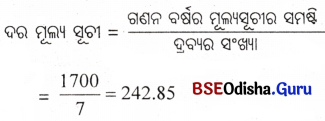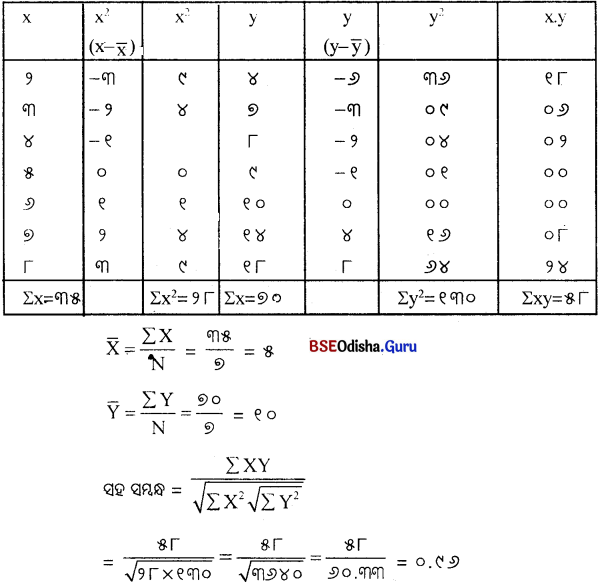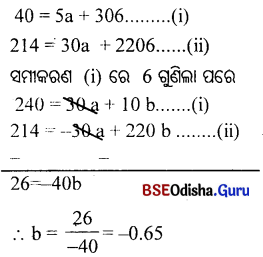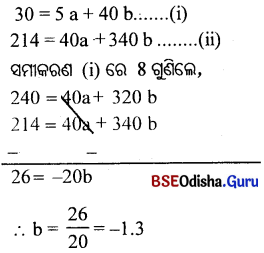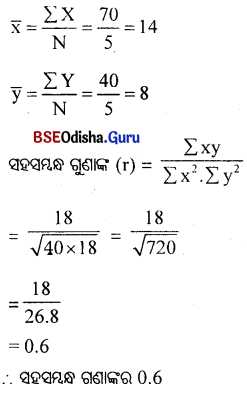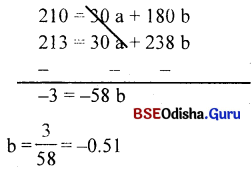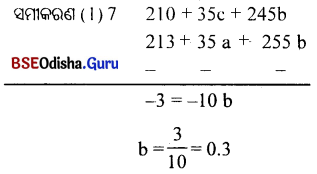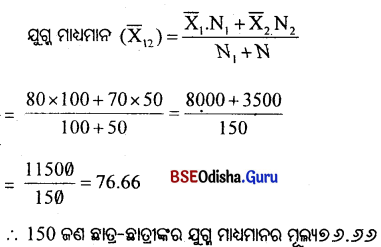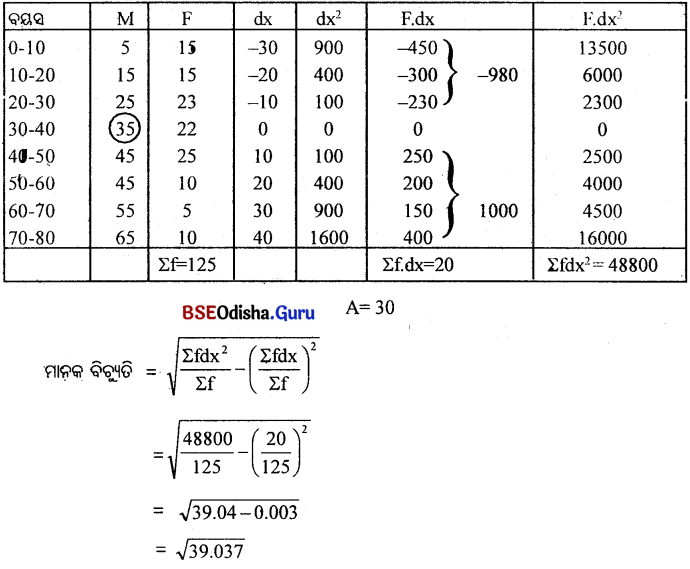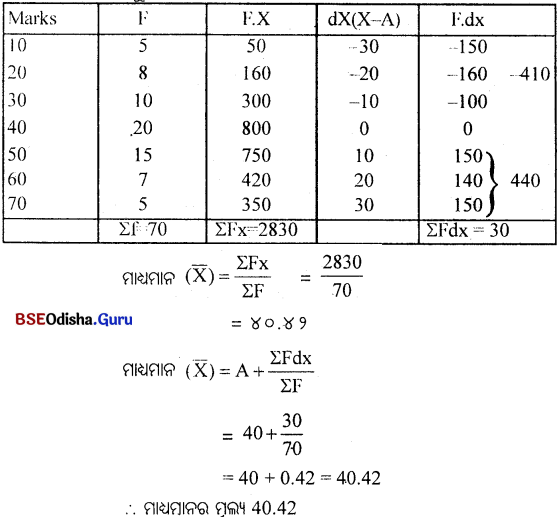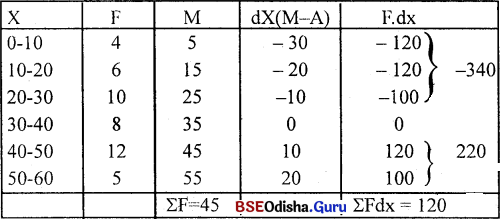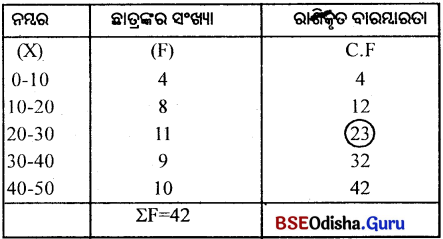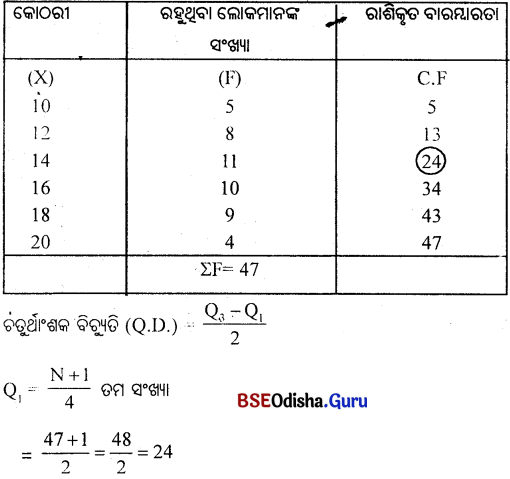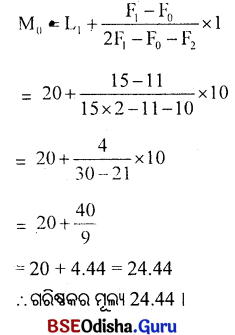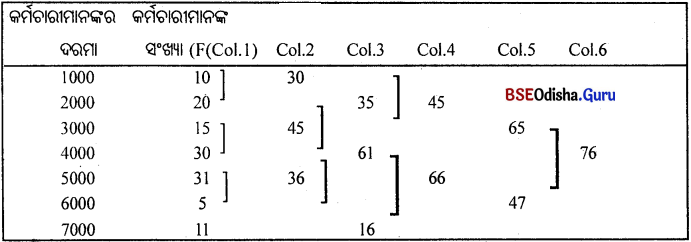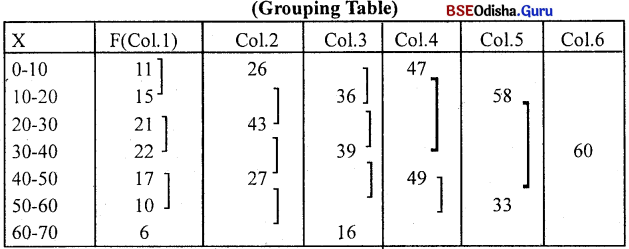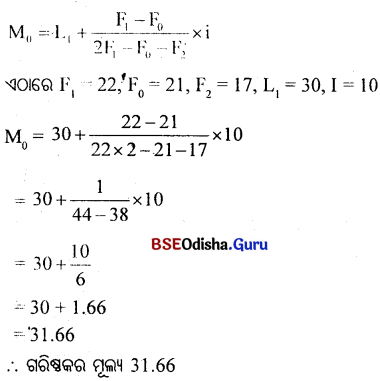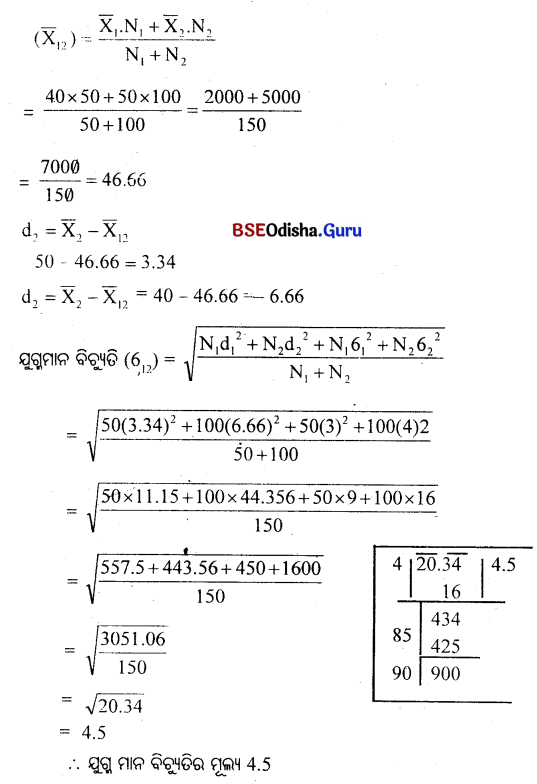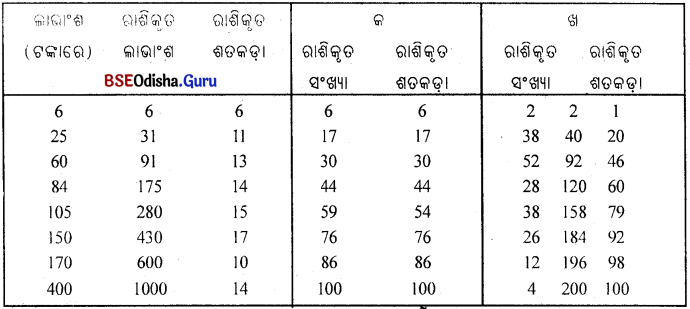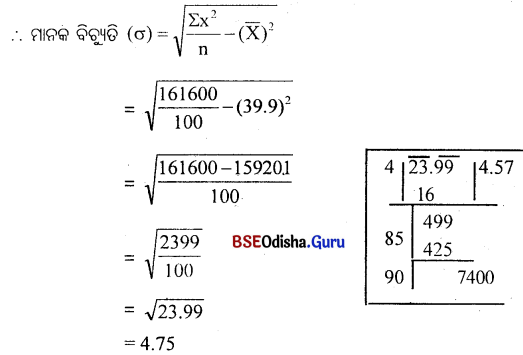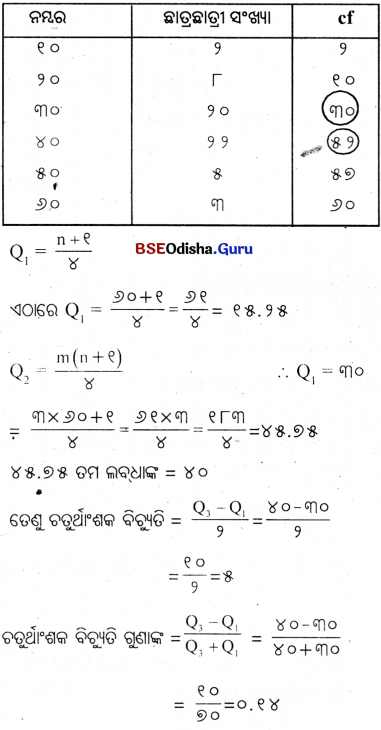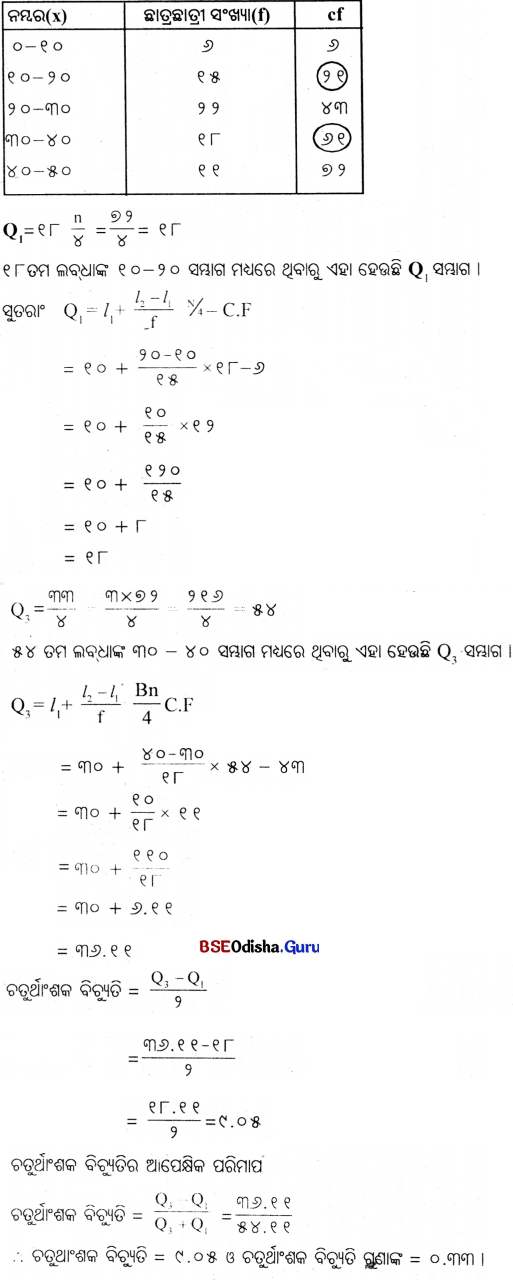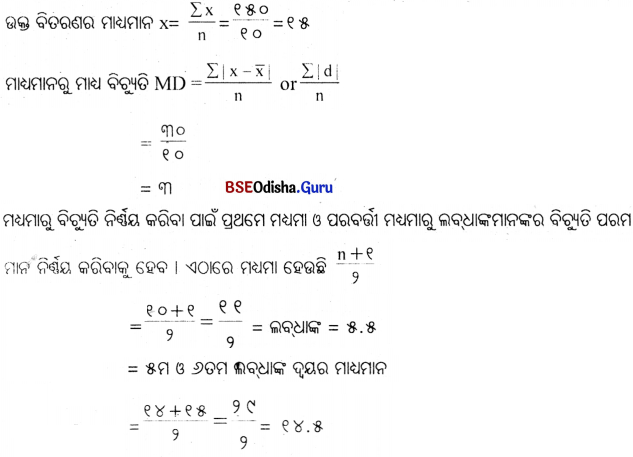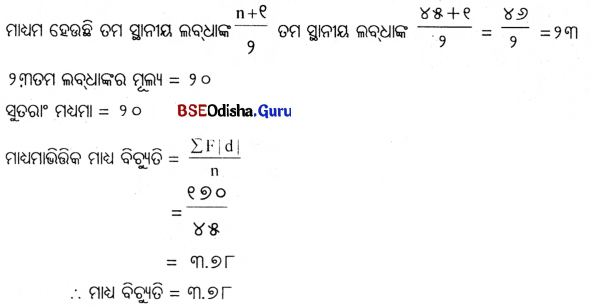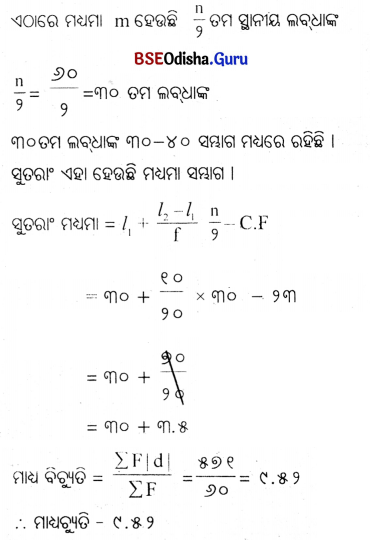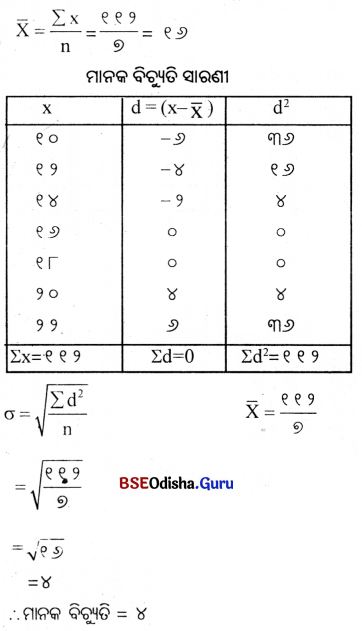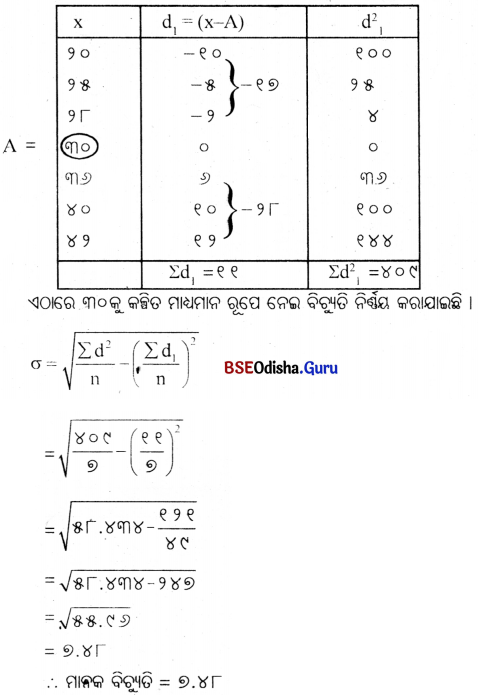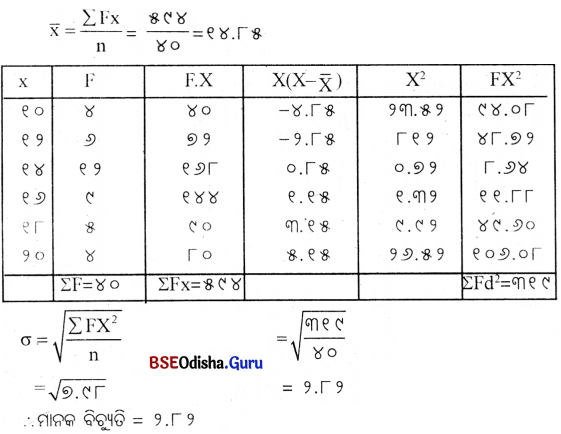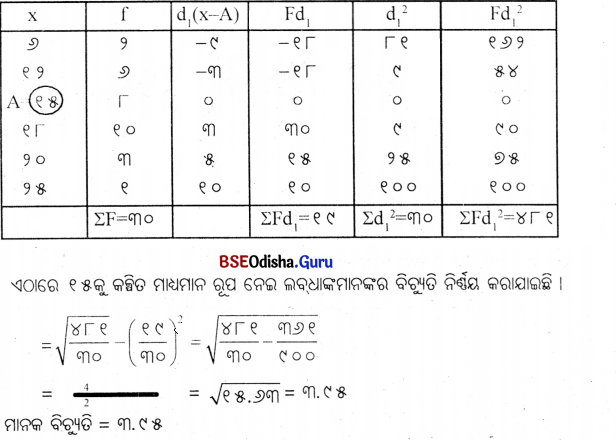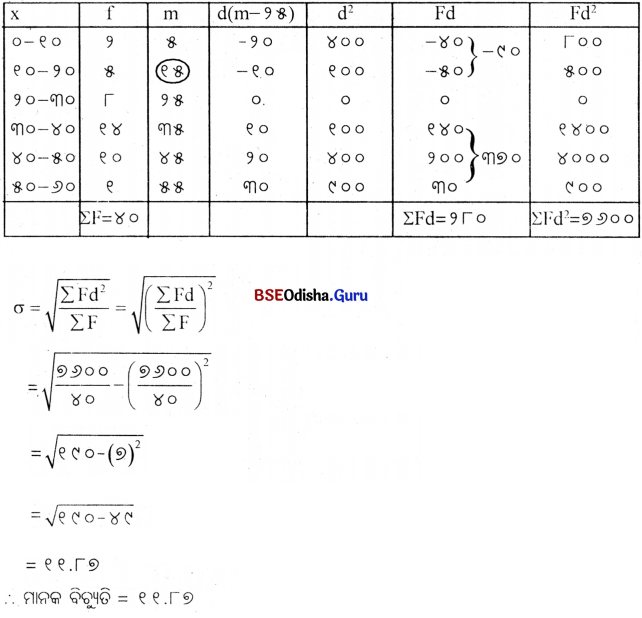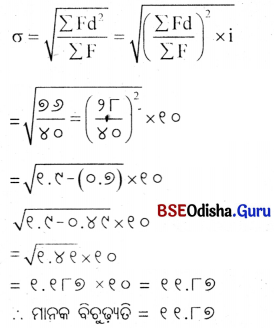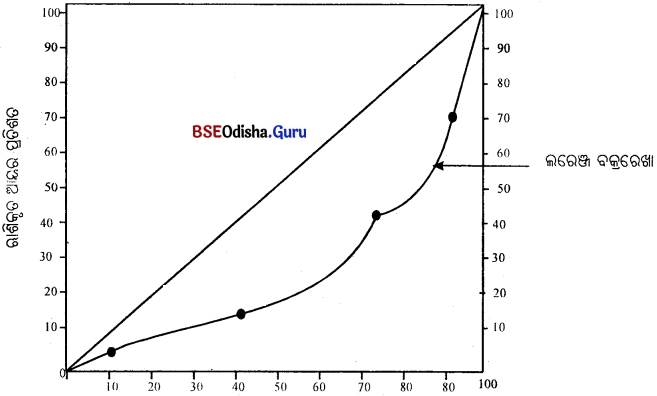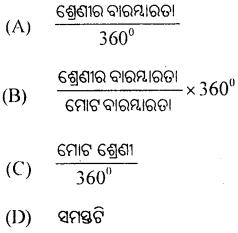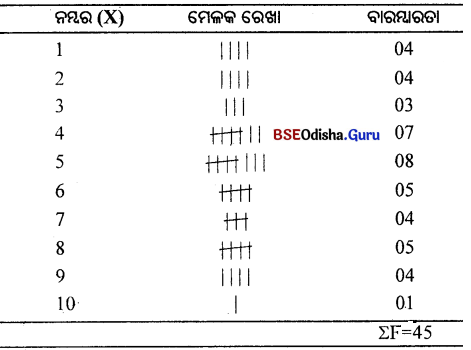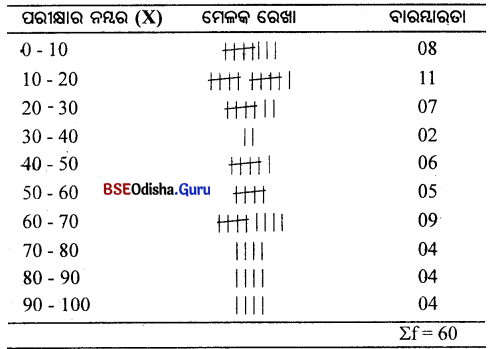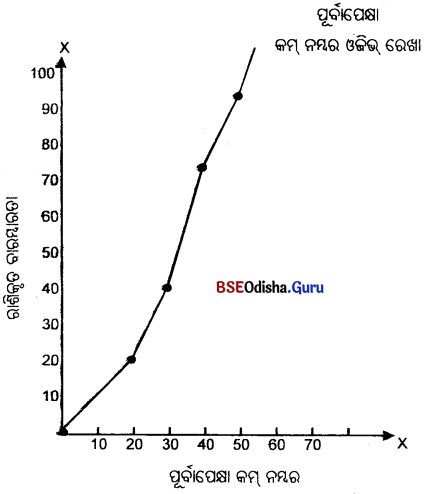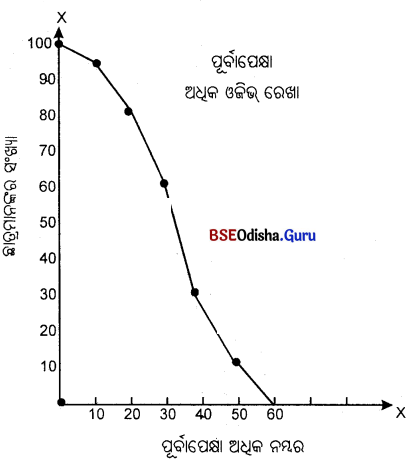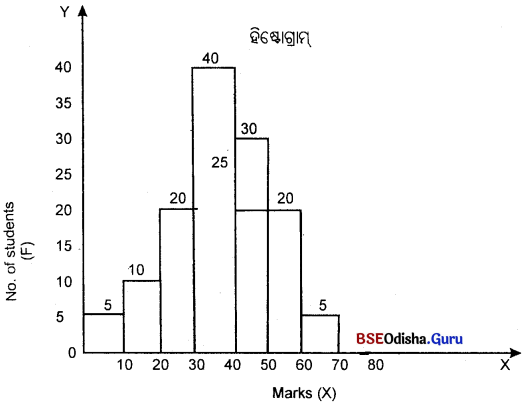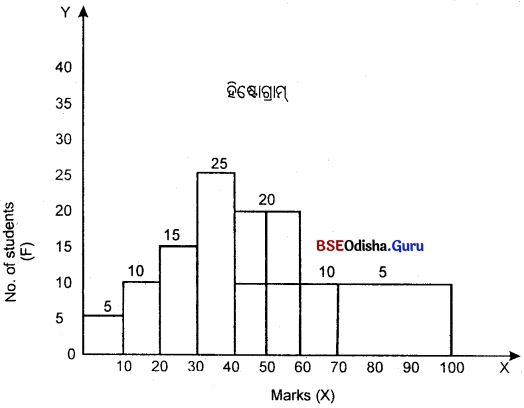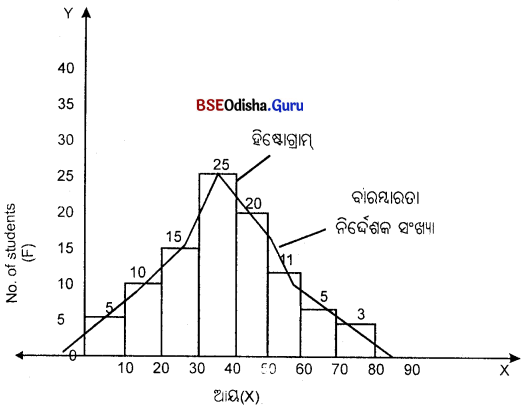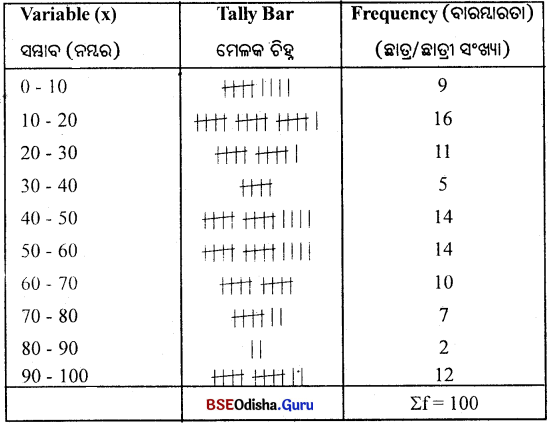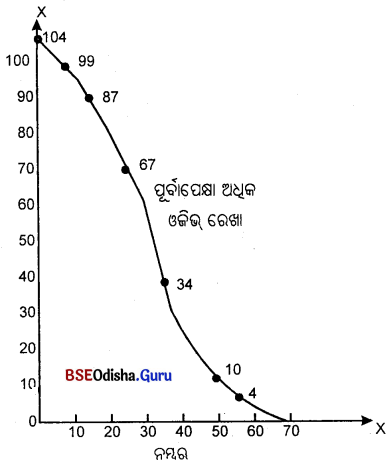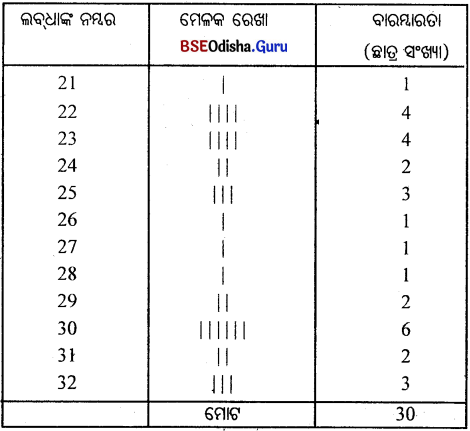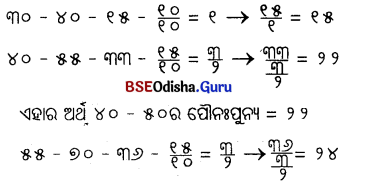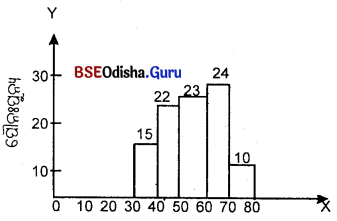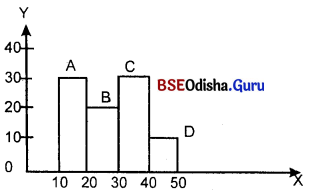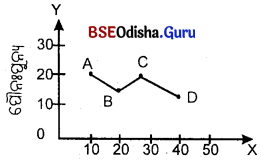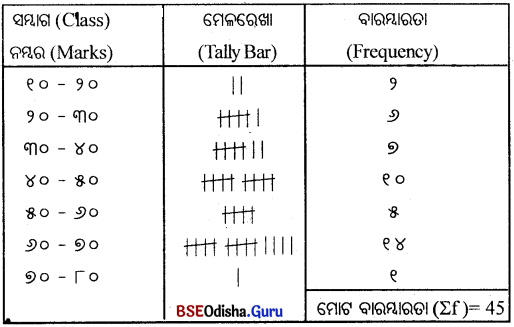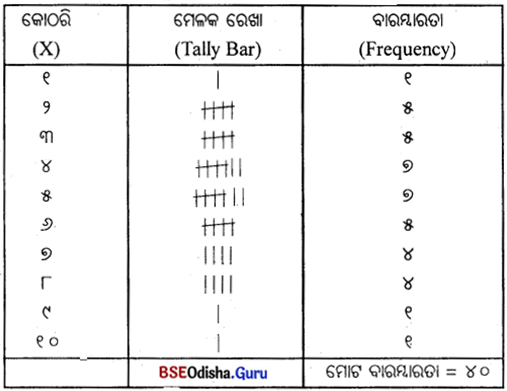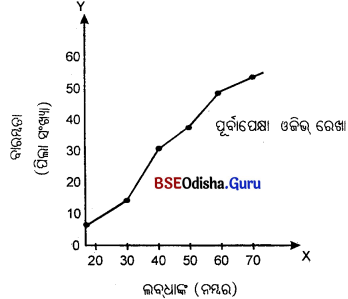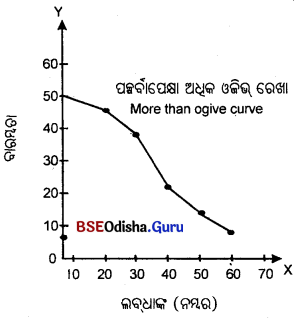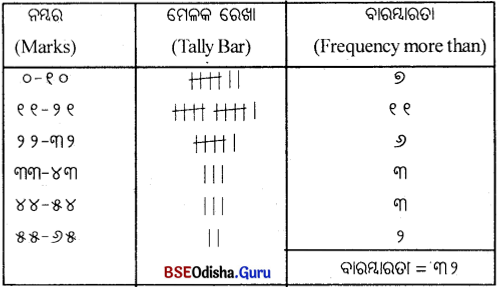Odisha State Board CHSE Odisha Class 11 Sociology Solutions Unit 2 ମୌଳିକ ଧାରଣା Questions and Answers.
CHSE Odisha 11th Class Sociology Unit 2 Question Answer ସମାଜ ମୌଳିକ ଧାରଣା
‘କ’ ବିଭାଗ
ଅତି ସଂକ୍ଷିପ୍ତ ପ୍ରଶ୍ନୋତ୍ତର
ସମ୍ଭାବ୍ୟ ବିକଳ୍ପ ମଧ୍ୟରୁ ଉତ୍ତର ଚୟନ କର :
Question ୧।
ସମାଜ କେଉଁ ଶବ୍ଦରୁ ଆସିଅଛି ?
(i) ୟୁନିଟ୍
(ii) ଲାଟିନ୍
(iii) ଜର୍ମାନ
(iv) ଫ୍ରାନସ୍
Answer:
(ii) ଲାଟିନ୍
Question ୨।.
ସମାଜ କାହାକୁ ନେଇ ଗଠିତ ?
(i) ବ୍ଯକ୍ତି
(ii) ସମୂହ
(iii) ସାମାଜିକ ସମ୍ପର୍କ
(iv) ଏ ସମସ୍ତ
Answer:
(iii) ସାମାଜିକ ସମ୍ପର୍କ
Question ୩।
ମଣିଷ ଏକ ସାମାଜିକ ପ୍ରାଣୀ ଏ ଉକ୍ତିଟି କିଏ କରିଥିଲେ ?
(i) ମାର୍କସ୍ବର
(ii) ମାକ୍ଆଇଭରଓପେଜ୍
(iii) ଅରିଷ୍ଟୋଟଲ
(iv) ଏ ସମସ୍ତ
Answer:
(iii) ଅରିଷ୍ଟୋଟଲ
Question ୪।
ସମାଜ ସାମାଜିକ ସମ୍ପର୍କର ସମଷ୍ଟି ଅଟେ କିଏ କହିଅଛନ୍ତି।
(i) ସି. ଏଚ୍. କୁଲେ
(ii) ଉରର୍ବଟ ସ୍ପେନସର
(iii) ମାକାଇଭର
(iv) ଏ ସମସ୍ତ
Answer:
(iii) ମକାଇଭର
Question ୫।
ସମାଜର ନିଜର ଏକ ମନ ଅଛି କିଏ କହିଅଛନ୍ତି ?
(i) ଲକ୍
(ii) ରୁଷୋ
(iii) ଇରଲିଆମ ମ୍ୟାକ୍ଟୋରଲା
(iv) ଏ ସମସ୍ତ
Answer:
(i) ଲକ୍

Question ୬।
କ୍ଲାସପର ହାଉସର କେଉଁ ଦେଶର ବାଳକ ଥିଲେ ?
(i) ଜର୍ମାନ
(ii) ଜର୍ମାନ
(iii) ଆମେରିକା
(iv) ଫ୍ରାନସ୍
Answer:
(ii) ଜର୍ମାନ
Question ୭।
ମନୁଷ୍ୟ ଜନ୍ମରୁ ମାନବ ହୋଇ ନଥାଏ କିନ୍ତୁ ମାନବ କରାଯାଇଥାଏ କିଏ କହିଛନ୍ତି ?
(i) ଇଂଲଣ୍ଡ
(ii) ମାକାଇଭର
(iii) ରବର୍ଟ ପାଇଁ
(iv) ଏ ସମସ୍ତ
Answer:
(ii) ମାକାଇଭର
Question ୮।
ନିମ୍ନୋକ୍ତ ମଧ୍ୟରୁ କେଉଁଟିକୁ ନେଇ ସମୁଦାୟ ଗଠିତ ?
(i) ବ୍ୟକ୍ତିର ଚିନ୍ତାଧାର
(ii) ସାମୁଦାୟିକ ମନୋଭାବ
(iii) ନିର୍ଦ୍ଦିଷ୍ଟ ବ୍ୟକ୍ତି
(iv) ଏ ସମସ୍ତ
Answer:
(ii) ସାମୁଦାୟିକ ମନୋଭାବ
Question ୯।
ସମୁଦାୟ କେଉଁ ଭାଷାରୁ ଆସିଅଛି।
(i) ଜର୍ମାନୀ
(ii) ଫରାସ
(iii) ଲାଟିନ୍
(iv) ଗ୍ରୀକ୍
Answer:
(i) ଜର୍ମାନୀ
Question ୧୦।
ନିମ୍ନୋକ୍ତ ମଧ୍ୟରୁ କେଉଁଟି ସମୁଦାୟର ଅନ୍ତର୍ଭୁକ୍ତ ?
(i) ଗ୍ରାମ
(ii) ସ୍କୁଲ
(iii) ପରିବାର
(iv) ଏ ସମସ୍ତ
Answer:
(i) ଗ୍ରାମ
Question ୧୧।
ସମୁଦାୟ ବ୍ୟକ୍ତିମାନଙ୍କର କେଉଁ ଆବଶ୍ୟକତା ପୂରଣ କରିଥାଏ ?
(i) ସାଧାରଣ ଆବଶ୍ୟକତା
(ii) ଅର୍ଥନୈତିକ ଆବଶ୍ୟକତା
(iii) ବ୍ୟକ୍ତିଗତ ଆବଶ୍ୟକତା
(iv) ଏ ସମସ୍ତ
Answer:
(i) ସାଧାରଣ ଆବଶ୍ୟକତା
Question ୧୨।
ସାମୁଦାୟିକ ମନୋଭାବ ବ୍ୟକ୍ତିମାନଙ୍କର କେଉଁ ସ୍ତର ଅଟେ ?
(i) ବ୍ୟବସାୟିକ
(ii) ମାନସିକ
(iii) ଶରୀରିକ
(iv) ଏ ସମସ୍ତ
Answer:
(ii) ମାନସିକ
Question ୧୩।
ଏକ ବା ଏକାଧ୍ଵକ ସାମ୍ବହିକ ସାଧନ ପାଇଁ ଇଚ୍ଛାକୃତ ଭାବରେ ଗଠନ ହୋଇଥିବା ଏକ ସଙ୍ଗଠନକୁ କୁହାଯାଏ
(i) ସମାଜ
(ii) ସମୁଦାୟ
(iii) ସଙ୍ଗ
(iv) ଏ ସମସ୍ତ
Answer:
(iii) ସଂଘ
Question ୧୪।
ଶ୍ରମିକ ସଙ୍ଗ ଅଟେ।
(i) ଏକ ରାଜନୈତିକ ସଂଘ
(ii) ଏକ ବ୍ୟବସାୟିକ ସଙ୍ଗ
(iii) ଏକ ଧର୍ମୀୟ ସଂଘ
(iv) ଏ ସମସ୍ତ
Answer:
(i) ଏକ ରାଜନୈତିକ ସଂଘ
Question ୧୫।
ସଂଘ କେତେକ ମୌଳିକ ଉପାଦାନକୁ ନେଇ ଗଠିତ ଯଥା :
(i) ଦଳେ ବ୍ୟକ୍ତି ସଂଘଠିତ ନୀତିନିୟମ ଓ ନିର୍ଦ୍ଦିଷ୍ଟ ଉଦ୍ଦେଶ୍ୟ
(ii) ଦଳେ ବ୍ୟକ୍ତି ରାଜନୈତିକ ଉଦ୍ଦେଶ୍ୟ ଓ ଚିନ୍ତାଧାରା
(iii) ଏକ ବ୍ୟକ୍ତି ବ୍ୟକ୍ତିଗତ ଜୀବନ ପ୍ରଣାଳୀ ଓ ମୁଁ ଭାବନା
(iv) ଏ ସମସ୍ତ
Answer:
(i) ଦଳେ ବ୍ୟକ୍ତି ସଂଘଠିତ ନୀତିନିୟମ ଓ ନିର୍ଦ୍ଦିଷ୍ଟ ଉଦ୍ଦେଶ୍ୟ

Question ୧୬।
ସଂଘର ସଦସ୍ୟ
(i) ବାଧ୍ୟତାମୂଳକ
(ii) ଇଚ୍ଛାକୃତ
(iii) ଜଳଗତ
(iv) ଏ ସମସ୍ତ
Answer:
(ii) ଇଚ୍ଛାକୃତ
Question ୧୭।
ସଂଘର ସ୍ଥାୟୀତ୍ବ
(i) କ୍ଷଣସ୍ଥାୟୀ
(ii) ଦୀର୍ଘସାୟୀ
(iv) ଉଭୟ କ୍ଷଣସ୍ଥାୟୀ ଦୀର୍ଘସ୍ଥାୟୀ
(iii) ଅସ୍ଥାୟୀ
Answer:
(iv) ଉଭୟ କ୍ଷଣସ୍ଥାୟୀ ଦୀର୍ଘସ୍ଥାୟୀ
Question ୧୮।
ନିମ୍ନୋକ୍ତ ମଧ୍ୟରୁ କେଉଁଟି ଅନୁଷ୍ଠାନ ଅଟେ ?
(i) ପରିବାର
(ii) ରାଷ୍ଟ୍ର
(iii) ପରିବାର ଓ ରାଷ୍ଟ୍ର
(iv) ସମାଜ
Answer:
(iii) ପରିବାର ଓ ରାଷ୍ଟ୍ର
Question ୧୯।
ନିମ୍ନୋକ୍ତ ମଧ୍ୟରୁ କେଉଁଟି ଅନୁଷ୍ଠାନ ନୁହେଁ ?
(i) ବିବାହ
(ii) ଥାଏଟର
(iii) ସମ୍ପରି
(iv) ଏ ସମସ୍ତ
Answer:
(ii) ଥୁଏଟର
Question ୨୦।
ନିମ୍ନୋକ୍ତ ମଧ୍ଯରୁ ଅନୁଷ୍ଠାନ କାହାକୁ କୁହାଯାଏ ?
(i) ନୀତି ଓ ନିୟମ
(ii) କାର୍ଯ୍ୟକଳା
(iii) ବ୍ୟବହାର
(iv) ପରିବର୍ତ୍ତନ
Answer:
(i) ନୀତି ଓ ନିୟମ
Question ୨୧।
ରାଜନୀତିକ ଅନୁଷ୍ଠାନର ଲକ୍ଷ୍ୟ ବା ଉଦ୍ଦେଶ୍ୟ କ’ଣ ?
(i) ଆଇନ୍ ଓ ସମନ୍ଵୟ ରକ୍ଷା କରିବା
(ii) ବ୍ୟକ୍ତିର ଉତ୍ତମ ସେବା ବା କାର୍ଯ୍ୟକରିବା
(iii) ଅନ୍ୟର ପ୍ରତିରୋଧ କରିବା
(iv) ଉଭୟ ମୌଖକ ଓ ଲିଖତ ନିୟମରେ
Answer:
(i) ଆଇନ୍ ଓ ସମନ୍ଵୟ ରକ୍ଷା କରିବା
Question ୨୨।
ଅନୁଷ୍ଠାନର ସୁପରିଚାଳନା ନିର୍ଭର କରେ।
(i) ନିର୍ଦ୍ଦିଷ୍ଟ ମୌଖ୍ୟକ ନିୟମରେ
(ii) ନିର୍ଦ୍ଦିଷ୍ଟ ଲିଖୁତ ନିୟମରେ
(iii) କାର୍ଯ୍ୟକଳାପରେ
(iv) ଉଭୟ ମୌଖୁକ ଓ ଲିଖତ ନିୟମରେ
Answer:
(iv) ଉଭୟ ମୌଖୁକ ଓ ଲିଖତ ନିୟମରେ
Question ୨୩।
ଅନ୍ତଃ ସମୂହର ସଦସ୍ୟମାନଙ୍କର ମଧ୍ୟରେ ଥାଏ–
(i) ଆମ–ଭାବନା
(ii) ତୁମ-ଭାବନା
(iii) ସେମାନେ ଭାବନା
(iv) ଏ ସମସ୍ତ
Answer:
(i) ଆମ-ଭାବନା
Question ୨୪।
ବ୍ୟକ୍ତି ଯେଉଁ ସମୂହରେ ନିଜକୁ ଅନ୍ତର୍ଭୁକ୍ତ କରିଥାଏ ତାହା କେଉଁ ସମୂହ ?
(i) ଗୌଣ ସମୂହ
(ii) ଅନ୍ତଃ-ସମୂହ
(iii) ସାମାଜିକ ସମୂହ
(iv) ଏ ସମସ୍ତ
Answer:
(iii) ସାମାଜିକ ସମୂହ
Question ୨୫।
ସଂସ୍କୃତି ଶବ୍ଦର ପ୍ରଚଳନ କାହା ଦ୍ଵାରା କରାଯାଇଥିଲା ?
(i) ଇ.ବି ଟେଲର
(ii) ଅଗଷ୍ଟ
(iii) ସ୍କୁଲ
(iv) ଏ ସମସ୍ତ
Answer:
(i) ଇ.ବି ଟେଲର

Question ୨୬।
ସଂସ୍କୃତି ଲାଟିନ ଶବ୍ଦ କୋଲେର (Colore) ହୋଇ ଅର୍ଥ କ’ଣ ?
(i) ସଂସ୍କୃତିକ ସମ୍ପନ୍ନ ହେବା
(ii) ଶସ୍ୟହରାଜନ୍
(iii) ବୌଦ୍ଧିକ ଅନୁଭୂତି
(iv) ଏ ସମସ୍ତ
Answer:
(i) ସଂସ୍କୃତିକ ସମ୍ପନ୍ନ ହେବା
Question ୨୭।
ସଂସ୍କୃତି ହେଉଛି ମଣିଷର ହସ୍ତକର୍ମ ଏବଂ ମାଧ୍ଯମ ଯାହାଦ୍ବାରା ସେ ତା’ର ଲକ୍ଷ୍ୟ ହାସଲ କରିପାରେ– ଏ ଉକ୍ତି କିଏ ପ୍ରଦାନ କରିଅଛନ୍ତି।
(i) ମାକ୍ଆଇଭର ଏବଂ ପେଜ୍
(ii) ସଦରଲ୍ୟାଣ୍ଡ ଏବଂ ଉଡ଼ୱାର୍ଡ
(iii) ବି. ମାଲିନୋସ୍କ
(iv) ଏ ସମସ୍ତ
Answer:
(iii) ବି. ମାଲିନୋସ୍କ
Question ୨୮।
ସମାଜ ବା (ସୋସାଇଟି) ଇଂରାଜୀ ଶବ୍ଦଟି କେଉଁ ଶବ୍ଦରୁ ଆସିଅଛି ?
(i) ଲୋଗସ୍
(ii) ସୋସିଅସ୍
(iii) ଫାମୁଲସ
(iv) ଏ ସମସ୍ତ
Answer:
(ii) ସୋସିଅସ୍
Question ୨୯।
କିଏ କହିଛନ୍ତି, “ ମଣିଷ ମାନବ ହୋଇ ଜନ୍ମଗ୍ରହଣ କରି ନ ଥାଏ; କିନ୍ତୁ ମାନବ ହେବାକୁ ଜନ୍ମ ନେଇଥାଏ ।”
(i) ଅଗଷ୍ଟ କମଟେ
(ii) ପାର୍କ
(iii) ସି. ଏଚ କୁଲେ
(iv) ଏ ସମସ୍ତ
Answer:
(ii) ପାର୍କ
Question ୩୦।
କିଏ ମଣିଷକୁ ସମାଜର ସ୍ରଷ୍ଟା ଭାବରେ ବିଚାର କରନ୍ତି
(i) ଗିବସବର୍ଗ
(ii) କଲେ
(iii) ସ୍କନସର
(iv) ପାର୍କ
Answer:
(i) ଗିବସବର୍ଗ
Question ୩୧।
ଏକ ନିଦ୍ଧିଷ୍ଟ ଭୌଗୋଳିକ ଅଞ୍ଚଳ ମଧ୍ୟରେ ସ୍ଥାୟୀ ଭାବରେ ବସବାସ କରୁଥିବା ଏବଂ ଆମ ଭାବନା ଥୁବା ବଚନ ବ୍ୟକ୍ତିକୁ କ’ଣ କୁହାଯାଏ ?
(i) ସଂଘ
(ii) ଆନୁଷ୍ଠାନ
(iii) ସମୁଦାୟ
(iv) ଏ ସମସ୍ତ
Answer:
(iii) ସମୁଦାୟ
Question ୩୨।
କାହା ମତରେ ଏକ ସୀମିତ ଅଞ୍ଚଳରେ ଥିବା ସାମାଜିକ ଜୀବନର ସମ୍ପୂର୍ଣ୍ଣ ସଂଘଠନକୁ ସମୁଦାୟ କୁହାଯାଏ ?
(i) ବୋଗାର୍ଡସ
(ii) ସି. ଏଚ. କୁଲେ
(iii) ଅଗକରୁ ଏବଂ ନିମ୍ନନୋଫ
(iv) ଏ ସମସ୍ତ
Answer:
(i) ବୋଗାର୍ଡସ
Question ୩୩।
ଏକ ନିଦ୍ଧିଷ୍ଟ ଭୌଗୋଳିକ ଅଞ୍ଚଳ ଏହା ସମାଜର କ’ଣ ?
(i) ଗୁଣ
(ii) ପ୍ରକାର୍ଯ୍ୟ
(iii) ଅପକାର୍ଯ୍ୟ
(iv) କେଉଁଠି ନୁହେଁ
Answer:
(i) ଗୁଣ
Question ୩୪।
କାହା ମତରେ “ଏକ ବା ଏକାଧ୍ଵକ ସାମ୍ବାହିକ ସ୍ବାର୍ଥ ସାଧନ ପାଇଁ ଇଚ୍ଛାକୃତ ଭାବେ ଗଠନ ହୋଇଥିବା ଏକ ସଂଘଠନକୁ ସଂଘ କୁହାଯାଏ”?
(i) ମାକ୍ଆଇଭର
(ii) ସି. ଏଚ୍ କୁଲେ
(iii) ଶିନ୍ସବର୍ଗ
(iv) ଏ ସମସ୍ତ
Answer:
(i) ମାକ୍ଆଇଭର

Question ୩୫।
ଦଳେ ବ୍ୟକ୍ତି ନିମ୍ନୋକ୍ତ ମଧ୍ୟରୁ କାହାର ଲକ୍ଷ୍ୟ ?
(i) ଅନୁଷ୍ଠାନ
(ii) ସଂଘ
(iii) ସମୁଦାୟ
(iv) ସଂସ୍କୃତି
Answer:
(ii) ସଂଘ
Question ୩୬।
ପରସ୍ପର ସହ ଜଡ଼ିତ ଥିବା ଲୋକନୀତି ଲୋକନିୟମ ଓ ଆଇନ୍ମାନଙ୍କର ସମ୍ମୋଳନକୁ ଅନୁଷ୍ଠାନ କୁହାଯାଏ ।
ଏହା କାହାରବାର୍ତ୍ତା
(i) ଏକ ଡେଭିସ୍
(ii) କୁଳେ
(iii) ଜନସବର୍ଗ
(iv) କେଉଁ ନୁହେଁ
Answer:
(i) ଏକ ଡେଭିସ୍
Question ୩୭।
କାହା ମତରେ “ପରସ୍ପର ମଧ୍ୟରେ ସାମାଜିକ ସମ୍ପର୍କ ରହିଥିବା କେତେକ ବ୍ୟକ୍ତିଙ୍କର ସମ୍ପର୍କକୁ ସାମାଜିକ ସମୂହ କୁହାଯାଏ ।”
(i) ସ୍ଟେନସର
(ii) ଗିଡ଼ିନସ୍
(iii) ମାକ୍ଆଇଭର
(iv) କେଉଁଠିନୁହେଁ
Answer:
(ii) ଗିଡ଼ିନସ୍
Question ୩୮।
ସାମାଜିକ ସଙ୍ଗଠନ ପୁସ୍ତକ କେବେ ରଚିତ ହୋଇଥିଲା ?
(i) ୧୮୩୯
(ii) ୧୭୫୬
(iii) ୧୯୦୯
(iv) ୧୯୦୮
Answer:
(iii) ୧୯୦୯
Question ୩୯।
ସାମାଜିକ ସଙ୍ଗଠନ ନାମକ ପୁସ୍ତକ କାହା ଦ୍ଵାରା ରଚିତ ହୋଇଥିଲା ?
(i) ସି. ଏଚ୍ କୁଲେ
(ii) କମଟେ
(iii) ସ୍କଲ୍
(iv) କେଉଁଠି ନୁହେଁ
Answer:
(i) ସି. ଏଚ୍ କୁଲେ
Question ୪୦।
ଲୋକମାନଙ୍କର ଆମ ମନୋଭାବନା ତଥା ପରସ୍ପରକୁ ସାହାର୍ଯ୍ୟ କରିବା ସୁଖ ଦୁଃଖରେ ଭାଗି ହେବାକୁ କ’ଣ କୁହାଯାଏ ?
(i) ସାମୁଦାୟିକ ମନୋଭାବନା
(ii) ମନୋଭାବ
(iii) ଅନୁଷ୍ଠାନ ଭାବ
(iv) ଏ ସମସ୍ତ
Answer:
(i) ସାମୁଦାୟିକ ମନୋଭାବନା
Question ୪୧।
ଯେତେବେଳେ କେତେକ ଲୋକ ଏକ ସାଧାରଣ ସ୍ଵାର୍ଥ ହାସଲ କରିବା ପାଇଁ ଏକାଠି ହୁଅନ୍ତି ତାଙ୍କୁ କ’ଣ କୁହାଯାଏ?
(i) ସଂଘ
(ii) ଅନୁଷ୍ଠାନ
(iii) ସମ୍ପ୍ରଦାୟ
(iv) କେଉଁଠି ନୁହେଁ
Answer:
(i) ସଂଘ
Question ୪୨।
କ’ଣ ଚିରସ୍ଥାୟୀ କିମ୍ବା କ୍ଷଣସ୍ଥାୟୀ ହୋଇପାରେ ?
(i) ସଂଘ
(ii) ଅନୁଷ୍ଠାନ
(iii) ସମୁଦାୟ
(iv) ସମାଜ
Answer:
(i) ସଂଘ
Question ୪୩।
ନିର୍ଦ୍ଦିଷ୍ଟ କାର୍ଯ୍ୟରୀତି କେଉଁ ପ୍ରକାର କାର୍ଯ୍ୟ ?
(i) ସଂଘ
(ii) ଅନୁଷ୍ଠାନ
(iii) ସମୁଦାୟ
(iv) ସମାଜ
Answer:
(ii) ଅନୁଷ୍ଠାନ
Question ୪୪।
ପ୍ରତ୍ୟେକ ସଂଘ କେତେକ ସ୍ବୀକୃତି ପ୍ରାଣ ଏବଂ ପ୍ରତିବିତ ନୀତି, ନିୟମ, ପ୍ରଥା, ପରମ୍ପରା ଉପରେ ପ୍ରତିଷ୍ଠିତ ଏହି ନୀତିନିୟମ ଓ ରୀତିନୀତିର ସମଷ୍ଟିକୁ କ’ଣ କୁହାଯାଏ ?
(i) ସଂଘ
(ii) ଅନୁଷ୍ଠାନ
(iii) ସମୁଦାୟ
(iv) ସମାଜ
Answer:
(ii) ଅନୁଷ୍ଠାନ

Question ୪୫।
କାହା ମତରେ “ ଅନୁଷ୍ଠାନ ହେଉଛି କେତେଗୁଡ଼ିଏ ଲୋକନୀତି ଏବଂ ଲୋକନୟମର ସମର୍ଥ ଯାହାଙ୍କ ଅନେକଗୁଡ଼ିଏ ସାମାଜିକ କାର୍ଯ୍ୟ ସମ୍ପାଦନ କରିଥାଏ । ”
(i) ମାର୍କାଇଭର
(ii) ଏ. ଡବୁର ଗ୍ରୀନ
(iii) କଲେ
(iv) ସ୍ବଲ
Answer:
(ii) ଏ. ଡକ୍ଟର ଗ୍ରୀନ
Question ୪୬।
କେଉଁ ସମାଜବିଜ୍ଞାନୀ ସମାଜବିଜ୍ଞାନକୁ ସାମାଜିକ ସମୂହ ବିଜ୍ଞାନ ବୋଲି ଆଖ୍ୟା ଦେଇଥିଲେ ?
(i) ସି. ଏଚ କଲେ
(ii) ଏଚ ଏମ ଜନସନ
(iii) ଗିନିସ୍ବର୍ଗ
(iv) ଏ ସମସ୍ତ
Answer:
(i) ସି. ଏଚ କୁଲ
Question ୪୭।
କାହା ମତରେ “ଯେତେବେଳେ ଦୁଇ ବା ତତୋଧ୍ଵକ ବ୍ୟକ୍ତି ଏକତ୍ରିତ ହୁଅନ୍ତି ଏବଂ ପରସ୍ପରକୁ ପ୍ରଭାବିତ କରନ୍ତି ଯେତେବେଳେ ସେମାନେ ଏକ ସାମାଜିକ ସମୂହ ଗଠନ କରିଥାନ୍ତି ।”
(i) ଅଗବର୍ଣ୍ଣ
(ii) ସି. ଏଚ କୁଲେ
(iii) ମାଇଭର
(iv) ଏ ସମସ୍ତ
Answer:
(iv) ଏ ସମସ୍ତ
Question ୪୮।
ପରସ୍ପର ମଧ୍ୟରେ ସାମାଜିକ ସମ୍ପର୍କ ରହିଥିବା କେତେକ ବ୍ୟକ୍ତିଙ୍କର ସମ୍ପର୍କକୁ କ’ଣ କୁହାଯାଏ ?
(i) ପ୍ରାଥମିକ ସମୂହ
(ii) ଅନ୍ତଃ ସମୂହ
(iii) ସାମାଜିକ ସମୂହ
(iv) କେଉଁଠି ନୁହେଁ
Answer:
(iii) ସାମାଜିକ ସମୂହ
Question ୪୯।
ଏକତା ମନୋଭାବ କେଉଁ ସମୂହର ଗୁଣ ?
(i) ଗୌଣ ସମୂହ
(ii) ବହିଃ ସମୂହ
(iii) ସାମାଜିକ ସମୂହ
(iv) କେଉଁଠି ନୁହେଁ
Answer:
(iii) ସାମାଜିକ ସମୂହ
Question ୫୦।
ମନୁଷ୍ୟ ତା’ର ବ୍ୟକ୍ତିଗତ ଓ ସାମାଜିକ ଜୀବନର ମାନସିକ କ୍ଷେତ୍ରରେ ଯାହା ଅର୍ଜନ କରେ ତାକୁ କ’ଣ କୁହାଯାଏ ?
(i) ସଂଘ
(ii) ସଂସ୍କୃତି
(iii) ଅନୁଷ୍ଠାନ
(iv) ସମାଜ
Answer:
(ii) ସଂସ୍କୃତି

Question ୫୧।
କାହା ମତରେ “ ଆମ୍ଭମାନଙ୍କର ଜୀବନଯାପନ ପ୍ରଣାଳୀ ଚିନ୍ତାଧାରା ମିଳାମିଶା, ସାହିତ୍ୟ, ଧର୍ମ, ପରିଷ୍କାର ହେଉଥୁବା ଆମ୍ଭମାନଙ୍କର ପ୍ରକୃତିର ପରିପ୍ରକାଶକୁ ସଂସ୍କୃତି କୁହାଯାଏ ।”
(i) ମାକ୍ଆଇଭର .
(ii) ସି. ଏଚ. କୁଲେ
(iii) ସିଓର କଲେ
(iv) ସ୍ବଲ
Answer:
(i) ମାକ୍ଆଇଭର .
Question ୫୨।
ଆଦର୍ଶବାଦୀ କାହାର ଗୁଣ ଅଟେ ?
(i) ସଂଘ
(ii) ସରୋକଳ
(iii) ସମୂହ
(iv) ସ୍କୁଲ
Answer:
(ii) ସଂସ୍କୃତି
Question ୫୩।
ଇ. ବି. ଟେଲର କେଉଁଥରେ ପ୍ରସିଦ୍ଧି ଲାଭ କରିଥିଲେ ?
(i) ରାଜନୀତି
(ii) ନୃତତ୍ତ୍ଵ
(iii)ସମାସବିଜ୍ଞାନ
(iv) ଇତିହାସ
Answer:
(ii) ନୃତତ୍ତ୍ଵ
Question ୫୪।
କିଏ କହିଥିଲେ ସଂସ୍କୃତିର ଦୁଇଟି ଅଙ୍ଗ ଅଛି ?
Answer:
(i) ମାକ୍ଆଇଭର
(ii) ଅଗବର୍ଣ୍ଣ
(iii) ସିରେ କୁଲେ
(iv) ସ୍ପଳ
Question ୫୫।
କେଉଁ ସଂସ୍କୃତି ଅପେକ୍ଷାକୃତ କମ୍ ଗତିଶୀଳ ?
(i) ଭୌତିକ
(ii) ଅଭୌତିକ
(iv) କେଉଁଠି ନୁହେଁ
(iii) ଉଭୟ ଭୌତିକ ଓ ଅଭୌତିକ
Answer:
(ii) ଅଭୌତିକ
Question ୫୬।
ନିମ୍ନୋକ୍ତ ମଧ୍ୟରୁ କେଉଁଟି ଭୌତିକ ସଂସ୍କୃତିର ଉଦାହରଣ ?
(i) ରେଡ଼ିଓ
(ii) ଧର୍ମ
(iii) ଆଦର୍ଶ
(iv) ନୀତି
Answer:
(i) ରେଡ଼ିଓ

Question ୫୭।
ନିମ୍ନୋକ୍ତ ମଧ୍ୟରୁ କେଉଁଟି ଅଭୌତିକ ସଂସ୍କୃତିର ଉଦାହରଣ ?
(i) ଧର୍ମ
(ii) ସମୂହ
(iii) ବାସନକୁସନ
(iv) ଧର୍ମ
Answer:
(i) ଧର୍ମ
Question ୫୮।
ମଣିଷ ଓ ପଶୁ ମଧ୍ୟରେ ପାର୍ଥକ୍ୟ କିଏ ନିରୁପଣ କରେ ?
(i) ସଂସ୍କୃତି
(ii) ରେଡ଼ିଓ
(iii) ସମାଜ
(iv) ଟେବୁଲ୍
Answer:
(i) ସଂସ୍କୃତି
Question ୫୯।
ସାଂସ୍କୃତିକ ବିଳମ୍ବନ ସତ୍ୟୟଟି କାହା ଦ୍ବାରା ଆବିଷ୍କାର ହୋଇଥିଲା ?
(i) କମଟେ
(ii) ସରୋକନ
(iii) ଅଗବର୍ଷ
(iv) କେଉଁଠି ନୁହେଁ
Answer:
(ii) ଅଗବର୍ଣ
Question ୬୦।
ଆମ ଭାବନାରେ କେଉଁ ମୌଳିକ ଧାରଣାରେ ଦେଖାଯାଏ ?
(i) ସଂଘ
(ii) ସମୁଦାୟ
(iii) ଅନୁଷ୍ଠାନ
(iv) ସମାଜ
Answer:
(ii) ସମୁଦାୟ
ଗୋଟିଏ ଶବ୍ଦରେ ଉତ୍ତର ଦିଅ :
Question ୧।
“ସମାଜ ହେଉଛି ସହ ଯୋଗିତା ଓ ସଂଘର୍ଷର ବାସସ୍ଥଳୀ” ଏହା କହିଥିଲେ ?
Answer:
ମାକାଇଭର
Question ୨।
ସମାଜ ମୁଖ୍ୟ ଉପାଦାନଗୁଡ଼ିକ ମଧ୍ୟରୁ ଗୋଟିଏ ନାମ ଉଲ୍ଲେଖ କର।
Answer:
ସହଯୋଗିତା
Question ୩।
ସାମାଜର ଉତ୍ପତ୍ତି ଉପରେ ଥିବା ମତବାଦ ମଧ୍ୟରୁ ଏକ ପ୍ରମୁଖ ତତ୍ତ୍ବ କ’ଣି।
Answer:
ସାମାଜିକ ଚୁକ୍ତିତର୍
Question ୪।
ମନୁଷ୍ୟ ଏକ ସାମାଜିକ ପ୍ରାଣୀ କିଏ କହିଥିଲେ?
Answer:
ଆରିଷ୍ଟୋଟଲ
Question ୫।
ଆରିଷ୍ଟୋଟଲ କେଉଁ ଦେଶର ନାଗରିକ ଥିଲେ ?
Answer:
ଗ୍ରୀକ୍

Question ୬।
ଆନ୍ନା ଘଟଣାଟି କେଉଁ ଦେଶର ଅଟେ।
Answer:
ଆମେରିକା
Question ୭।
ଏକ ନିର୍ଦ୍ଦିଷ୍ଟ ଭୌଗଳିକ ଅଞ୍ଚଳରେ ସାମାଜିକ ଜୀବନର ସମଗ୍ର ବିଭବକୁ ଧାରଣ କରୁଥିବା ସଂଗଠନକୁ କ ଣ କୁହାଯାଏ ?
Answer:
ସମୁଦାୟ
Question ୮।
ସମୁଦାୟ ଗଠନରେ ମୁଖ୍ୟ ଉପାଦାନଗୁଡ଼ିକ ମଧ୍ୟରୁ ଗୋଟିଏ ଉଲ୍ଲେଖ କର।
Answer:
ସାମୁଦାୟିକ ମନୋଭାବ
Question ୯।
“ଆମେ ସମସ୍ତେ ଗୋଟିଏ ସମୁଦାୟର ସଦସ୍ୟ” ଏହି ଚିନ୍ତାଧାରାକୁ କ’ଣ କୁହାଯାଏ ?
Answer:
ସାମୁଦାୟିକ ମନୋଭାବ
Question ୧୦।
ଏକ ବା ଏକାଥ୍କ ଲକ୍ଷ୍ୟ ପୂରଣ ପାଇଁ ବ୍ୟକ୍ତିଙ୍କମାନଙ୍କ ଦ୍ବାରା ଗଠିତ ସମୂହକୁ କ’ଣ କୁହାଯାଏ ?
Answer:
ସଂଘ
Question ୧୧।
ସଂଘର ମୁଖ୍ୟ ଉପାଦାନଗୁଡ଼ିକୁ ମଧ୍ୟରୁ ଗୋଟିଏ ଲେଖ ।
Answer:
ନିର୍ଦ୍ଦିଷ୍ଟ ଉଦ୍ଦେଶ୍ୟ
Question ୧୨।
ବ୍ୟକ୍ତି ଓ ସମୂହମାନଙ୍କର ସମ୍ପର୍କକୁ ନିୟନ୍ତ୍ରଣ କରୁଥିବା ନୀତିନିୟମ ଓ କାର୍ଯ୍ୟପଦ୍ଧତିର ବ୍ୟବସ୍ଥାକୁ କ’ଣ କୁହାଯାଏ ?
Answer:
ଅନୁଷ୍ଠାନ
Question ୧୩।
ଅନୁଷ୍ଠାନ ଏକ ମୁଖ୍ୟ ଉପାଦାନର ନାମ କ’ଣ ଅଟେ ?
Answer:
ନିର୍ଦ୍ଦିଷ୍ଟ ନୀତିନିୟମ ଓ ସ୍ଥାୟିତ୍ଵ
Question ୧୪।
ପାରସ୍ପରିକ ସମ୍ପର୍କ ଓ ସଚେତନତାକୁ ନେଇ ଗଠିତ ବ୍ୟକ୍ତିମାନଙ୍କର ସମଷ୍ଟିକୁ କ’ଣ କୁହାଯାଏ ?
Answer:
ସମୂହ

Question ୧୫।
ସାମାଜିକ ସମୂହର ମୁଖ୍ୟ ପ୍ରକାରଭେଦଟି କ’ଣ ଅଟେ।
Answer:
ପ୍ରାଥମିକ ସମୂହ
Question ୧୬।
ସୀମିତ ସଂଖ୍ୟଙ୍କ ସଦସ୍ୟଙ୍କୁ ନେଇ ପ୍ରତ୍ୟକ୍ଷ ଓ ଘନିଷ୍ଠ ସମ୍ପର୍କ ରକ୍ଷା କରିଥିବା ସମୂହକୁ କ’ଣ କୁହାଯାଏ ।
Answer:
ପ୍ରାଥମିକ ସମୂହ
Question ୧୭।
ପ୍ରାଥମିକ ସମୂହର ସୃଷ୍ଟିକର୍ତ୍ତାଙ୍କ ନାମ କ’ଣ ଅଟେ।
Answer:
ସି. ଏଟ୍ କୁଲେ
Question ୧୮।
ପ୍ରାଥମିକ ସମୂହର ଏକ ମୁଖ୍ୟ ଗୁଣ କ’ଣ ଅଟେ।
Answer:
ପ୍ରତ୍ୟେକ ଓ ଘନିଷ୍ଠ ସମ୍ପର୍କ
Question ୧୯।
ପ୍ରାଥମିକ ସମୂହର ବିପରୀତ ସମୂହକୁ କ’ଣ କୁହାଯାଏ ?
Answer:
ଗୌଣ ସମୂହ
Question ୨୦।
ଗୌଣ ସମୂହର ଆକାର କିପରି ଅଟେ।
Answer:
ବୃହତ ଆକାର
Question ୨୧।
ଗୌଣ ସମୂହର ମୁଖ୍ୟ ଉପାଦାନଟି କ’ଣ ଅଟେ।
Answer:
ପରୋକ୍ଷ ସମ୍ପର୍କ
Question ୨୨।
ଜଣେ ବ୍ୟକ୍ତି ବାସ କରୁଥିବା ବା ସଦସ୍ୟ ଥିବା ନିଜ ସମୂହକୁ କ’ଣ କୁହାଯାଏ ।
Answer:
ଅନ୍ତଃସମୂହ
Question ୨୩।
ବ୍ୟକ୍ତି ଯେଉଁ ସମୂହର ସଦସ୍ୟ ନଥାଏ, ଉକ୍ତ ସମୂହଟି ବ୍ୟକ୍ତିପାଇଁ କ’ଣ ଅଟେ।
Answer:
ବହିଃ ସମୂହ
Question ୨୪।
ଅନ୍ତଃସମୃହ ଓ ବହିଃସୂହର ସୃଷ୍ଟିକର୍ତ୍ତା କିଏ ।
Answer:
ଗ୍ରାହାମ୍ ସମନ୍
Question ୨୫।
ବସ୍ତୁଭିତ୍ତିକ ବା ଅଣବସ୍ତୁଭିତ୍ତିକ ତତ୍ତ୍ଵଗୁଡ଼ିକର ସମ୍ମିଶ୍ରଣ ମଧ୍ୟରୁ ବ୍ୟକ୍ତି ତା’ର ସାମାଜିକ ଜୀବନରେ ଯାହା ଗ୍ରହଣ କରିଥାଏ। ତାକୁ କ’ଣ କୁହାଯାଏ।
Answer:
ସଂସ୍କୃତି

Question ୨୬।
ସାଂସ୍କୃତି କେତେ ପ୍ରକାର ଅଟେ।
Answer:
ଦୁଇପ୍ରକାର ଅଟେ
Question ୨୭।
ଅଣବସ୍ତୁଭିତ୍ୟିକ ସଂସ୍କୃତିର ଗୋଟିଏ ଉଦାହରଣ ଦିଅ।
Answer:
ଆଦର୍ଶ ଚିନ୍ତାଧାରା
Question ୨୮।
ବସ୍ତୁଭିରିକ ସଂସ୍କୃତିର ଗୋଟିଏ ଉଦାହରଣ ଦିଅ।
Answer:
ଆଦର୍ଶ ଚିନ୍ତାଧାରା
Question ୨୯।
ବସ୍ତୁଭିରିକ ସଂସ୍କୃତି ଦ୍ରୁତ ବେଗରେ ଗତି କରି ଅଣବସ୍ତୁଭିତ୍ତିକ ସଂସ୍କୃତିକୁ ପଛରେ ପକାଇ ଦେଇଥାଏ। ଏହି ପ୍ରକ୍ରିୟାକୁ କ’ଣ କୁହାଯାଏ।
Answer:
ସାଂସ୍କୃତିକ ବିଳମ୍ବନ
Question ୩୦।
‘ସାଂସ୍କୃତିକ ବିଳମ୍ବନ’ ପ୍ରକ୍ରିୟାର ନାମକରଣ କିଏ କରିଥିଲେ ?
Answer:
ଡବ୍ଲ୍ୟୁ ଏଫ୍ ଓଗବର୍ଣ୍ଣ
Question ୩୧।
ସମାଜରେ ଗୋଟିଏ ଉଦାହରଣ ଦିଅ।
Answer:
ହରିଜନ ସମାଜ
Question ୩୨।
ସମୁଦାୟ ଗୋଟିଏ ଉଦାହରଣ ଦିଅ ।
Answer:
ନଗର
Question ୩୩।
ସଂଘର ଗୋଟିଏ ଉଦାହରଣ ପ୍ରଦାନ କର।
Answer:
ରାଜନୈତିକ ଦଳ
Question ୩୪।
ଅନୁଷ୍ଠାନର ଗୋଟିଏ ଉଦାହରଣ ପ୍ରଦାନ କର ?
Answer:
ବିବାହବିଧ
Question ୩୫।
ସାମାଜିକ ସମୂହର ଗୋଟିଏ ଗୁଣ ବା ଲକ୍ଷଣ ଲେଖ।
Answer:
ଆମେକ ଭାବନା

Question ୩୬।
ପ୍ରାଥମିକ ସମୂହରର ପୃଷ୍ଠପୋଷକ କିଏ ଥିଲେ ?
Answer:
ସି. ଏଚ୍ କୁଲେ
Question ୩୭।
ସାଂସ୍କୃତିକ ବିଳମ୍ବନର୍ ଗୋଟିଏ ଉଦାହରଣ ଦିଅ।
Answer:
ସାଇକେଲ୍
Question ୩୮।
ସଂସ୍କୃତି ଆମ ପ୍ରକୃତି ଆମ ଜୀବନଯାପନ କାର୍ଯ୍ୟପ୍ରଣାଳୀ ଏବଂ ଆନନ୍ଦ ଆଦନ ପ୍ରଦାନର ପରିପ୍ରକାଶ ଅଟେ। ଏହା କେଉଁ ସମାଜବିଜ୍ଞାନୀ କରିଅଛନ୍ତି।
Answer:
ମାକ୍ଆଇଭର ଏବଂ ପେଜ୍
Question ୩୯।
ମଣିଷ ସଂଘପ୍ରିୟ କିଏ କହିଥିଲେ?
Answer:
ମ୍ୟାକ୍ଗଲ
Question ୪୦।
କେଉଁ କାରଣ ମଣିଷକୁ ଏକ ସାମାଜିକ ପ୍ରାଣୀ ରୂପେ ଆଖ୍ୟା ଦେଇଥାଏ।
Answer:
ଗୋଷ୍ଠୀ ଭାବେ ବା ଦଳ ଦଳ ହୋଇ ରହୁଥିବାରୁ।
Question ୪୧।
ସମୁଦାୟ କେଉଁ ଭାଷାରୁ ଆସିଅଛି।
Answer:
ଲାଟିନ
Question ୪୨।
ମୁନିସ୍ର ଅର୍ଥ କ’ଣ ?
Answer:
କାର୍ଯ୍ୟ କରିବା
Question ୪୩।
ସମୁଦାୟର ମନୋଭାବ କ’ଣ ?
Answer:
ବ୍ୟକ୍ତିର ଏକ ମାନସିକ ସ୍ତର
Question ୪୪।
ଆମ ଭାବନା କ’ଣ ?
Answer:
ଭାବଧାରା ସୁଦୃଢ଼
Question ୪୫।
ଏକ ସୀମିତ ଅଞ୍ଚଳ ମଧ୍ୟରେ ଥିବା ସାମାଜିକ ଜୀବନର ସମ୍ପୂର୍ଣ୍ଣ ସଙ୍ଗଠନକୁ ସମୁଦାୟ କୁହାଯାଏ । ଓ ଏହା କେଉଁ ସାମାଜବିଜ୍ଞାନୀ କହିଥିଲେ ?
Answer:
ଓଗବର୍ଣ୍ଣ ଓ ନିମ୍ଫ୍

Question ୪୬।
ସାମୁଦାୟିକ ନିୟନ୍ତ୍ରଣର ଗୋଟିଏ ମାଧ୍ୟମ ଉଲ୍ଲେଖ କର ।
Answer:
ଲୋକରୀତି
Question ୪୭।
ସମୁଦାୟ ବ୍ୟକ୍ତିର କେଉଁ ଆବଶ୍ୟକତା ପୂରଣ କରିଥାଏ।
Answer:
ଭ୍ରାତୃତ୍ଵଭାବ
Question ୪୮।
ସମୁଦାୟିକ ସଦସ୍ୟମାନଙ୍କ ମଧ୍ୟରେ କେଉଁ ପ୍ରକାର ମନୋଭାବ ଥାଏ ?
Answer:
ସାମୁଦାୟିକ ମନୋଭାବ
Question ୪୯।
ସଂଘ କେଉଁ ଉଦ୍ଦେଶ୍ୟକୁ ନେଇ ଗଠିତ ?
Answer:
ନିର୍ଦ୍ଦିଷ୍ଟ ଅଭିଳଷିତ
Question ୫୦।
ଯେତେବେଳେ ବ୍ୟକ୍ତିସମୂହ ସ୍ୱାବୃତ ଭାବରେ ସଂଘଠିତ ହୋଇ ସେମାନଙ୍କର ନିର୍ଦ୍ଦିଷ୍ଟ ଅଭିଳଷିତ ଉଦ୍ଦେଶ୍ୟକୁ ପୂରଣ କରିଥାନ୍ତି ସେତେବେଳେ ସେମାନେ ସମାଜରେ କ’ଣ ଗଠନ କରିଥାନ୍ତି ?
Answer:
ସଂଘ
Question ୫୧।
ବୈଦିକ ସଂଘର ଗୋଟିଏ ଉଦାହରଣ ଦିଅ ।
Answer:
କେରଲୀ ବିବାହ
Question ୫୨।
ବୃତ୍ତିଗତ ସଂଘର ଗୋଟିଏ ଉଦାହରଣ ଦିଅ ।
Answer:
ବ୍ୟବସାୟିକ
Question ୫୩।
ଧାର୍ମକ ସଂଘର ଗୋଟିଏ ଉଦାହରଣ ଦିଅ ।
Answer:
ଆର୍ଯ୍ୟ ସମାଜ
Question ୫୪।
ଜନହିତୈଷୀ ସଂଘର ଗୋଟିଏ ଉଦାହରଣ ଦିଅ।
Answer:
ବନ୍ଯା
Question ୫୫।
ପରସ୍ପର ପାରସ୍ପରିକ କ୍ରିୟା ଅବସ୍ଥାରେ ଥିବା କେତେ ସଂଗଠନର ସମୁହକୁ ସଂଘ କୁହାଯାଏ। ଏହି ସଂଜ୍ଞାକୁ କେଉଁ ସମାଜବିଜ୍ଞାନୀ ପ୍ରଦାନ କରିଅଛନ୍ତି।
Answer:
ଏମ୍. ଏନ୍. ଜନସନ୍

Question ୫୬।
ସଂଘର ମୁଖ୍ୟ ଉଦ୍ଦେଶ୍ୟ କ’ଣ ?
Answer:
ନିର୍ଦ୍ଦିଷ୍ଟ ଅଭିଳଷିତ ଉଦ୍ଦେଶ୍ୟ ।
Question ୫୭।
ସଂଘର ସଭ୍ୟପଦ କିପରି ହୋଇଥାଏ ?
Answer:
ଇଚ୍ଛାଧ୍ଵନ
Question ୫୮।
ସଂଘର କେଉଁ ପ୍ରକାର ସମୂହ ଅଟେ ?
Answer:
ଗଠନ ଭିଭିକ
Question ୫୯।
ବ୍ୟବସାୟିକ ସଂଘର ଏକ ଉଦାହରଣ ଦିଅ।
Answer:
ପାଦବ ସଂଘ
Question ୬୦।
ଏକ ସାମାଜିକ ଅନୁଷ୍ଠାନ ସମାକର ଏକ ସଂରଚନା ଅଟେ। ଯାହା ମୁଖ୍ୟତ ସୁପ୍ରତିଷ୍ଠିତ ପ୍ରଣାଳୀଗୁଡ଼ିକ ଦ୍ଵାରା ଲୋକମାନଙ୍କର ଆବଶ୍ୟକତା ପୂରଣ କରିବା ପାଇଁ ସଂଘଠିତ ହୋଇଥାଏ। ଏହି ଉକ୍ତିଟି କେଉଁ ସମାଜବିଜ୍ଞାନ ପ୍ରଦାନ କରିଅଛନ୍ତି।
Answer:
ଗିଲିନ୍ ଏବଂ ଗିଲିନ
Question ୬୧।
ସାମାଜବିଜ୍ଞାନ ସାମାଜିକ ଅନୁଷ୍ଠାନର ଏକ ବିଜ୍ଞାନ ଅଟେ- ଏହା କିଏ କହିଅଛନ୍ତି।
Answer:
ଇମାଇଲ୍ ଦୁର୍ଖମ୍
Question ୬୨।
କିଏ ବ୍ୟକ୍ତିମାନଙ୍କୁ ଗୁରୁତ୍ଵ ନ ଦେଇ ନୀତିନିୟମ, ପ୍ରଥା ପରମ୍ପରା ଇତ୍ୟାଦିକୁ ପ୍ରାଧାନ୍ୟ ଦେଇଥାଏ।
Answer:
ଅନୁଷ୍ଠାନ
Question ୬୩।
ଅନୁଷ୍ଠାନ କେଉଁ ନିୟମ ମାଧ୍ୟମରେ ସଂଘକୁ ପରିଚାଳନା କରେ ?
Answer:
ଔପଚାରିକ
Question ୬୪।
ଅନୁଷ୍ଠାନ କେଉଁ ପ୍ରଣାଳୀ ମାଧ୍ୟମରେ ବ୍ୟକ୍ତିମାନଙ୍କର ବ୍ୟବହାରକୁ ନିୟନ୍ତ୍ରଣ କରିଥାଏ ?
Answer:
ରୀତିନୀତି
Question ୬୫।
ଏକ ଅନୁଷ୍ଠାନ ଅନ୍ୟ ଏକ ଅନୁଷ୍ଠାନ ସହିତ ସମାଜ ସ୍ଥାପନ କରିବାର ମୁଖ୍ୟ ଉଦ୍ଦେଶ୍ୟ କ’ଣ ?
Answer:
ସାମାଜିକତା

Question ୬୬।
ଯେତେବେଳେ ଆଭାଷି ଦଳ ଯେକୌଣସି ଉଦ୍ଦେଶ୍ୟ ନେଇ ସଚେତନାର ସହିତ ସଂଘଠିତ ହୋଇଥାନ୍ତି, ସେତେବେଳେ କେଉଁ ସମୂହ ଗଠିତ ହୋଇଥାଏ?
Answer:
ସାମାଜିକ
Question ୬୭।
ରସ୍ପର ମଧ୍ୟରେ ସାମାଜିକ ସମ୍ପର୍କ ଥିବା କେତେକ ବ୍ୟକ୍ତିଙ୍କର ସମଷ୍ଟିକୁ ଆମେ ସାମାଜିକ ସମୂହ ବୁଝିଥାଉ ଏହି ଉକ୍ତି କେଉଁ ସମାଜ ବିଜ୍ଞାନୀ ଉଲ୍ଲେଖ କରିଥିଲେ ?
Answer:
ମାକାଇଭର ଏବଂ ପେଜ
Question ୬୮।
ପ୍ରାଥମିକ ସମୂହର ଗୁଣ ଅନେକାଂଶରେ କେଉଁ ସମୂହ ସହିତ ସାମଞ୍ଜସ୍ୟ ରହିଅଛି ?
Answer:
ସାମାଜିକ ସମୂହ
Question ୬୯।
ପ୍ରାଥମିକ ସମୂହରେ କେଉଁ ପ୍ରକାର ସମ୍ପର୍କ ପରିଲୁକ୍ଷିତ ହୋଇଥାଏ ?
Answer:
ମୁହାଁମୁହିଁ
Question ୭୦।
କେଉଁ ସମାଜବିଜ୍ଞାନୀ ତାଙ୍କ ପୁସ୍ତକରେ ପ୍ରାଥମିକ ସମୂହ ଉଲ୍ଲେଖ କରିଛନ୍ତି।
Answer:
ସି. ଏଚ୍ କୁଲେ
Question ୭୧।
କେଉଁ ପୁସ୍ତକରେ ପ୍ରାଥମିକ ସମୂହ ଶବ୍ଦ ଉଲ୍ଲେଖ କରାଯାଇଅଛି।
Answer:
ସାମାଜିକ ସଙ୍ଗଠନ
Question ୭୨।
କେଉଁ ଲାଟିନ୍ ଶବ୍ଦରୁ ସଂସ୍କୃତି ଆସିଅଛି।
Answer:
କୋକେର
Question ୭୩।
କୋଲେର ଅର୍ଥ କ’ଣ ?
Answer:
ଶସ୍ୟ ଉତ୍ପାଦନ।
Question ୭୪।
ସାମାଜ ବିଜ୍ଞାନ ଦୃଷ୍ଟିକୋଣରୁ ସଂସ୍କୃତିର ଅର୍ଥ କ’ଣ ?
Answer:
ଉର୍ଦ୍ଧ୍ବସ୍ତର ଜୀବନ
Question ୭୫।
ସଂସ୍କୃତି ଆମ ପ୍ରକୃତି, ଆମ ଜୀବନଯାପନ କାର୍ଯ୍ୟପ୍ରଣାଳୀ ଆନନ୍ଦ ଆଦାନ ପ୍ରଦାନର ପରିପ୍ରକାଶ ଅଟେ। ଏହା କେଉଁ ସାମାଜିବିଜ୍ଞାନୀ କହିଅଛନ୍ତି ?
Answer:
ମାକାଇତ୍ତର ଏବଂ ପେଜ୍

Question ୭୬।
ସଂସ୍କୃତି ହେଉଛି ମଣିଷର ହସ୍ତକର୍ମ ଯାହାଦ୍ଵାରା ମଣିଷ ଲକ୍ଷ୍ୟ ହାସଲ କରିପାରେ ଏ ଉକ୍ତିଟି କେଉଁ ସମାଜବିଜ୍ଞାନୀ କହିଅଛନ୍ତି?
Answer:
ବି. ମାଲିନୋସ୍ଟି
Question ୭୭।
ମଣିଷକୃତ ବସ୍ତୁଗୁଡ଼ିକ କେଉଁ ସଂସ୍କୃତିର ଅନୁଭୁକ୍ତ ?
Answer:
ବସ୍ତୁଭିଭିକ ସଂସ୍କୃତି
Question ୭୮।
ପ୍ରତିମାନ ଜ୍ଞାନ, ବିଶ୍ଵାସ, ମନୋଭାବ, ଭାଷା ଇତ୍ୟାଦି କେଉଁ ସଂସ୍କୃତିର ଅନ୍ତର୍ଭୁକ୍ତ ଅଟେ।
Answer:
ଅବସ୍ତୁଭିତ୍ତିକ ସଂସ୍କୃତି
Question ୭୯।
ସାଂସ୍କୃତିକ ବିଳମ୍ବନ ଶବ୍ଦଟି କେଉଁ ସମାଜବିଜ୍ଞାନର ପ୍ରୟୋଗ କରିଅଛନ୍ତି ?
Answer:
ଡବ୍ଲ୍ୟୁ ଏଫ୍ ଅଗ୍ବର୍ଣ୍ଣ
Question ୮୦।
ବସ୍ତୁଭିଭିକ ଓ ଅବସ୍ତୁଭିଭିକ ସଂସ୍କୃତିରେ ଦୂରତ୍ବ ବା ବ୍ୟବଧାନକୁ କ’ଣ କୁହାଯାଏ
Answer:
ସାଂସ୍କୃତିକ ବିଳମ୍ବନ
Question ୮୧।
ସମାଜବିଜ୍ଞାନ ଦୃଷ୍ଟିକୋଣରୁ ସଂସ୍କୃତିର ଅର୍ଥକ’ଣ ?
Answer:
ନିଜକୁ ଗଢ଼ି ତୋଳିବା
ଭ୍ରମ ଥିଲେ ସଂଶୋଧନ କର :
Question ୧।
ମାକାଇଭରଙ୍କ ମତରେ “ ମନୁଷ୍ୟ ଏକ ସାମାଜିକ ପ୍ରାଣୀ ଅଟେ ।”
Answer:
ଆରିଷ୍ଟୋଟଲଙ୍କ ମତରେ “ ମନୁଷ୍ୟ ଏକ ସାମାଜିକ ପ୍ରାଣୀ ।”
Question ୨।
ବି. ଡି. ଏଚ୍ କୋଲଙ୍କ ମତରେ – ସମାଜ ଦଳେ ବ୍ୟକ୍ତିଙ୍କୁ ବୁଝାଇ ନ ଥାଏ; କିନ୍ତୁ ସେମାନଙ୍କ ମଧ୍ୟରେ ସୃଷ୍ଟି ହୋଇଥିବା ପାରମ୍ପରିକ କ୍ରିୟା, ପ୍ରତିମାନର ଜଟିଳ ଦୃଷ୍ଟାନ୍ତ ନମୁନାକୁ ବୁଝାଇଥାଏ ।
Answer:
ପିୟର୍ଙ୍କ ମତରେ – ସମାଜ ଦଳେ ବ୍ୟକ୍ତିଙ୍କୁ ବୁଝାଇ ନ ଥାଏ; କିନ୍ତୁ ସେମାନଙ୍କ ମଧ୍ୟରେ ସୃଷ୍ଟି ହୋଇଥିବା ପାରମ୍ପରିକ କ୍ରିୟା, ପ୍ରତିମାନର ଜଟିଳ ଦୃଷ୍ଟାନ୍ତ ନମୁନାକୁ ବୁଝାଇଥାଏ ।
Question ୩।
ଅଗବର୍ଣ୍ଣଙ୍କ ମତରେ ସମାଜ ସାମାଜିକ ସମ୍ପର୍କର ଗୁଚ୍ଛ ଅଟେ।
Answer:
ମାଇଭରଙ୍କ ମତରେ ସମାଜ ସାମାଜିକ ସମ୍ପର୍କର ଗୁଳ୍ମ ଅଟେ।
Question ୪।
ସମାଜ ମୂର୍ଖ (Concrete) ଅଟେ।
Answer:
ସମାଜ ଅମୂର୍ଣ ଅଟେ।
Question ୫।
ପାରସ୍ପରିକ ସହଯୋଗ ସମାଜ ଉପାଦନ ନୁହେଁ।
Answer:
ପାରସ୍ପରିକ ସହଯୋଗ ସମାଜ ଉପାଦାନ ନୁହେଁ।

Question ୬।
ମନୁଷ୍ୟ ଏକାକୀ ବାସ କରିଥାଏ।
Answer:
ମନୁଷ୍ୟ ଏକାକୀ ବାସ କରି ନ ଥାଏ।
Question ୭।
କାସପର ହାଉସର୍ ଜଣେ ହିନ୍ଦୁ ବାଳକ ଅଟେ।
Answer:
କାସପର ହାଉସର ଜଣେ ଆମେରିକାନ ବାଳକ ଅଟେ।
Question ୮।
ମନୁଷ୍ୟ ଜନ୍ମରୁ ଏକ ସଂସ୍କତିସମ୍ପନ୍ନ ପ୍ରାଣୀ ରୂପେ ନାମିତ ହୋଇଥାଏ।
Answer:
ମନୁଷ୍ୟ ଜନ୍ମର ଏକ ସଂସ୍କୃତିସମ୍ପନ୍ନ ପ୍ରାଣୀ
Question ୯।
ମନୁଷ୍ୟ ଜନ୍ମର ସାମାଜିକ ହୋଇଥାଏ।
Answer:
ମନୁଷ୍ୟ ଜନ୍ମର ସାମାଜିକ ହୋଇ ନ ଥାଏ।
Question ୧୦।
ମୁଦାୟ ସମାଜର ଏକ ମୁଖ୍ୟ ଅଙ୍ଗ ଅଟେ।
Answer:
ସମୁଦାୟ ସମାଜର ଏକ ମୁଖ୍ୟ ଅଙ୍ଗ ଅଟେ।
Question ୧୧।
ବିଦ୍ୟାଳୟ ଏକ ସମୁଦାୟ ଅଟେ।
Answer:
ବିଦ୍ୟାଳୟ ଏକ ସମୁଦାୟ ନୁହେଁ।
Question ୧୨।
ସମୁଦାୟ ଫରାସୀ ଶବ୍ଦରୁ ଆସିଅଛି।
Answer:
ସମୁଦାୟ ଲାଟିନ୍ ଶବ୍ଦରୁ ଆସିଅଛି। ରୂପେ ନାମିତ ହୋଇ ନଥାଏ।
Question ୧୩।
ସମୁଦାୟର ଆଭିଧାନିକ ଅର୍ଥ ବ୍ୟକ୍ତିଗତ ଭାବରେ କାର୍ଯ୍ୟ କରିବା।
Answer:
ସମୁଦାୟର ଆଭିଧାନିକ ଅର୍ଥ ଏକତ୍ରିତ ଭାବରେ କାର୍ଯ୍ୟ କରିବା।
Question ୧୪।
ସମୁଦାୟ ସଦସ୍ୟମାନେ ସେମାନଙ୍କ ଜୀବନନର ମୌଳିକ ଅବସ୍ମାର ଭାଗୀଦାର ହୋଇ ନଥା’ନ୍ତି।
Answer:
ସମୁଦାୟ ସଦସ୍ୟମାନେ ସେମାନଙ୍କ ଜୀବନର ମୌଳିକ ଅବସ୍ଲାର ଭାଗୀଦାର ହୋଇଥା’ନ୍ତି।
Question ୧୫।
ସମୁଦାୟଗୁଡ଼ିକ ଆତ୍ମନିର୍ଭରଶୀଳ ନୁହନ୍ତି।
Answer:
ସମୁଦାୟଗୁଡ଼ିକ ଆତ୍ମନିର୍ଭରଶୀଳ ନୁହନ୍ତି।

Question ୧୬।
ସାମୁଦାୟିକ ମନୋଭାବ କହିଲେ ବ୍ୟକ୍ତିକୈନ୍ଦ୍ରିକ ଚିନ୍ତାଧାରାକୁ ବୁଝାଇଥାଏ।
Answer:
ସାମୁଦାୟିକ ମନୋଭାବ କହିଲେ ଗୋଷ୍ଠୀର ଚିନ୍ତାଧାରାକୁ ବୁଝାଇଥାଏ।
Question ୧୭।
ଗ୍ରାମ୍ୟମାନଙ୍କରେ ସାଧାରଣତଃ ସାମୁଦାୟିକ ନିୟନ୍ତ୍ରଣ ଆଇନ୍ ମାଧ୍ୟମରେ ହେଇଥାଏ।
Answer:
ଗ୍ରାମ୍ୟମାନଙ୍କରେ ସାଧାରଣତଃ ସାମୁଦାୟିକ ନିୟନ୍ତ୍ରଣ ଆଇନ୍ ମାଧ୍ୟମରେ ହୋଇ ନ ଥାଏ।
Question ୧୮।
ଆମ ଭାବନାକୁ ସାମୁଦାୟିକ ମନୋଭବ ଦୁର୍ବଳ ହୋଇପଡ଼େ।
Answer:
ଆମ ଭାବନାକୁ ସାମୁଦାୟିକ ମନୋଭାବ ମଜୁଭୁତ୍ ହୋଇପଡ଼େ।
Question ୧୯।
ସମୁଦାୟରେ ବ୍ୟକ୍ତି କେବଳ ନିଜ ସ୍ଥିତିପ୍ରତି ସଚେତନ ଥାଏ।
Answer:
ସମୁଦାୟରେ ବ୍ୟକ୍ତି କେବଳ ନିଜ ସ୍ଥିତିପ୍ରତି ସଚେତନ ନ ଥାଏ।
Question ୨୦।
ସମୁଦାୟ ଅସ୍ଥାୟୀ ଅଟେ।
Answer:
ସମୁଦାୟ ସ୍ଥାୟୀ ଅଟେ।
Question ୨୧।
ଭିନ୍ନତା ସମୁଦାୟର ପ୍ରଧାନ ମୌଳିକ ଉପାଦାନ ଅଟେ।
Answer:
ଭିନ୍ନତା ସମୁଦାୟର ପ୍ରଧାନ ମୌଳିକ ଉପାଦାନ ନୁହେଁ।
Question ୨୨।
ସମୁଦାୟ ବ୍ୟକ୍ତିଗତ ସ୍ଵାର୍ଥକୁ ପ୍ରାଧାନ୍ୟ ଦେଇଥାଏ।
Answer:
ସମୁଦାୟ ବ୍ୟକ୍ତିଗତ ସ୍ଵାର୍ଥକୁ ପ୍ରାଧାନ୍ୟ ଦେଇ ନ ଥାଏ।
Question ୨୩।
ସମୁଦାୟର ସଦସ୍ୟମାନେ ପରସ୍ପର ମଧ୍ୟରେ ଦୂରତ୍ବ ରକ୍ଷା କରିଥା’ନ୍ତି ।
Answer:
ସମୁଦାୟର ସଦସ୍ୟମାନେ ପରସ୍ପର ମଧ୍ୟରେ ଦୂରତ୍ବ ରକ୍ଷା କରି ନ ଥା’ନ୍ତି।
Question ୨୪।
ବ୍ୟକ୍ତି ସମୂହର ନିର୍ଦ୍ଦିଷ୍ଟ ଆବଶ୍ୟକତା ପୂରଣ ପାଇଁ ସମାଜ ଗଠିତ ହୋଇଥାଏ।
Answer:
ବ୍ୟକ୍ତି ସମୂହର ନିର୍ଦ୍ଦିଷ୍ଟ ଆବଶ୍ୟକତା ପୂରଣ ପାଇଁ ସଂଘ ଗଠିତ ହୋଇଥାଏ।
Question ୨୫।
ସଂଘ ସଂଘର୍ଷ ଦ୍ବାରା ସାଧାରଣ ସ୍ଵାର୍ଥ ହାସଲ କରିପାରିଥାଏ।
Answer:
ସଂଘ ସଂଘର୍ଷ ଦ୍ବାରା ସାଧାରଣ ସ୍ଵାର୍ଥ ହାସଲ କରିପାରି ନ ଥାଏ।

Question ୨୬।
ସଂଘରେ ବ୍ୟକ୍ତିମାନେ ମାଧ୍ୟତାମୂଳକ ଭାବରେ ସଙ୍ଗଠିତ ହୋଇଥା’ନ୍ତି।
Answer:
ସଂଘରେ ବ୍ୟକ୍ତିମାନେ ବାଧ୍ୟତାମୂଳକ ଭାବରେ ସଙ୍ଗଠିତ ହୋଇ ନ ଥା’ନ୍ତି।
Question ୨୭।
ପରିବାର ଓ ବୃତ୍ତିଗତ ସଂଘ ଅଟେ।
Answer:
ପରିବାର ଏକ ବୃତ୍ତିଗତ ସଂଘ ନୁହେଁ।
Question ୨୮।
ଶ୍ରମିକ ଏକ ଚିତ୍ତବିନୋଦନ ସଂଘ ଅଟେ।
Answer:
ଶ୍ରମିକ ଏକ ଚିତ୍ତବିନୋଦନ ସଂଘ ନୁହେଁ।
Question ୨୯।
ମନ୍ଦିର ଏକ ଜନହିତୈଷୀ ସଂଘ ଅଟେ।
Answer:
ମନ୍ଦିର ଏକ ଜନହିତୈଷୀ ସଂଘ ନୁହେଁ।
Question ୩୦।
ଦଳେ ବ୍ୟକ୍ତି ସଙ୍ଗଠିତ ନିୟମ ଓ ନିର୍ଦ୍ଦିଷ୍ଟ ଉଦ୍ଦେଶ୍ୟକୁ ନେଇ ସମୁଦାୟ ଗଠିତ।
Answer:
ଦଳେ ବ୍ୟକ୍ତି ସଙ୍ଗଠିତ ନିୟମ ଓ ନିର୍ଦ୍ଦିଷ୍ଟ ଉଦ୍ଦେଶ୍ୟକୁ ନେଇ ସଂଘ ଗଠିତ!
Question ୩୧।
ପ୍ରତ୍ୟେକ ସଂଘ ଅନ୍ୟ ସଂଘର ଆଦର୍ଶରେ ପରିଚାଳିତ ହୋଇଥା’ନ୍ତି।
Answer:
ପ୍ରତ୍ୟେକ ସଂଘ ଅନ୍ୟ ସଂଘର ଆଦର୍ଶରେ ପରିଚାଳିତ ହୋଇ ନ ଥା’ନ୍ତି।
Question ୩୨।
ସଂଘର ସଦସ୍ୟତା ସ୍ଵତଃପୁର ଅଟେ।
Answer:
ସଂଘର ସଦସ୍ୟତା ଇଚ୍ଛାଧୀନ ଅଟେ।
Question ୩୩।
ସମାଜରେ କେବଳ ଦୀର୍ଘସ୍ଥାୟୀ ସଂଘ ପରିଚାଳିତ ହୋଇ ନଥାଏ।
Answer:
ସମାଜରେ କେବଳ ଦୀର୍ଘସ୍ଥାୟୀ ସଂଘ ପରିଚାଳିତ ହୋଇ ନ ଥାଏ।
Question ୩୪।
ସଂଘ ଏକ ଅନୌପଚାରିକ ସଂଘ ଅଟେ।
Answer:
ସଂଘର ଏକ ଅନୌପଚାରିକ ସଂଘ ନୁହେଁ।
Question ୩୫।
ସଂଘର ନୀତିନିୟମ ଓ କାର୍ଯ୍ୟକାରୀ ପଦ୍ଧତିକୁ ସମୁଦାୟ କୁହାଯାଏ।
Answer:
ସଂଘର ନୀତିନିୟମ ଓ କାର୍ଯ୍ୟକାରୀ ପଦ୍ଧତିକୁ ଅନୁଷ୍ଠାନ କୁହାଯାଏ।

Question ୩୬।
ଅନୁଷ୍ଠାନ ଓ ସାମୁହିକ ସ୍ଵାର୍ଥ ପରସ୍ପର ଜଡ଼ିତ ନୁହଁନ୍ତି।
Answer:
ଅନୁଷ୍ଠାନ ଓ ସାମୁହିକ ସ୍ଵାର୍ଥ ପରସ୍ପର ଜଡ଼ିତ ଅଟନ୍ତି।
Question ୩୭।
ପରୀକ୍ଷା ବ୍ୟବସ୍ଥା। ଏକ ଅନୁଷ୍ଠାନ ଅଟେ।
Answer:
ଠିକ୍
Question ୩୮।
ଅନୁଷ୍ଠାନ ଏକ ସଙ୍ଗଠନ ଅଟେ।
Answer:
ଅନୁଷ୍ଠାନ ଏକ ସଙ୍ଗଠନ ନୁହେଁ।
Question ୩୯।
ଏକାଧ୍ଵକ ବ୍ୟକ୍ତିଙ୍କୁ ନେଇ ଅନୁଷ୍ଠାନ ଗଠନ କରାଯାଇଥାଏ!
Answer:
ଏକାଧିକ ବ୍ୟକ୍ତିଙ୍କୁ ନେଇ ଅନୁଷ୍ଠାନ ଗଠନ କରାଯାଇଥାଏ।
Question ୪୦।
ଅନୁଷ୍ଠାନ ମୂର୍ଷ ଅଟେ।
Answer:
ଅନୁଷ୍ଠାନ ଅମୂର୍ଣ ଅଟେ।
Question ୪୧।
ସାର୍ବଜନୀନତା ସଂଘର ଏକ ବୈଶିଷ୍ଟ୍ୟ ଅଟେ।
Answer:
ସାର୍ବଜନୀନତା ଅନୁଷ୍ଠାନର ଏକ ବୈଶିଷ୍ଟ୍ୟ ଅଟେ।
Question ୪୨।
ଅନୁଷ୍ଠାନ ଅସ୍ଥାୟୀ
Answer:
ଅନୁଷ୍ଠାନ ସ୍ଥାୟୀ ଅଟେ !
Question ୪୩।
ଅନୁଷ୍ଠାନ କେବଳ ମୌଖୁକ ନିୟମକୁ ପ୍ରଣୟନ କରିଥାଏ।
Answer: ଅନୁଷ୍ଠାନ କେବଳ ଲିଖ୍ତ ଓ ଅଲିଖୁତ ନିୟମକୁ ପ୍ରଣୟନ କରିଥାଏ।
Question ୪୪।
ଅନୁଷ୍ଠାନ କୌଣସି ନିର୍ଦ୍ଦିଷ୍ଟ ନିୟନ୍ତ୍ରିତ ପ୍ରଣାଳୀ ରହିନାହିଁ।
Answer:
ଅନୁଷ୍ଠାନ କୌଣସି ନିର୍ଦ୍ଦିଷ୍ଟ ନିୟନ୍ତ୍ରିତ ପ୍ରଣାଳୀ ଥାଏ।
Question ୪୫।
ସଂଘର ଆତ୍ମା ହେଉଅଛି ସମୁଦାୟ!
Answer:
ସଂଘର ଆତ୍ମା ହେଉଅଛି ଅନୁଷ୍ଠାନ।

Question ୪୬।
ସାମାଜିକ ସମୂହ ପ୍ରାୟତଃ ନିର୍ଦ୍ଦିଷ୍ଟ ସ୍ଵାର୍ଥ ହାସଲ କରିଥାଏ।
Answer:
ସାମାଜିକ ସମୂହ ପ୍ରାୟତଃ ନିର୍ଦ୍ଦିଷ୍ଟ ସ୍ଵାର୍ଥ ହାସଲ କରି ନ ଥାଏ।
Question ୪୭।
ସଂସ୍କୃତି ବ୍ୟକ୍ତିଗତ ଅଟେ।
Answer:
ସଂସ୍କୃତି ସାମୁଦାୟିକ ଅଟେ।
Question ୪୮।
ସଂସ୍କୃତି ଏକ ଅସଙ୍ଗଠିତ ବ୍ୟବହାର ଅଟେ
Answer:
ସଂସ୍କୃତି ଏକ ସଙ୍ଗଠିତ ବ୍ୟବହାର ଅଟେ।
Question ୪୯।
ସଂସ୍କୃତିର ପ୍ରତ୍ୟେକ ଭାବଧାରାରେ ପରସ୍ପର ଭାଗୀଦାର ହୁଅନ୍ତି ନାହିଁ।
Answer:
ସଂସ୍କୃତିର ପ୍ରତ୍ୟେକ ଭାବଧାରାରେ ପରସ୍ପର ଭାଗୀଦାର ହୁଅନ୍ତି।
Question ୫୦।
ସଂସ୍କୃତି ଗୋଟିଏ ବଂଶରୁ ଆଉ ଗୋଟିଏ ବଂଶକୁ ସ୍ଥାନାନ୍ତରିତ ହୋଇପାରେ ନାହିଁ।
Answer:
ସଂସ୍କୃତି ଗୋଟିଏ ବଂଶରୁ ଆଉ ଗୋଟିଏ ବଂଶକୁ ସ୍ଥାନାନ୍ତରିତ ହୋଇପାରେ ନାହିଁ ।
Question ୫୧।
ସଂସ୍କୃତି ଈଶ୍ଵରକୃତ ଅଟେ।
Answer:
ସଂସ୍କୃତି ମନୁଷ୍ୟକୃତ ଅଟେ।
ଶୂନ୍ୟସ୍ଥାନ ପୂରଣ କର :
Question ୧।
ଧାରଣ ହେଉଛି ଏକ ______ ଅଧ୍ୟୟନ ଅଟେ।
Answer:
ମୌଳିକ
Question ୨।
ସମାଜ ଲାଟିନ୍ ଶବ୍ଦ ______ ରୁ ଆସିଅଛି। ଯାହାର ଅର୍ଥ ______ ଅଟେ।
Answer:
ସୋସିଆସ୍, ସହଚର
Question ୩।
ସମାଜ ______ ଅଟେ।
Answer:
ସମ୍ପର୍କର ସମଷ୍ଟି
Question ୪।
ସମାଜ ______ ଅତିକ୍ରାନ୍ତ ସହଯୋଗୀତା ଅଟେ।
Answer:
ସଂଘର୍ଷ
Question ୫।
ମଣିଷ ଏକ ______ ପ୍ରାଣୀ ଅଟେ।
Answer:
ସାମାଜିକ
Question ୬।
ମିଣିଷ ଏକ ସାମାଜିକ ପ୍ରାଣୀ ଅଟେ। ଏହା ______ ସମାଜବିଜ୍ଞାନ ଉଲ୍ଲେଖ କରିଅଛନ୍ତି।
Answer:
ଆରିଷ୍ଟୋଟଲ
Question ୭।
ସମାଜ ______ ପାଇଁ ବୀମାସଦୃଶ କାର୍ଯ୍ୟ କରିଥାଏ।
Answer:
ମଣିଷ
Question ୮।
ସମୁଦାୟ ______ ଶବ୍ଦରୁ ଆସିଅଛି।
Answer:
ଲାଟିନ୍
Question ୯।
Answer:
ନିବିଡ଼ ସମୁଦାୟର ସଦସ୍ୟମାନେ ପରସ୍ପର ______ ଅଟନ୍ତି।
Question ୧୦।
ସାମୁଦାୟିକ ମନୋଭାବ କହିଲେ ବୁଝାଏ !
Answer:
ସମୁଦାୟ
Question ୧୧।
______ ସମୁଦାୟର ପ୍ରଧାନ ବୈଶିଷ୍ଟ୍ୟ ଅଟେ।
Answer:
ସାମୁଦାୟିକ ମନୋଭାବ
Question ୧୨।
Answer:ଗ୍ରାମ
______ ଏକ ସମୁଦାୟ ଅଟେ।
Question ୧୩।
ସମୁଦାୟ ତା’ର ସଦସ୍ୟମାନଙ୍କର _____ ସ୍ଵାର୍ଥ ପ୍ରତି ଧ୍ୟାନ ଦେଇଥାଏ ।
Answer:
ସାମୂହିକ
Question ୧୪।
ସଂଘର ଆଭିଧାନିକ ଅର୍ଥ ______ ଅଟେ।
Answer:
ସଂଶ୍ଳିଷ୍ଟ

Question ୧୫।
କ୍ଲବ୍ ଏକ
Answer:
ଚିତ୍ତବିନୋଦନ
Question ୧୬।
ପରିବାର ଏକ ______ ସଂଘ ଅଟେ।
Answer:
ପାରିବାରକ ସଂଘ
Question ୧୭।
ବନ୍ୟା ବାତ୍ୟା ପ୍ରପୀଡ଼ିତ ସମିତି ______ ସଂଘ ଅଟେ।
Answer:
ଜନହିତୈଷୀ
Question ୧୮।
ସହଯୋଗୀ ଉତ୍ସାହ ସଂଘର ______ ଅଟେ।
Answer:
ଗୁଣ
Question ୧୯।
ସଂଘର ସଭ୍ୟଗଣ ______ ଅଟେ।
Answer:
ଇଚ୍ଛାଧୀନ
Question ୨୦।
ସଂଘ ଏକ ______ ସମୂହ ଅଟେ।
Answer:
ସାମାଜିକ ସମୂହ
Question ୨୧।
______ ଏକ ସ୍ଥାୟୀ ସଂଘ ଅଟେ।
Answer:
ପରିବାର
Question ୨୨।
______ ଏକ ଅସ୍ଥାୟୀ ସଂଘ ଅଟେ।
Answer:
ରାଜନୈତିକ ସଂଘ
Question ୨୩।
______ ସମ୍ପର୍କରେ ସଂଘର ସଦସ୍ୟମାନେ ପରିଚାଳିତ ହୋଇଥା’ନ୍ତି ।
Answer:
ନୀତିନିୟମ
Question ୨୪।
ଅନୁଷ୍ଠାନ ସଂଘର ______ ଅଟେ।
Answer:
ନୀତିନିୟମ
Question ୨୫।
ଅନୁଷ୍ଠାନ ବ୍ୟବହାରର ______ ପଦ୍ଧତି ଅଟେ।
Answer:
ସାମାଜିକ ସମ୍ପର୍କ
Question ୨୬।
ଇମାଇଲ ଦୁଖିମଙ୍କ ଭାଷାରେ ସମାଜବିଜ୍ଞାନ ______ ର ଏକ ବିଜ୍ଞାନ ଅଟେ।
Answer:
ଅନୁଷ୍ଠାନ
Question ୨୭।
ଅନୁଷ୍ଠାନ ନିଜର ସଙ୍କେତ ମାଧ୍ୟମରେ ସମାଜର ସଦସ୍ୟମାନଙ୍କ ମଧ୍ୟରେ ______ ସୃଷ୍ଟି କରିପରିଥାଏ।
Answer:
ସାଂସ୍କୃତିକ ସଙ୍କେତ
Question ୨୮।
ବିବାହ ଏକ ______ ଅଟେ।
Answer:
ନୀତିନିୟମ
Question ୨୯।
ଅନୁଷ୍ଠାନର ______ ନିୟମ ଥାଏ।
Answer:
ନୀତି
Question ୩୦।
ଜ୍ଞାତି, କ୍ଷମତା, ରାଷ୍ଟ୍ର ସମ୍ପରି ଗୋଟିଏ ଗୋଟିଏ ______ ଅଟନ୍ତି।
Answer:
ଅନୁଷ୍ଠାନ

Question ୩୧।
ଅନୁଷ୍ଠାନ ______ ର ସୁରକ୍ଷା ପ୍ରଦାନ କରିଥାଏ।
Answer:
ବ୍ଯକ୍ତି
Question ୩୨।
ସାମାଜିକ ସମୂହ କହିଲେ ଆମେ ବୁଝିଥାଉ ଦଳେ ବ୍ୟକ୍ତି ଓ ______ ।
Answer:
ସମଷ୍ଟି
Question ୩୩।
ସାମାଜିକ ଜୀବନ ସଦସ୍ୟମାନଙ୍କ ମଧ୍ୟରେ ______ ସୃଷ୍ଟି କରିଥାଏ।
Answer:
ସମ୍ପର୍କ
Question ୩୪।
ପରିବାର ଏକ ______ ସମୂହ ଅଟେ।
Answer:
ସାମାଜିକ
Question ୩୫।
ସଂସ୍କୃତିକ ଲାଟିନ ଶବ୍ଦ ______ ଅଟେ ।
Answer:
କୋଲେର
Question ୩୬।
ସଂସ୍କୃତି କହିଲେ ______ ବୁଝାଯାଏ।
Answer:
ସଭ୍ୟତାର ପ୍ରାପ୍ତି
Question ୩୭।
ସଂସ୍କୃତି ଏକ ______ ବ୍ୟବହାର ଅଟେ।
Answer:
ହସ୍ତକର୍ମ
Question ୩୮।
ସଂସ୍କୃତି ______ ______ କୁ ସ୍ଥାନାନ୍ତରିତ ହୋଇପାରେ।
Answer:
ପୂର୍ବରୀତି, ଉତ୍ତରାଧିକାର
Question ୩୯।
ସଂସ୍କୃତି ବ୍ୟକ୍ତିକୁ ______ ରେ ପରିଣତ କରେ।
Answer:
ସଂସ୍କୃତିସମ୍ପନ୍ନ
‘ଖ’ ବିଭାଗ
ସଂକ୍ଷିପ୍ତ ପ୍ରଶ୍ନୋତ୍ତର ଦୁଇଟି କିମ୍ବା ତିନୋଟି ବାକ୍ୟରେ ଉତ୍ତର ଦିଅ :
Question ୧।
ସମାଜ କ’ଣ ?
Answer:
ବ୍ୟକ୍ତିମାନଙ୍କ ମଧ୍ୟରେ ଥିବା ପାରସ୍ପରିକ ସମ୍ପର୍କ, ଅନ୍ତଃକ୍ରିୟାର ଜଟିଳ ସ୍ଵରୂପକୁ ସମାଜ କୁହାଯାଏ। ସାଧାରଣ ଅର୍ଥରେ ଲୋକରୀତି, ଲୋକ ନିୟମ ପ୍ରଥା ଆଇନ୍, ଅନୁଷ୍ଠାନ, ଆଦର୍ଶ ଅଭ୍ୟାସ ଆଜିର ସାମାଜିକ ଉତ୍ତରାଧିକାରର ସମଷ୍ଟିକୁ ସମାଜ କୁହାଯାଏ।
Question ୨।
ସମାଜର ସଂଜ୍ଞା ପ୍ରଦାନ କରି।
Answer:
ମାକ୍ଆଇଭର ଏବଂ ପେଜଙ୍କ ମତରେ, “ ମନୁଷ୍ୟ ବ୍ୟବହାର ଏବଂ ସ୍ଵାଧୀନତାକୁ ନିୟନ୍ତ୍ରଣ କରୁଥିବା ପ୍ରଚଳିତ ବହୁ ପରମ୍ପରା ପଦ୍ଧତି, ରୀତି-ନୀତି, କ୍ଷମତା ଓ ପାରସ୍ପରିକ ସାହାଯ୍ୟ ବହୁଦଳ ଓ ବିଭାଜନର ବ୍ୟବସ୍ଥାକୁ ସମାଜ କୁହାଯାଏ। ”
Question ୩।
ସମୁଦାୟ କହିଲେ କ’ଣ ବୁଝାଏ ?
Answer:
ଏକ ନିର୍ଦ୍ଦିଷ୍ଟ ସୀମାରେଖା ମଧ୍ଯରେ ସ୍ଥାୟୀ ଭାବରେ ବସବାସ କରୁଥିବା ଏବଂ ନିର୍ଭରଶୀଳ ଜୀବନଯାପନ କରୁଥିବା ଦଳେ ଲୋକମାନଙ୍କର ସମଷ୍ଟିକୁ ସମୁଦାୟ କୁହାଯାଏ।
Question ୪।
ସମୁଦାୟର ସଂଜ୍ଞାନ ପ୍ରଦାନ କର।
Answer:
ଇ.ଏସ୍. ବୋର୍ଗଡ଼ସଙ୍କ ମତରେ, “ଏକ ନିର୍ଦ୍ଦିଷ୍ଟ ଅଞ୍ଚଳ ଭିତରେ ବାସ କରୁଥିବା ଏବଂ ଆମିକ ଭାବନାରେ କେତେକ ଆପେକ୍ଷିକ ପରିମାଣ ନିହିତ ଥିବା ଏକ ସାମାଜିକ ସମୂହକୁ ସମୁଦାୟ କୁହାଯାଏ।
Question ୫।
ସଂଘ କହିଲେ କ’ଣ ବୁଝ ?
Answer:
ମନୁଷ୍ୟ ଏକୁଟିଆ ତା’ର ସମସ୍ତ ଆବଶ୍ୟକତା ପୂରଣ କରିପାରିବ ନାହିଁ। ସେ ଅନ୍ୟମାନଙ୍କ ସହ ମିଶି ବିଭିନ୍ନ ଆବଶ୍ୟକତା ପୂରଣ କରିଥାଏ। ତେଣୁ ଯେତେବେଳେ ଦଳେ ଲୋକ ନିର୍ଦ୍ଦିଷ୍ଟ ଉଦ୍ଦେଶ୍ୟ ବା ବହୁଗୁଡ଼ିଏ ଉଦ୍ଦେଶ୍ୟଗୁଡ଼ିକର ପରିତୃପ୍ତି ପାଇଁ ସଙ୍ଗଠିତ ହୁଅନ୍ତି, ସେତେବେଳେ ସେମାନେ ଏକ ସଂଘ ଗଠନ କରିଛନ୍ତି ବୋଲି କୁହାଯାଏ।
Question ୬।
ସଂଘର ଏକ ସଂଜ୍ଞା ପ୍ରଦାନ କର।
Answer:
ଏସ୍. ବେଗାର୍ଡ଼ସ୍ଙ୍କ ମତରେ, “କେତେଗୁଡ଼ିଏ ଉଦ୍ଦେଶ୍ୟ ସାଧନ ପାଇଁ ଲୋକମାନଙ୍କର ମିଳିତ କାର୍ଯ୍ୟକ୍ରମକୁ ସଂଘ କୁହାଯାଏ । ”
Question ୭।
ସାମୁଦାୟିକ ମନୋଭାବନା କହିଲେ କ’ଣ ବୁଝାଏ ?
Answer:
ଗୋଟିଏ ସମୁଦାୟର ଲୋକମାନଙ୍କ ମଧ୍ୟରେ ଥିବା ଆମେ ମନୋଭାବନାକୁ ସାମୁଦାୟିକ ମନୋଭାବନା କୁହାଯାଏ ଏହା ସାଧାରଣତଃ ଗୋଟିଏ ସମୁଦାୟର ସଦସ୍ୟମାନଙ୍କର ଏକତା ମନୋଭାବନା ସେମାନଙ୍କ ମନରେ ସମୁଦାୟ ପ୍ରୀତି ବା ସାମୁଦାୟିକ ମନୋଭାବନା ସୃଷ୍ଟି କରିଥାଏ।
Question ୮।
ଅନୁଷ୍ଠାନ କହିଲେ କ’ଣ ବୁଝ ?
Answer:
ଅନୁଷ୍ଠାନ ହେଉଛି କର୍ମ ପଦ୍ଧତିରେ ଏକ ସ୍ବୀକୃତିପ୍ରାପ୍ତ ଏବଂ ସୁପ୍ରତିଷ୍ଠିତ ଆକୃତି ଯାହା ବ୍ୟକ୍ତିମାନଙ୍କ ମଧ୍ୟରେ ଥିବା ସମ୍ପର୍କକୁ ପରିଚାଳିତ କରେ।
Question ୯ ।
ଅନୁଷ୍ଠାନର ସଂଜ୍ଞା ପ୍ରଦାନ କର।
Answer:
ହର୍ଟନ ଏବଂ ହଣ୍ଟଙ୍କ ମତରେ, “ଅନୁଷ୍ଠାନ ହେଉଛି ସାମାଜିକ ସମ୍ପର୍କର ଏକ ସୁସଙ୍ଗଠିତ ପଦ୍ଧତି। ଯେଉଁଥରେ କେତେକ ସାଧାରଣ ନୀତିନିୟମ ଓ କାର୍ଯ୍ୟରୀତି ରହିଥାଏ ଏବଂ ଏହା ସମାଜର କେତେକ ମୌଳିକ ଆବଶ୍ୟକତାକୁ ପୂରଣ କରିଥାଏ । ”

Question ୧୦।
ଆମେ-ମନୋଭାବନା କ’ଣ ?
Answer:
ଗୋଟିଏ ସମୂହର ସଦସ୍ୟମାନଙ୍କର ଏକତା ଭାବନୀକୁ ଆମେମନୋଭାବନା କୁହାଯାଏ।
Question ୧୧।
ପ୍ରାଥମିକ ସମୂହ କ’ଣ ବୁଝାଏ ?
Answer:
ପ୍ରତ୍ୟକ୍ଷ ତଥା ନିର୍ଦ୍ଦିଷ୍ଟ ସମ୍ପର୍କ ରକ୍ଷା କରୁଥିବା ସୀମିତ ସଂଖ୍ୟକ ବ୍ୟକ୍ତିଙ୍କୁ ନେଇ ଗଠିତ ସମୂହକୁ ପ୍ରାଥମିକ ସମୂହ କୁହାଯାଏ।
Question ୧୨।
ଗୌଣ ସମୂହ କହିଲେ କ’ଣ ବୁଝ ?
Answer:
ପ୍ରାଥମିକ ସମୂହର ବିପରୀତ ସମୂହକୁ ଗୌଣ ସମୂହ କୁହାଯାଏ। ଅର୍ଥାତ୍ ଏକ ବୃହତ୍ ସମୂହ ଯେଉଁଥରେ ବହୁ ସଂଖ୍ୟକ ଲୋକ ପରସ୍ପର ପରୋକ୍ଷ ଚୁକ୍ତିରେ ଆବଦ୍ଧ ହୋଇଥା’ନ୍ତି।
Question ୧୩।
ଅନ୍ତଃ ସମୂହ କ’ଣ ?
Answer:
ଯେଉଁ ସମୂହରେ ବ୍ୟକ୍ତି ଅନ୍ତର୍ଭୁକ୍ତ ହୋଇଥାଏ ବା ନିଜେ ବାସ କରିଥାଏ। ସେହି ସମୂହକୁ ସେହି ବ୍ୟକ୍ତିର ଅନ୍ତଃସମୂହ କୁହାଯାଏ।
Question ୧୪।
ବହିଃ ସମୂହ କ’ଣ ?
Answer:
ଯେଉଁ ସମୂହରେ ବ୍ୟକ୍ତି ଅନ୍ତର୍ଭୁକ୍ତ ହୋଇ ନଥାଏ ବା ନିଜେ ବାସ କରିନଥାଏ ସେହି ସମୂହକୁ ବ୍ୟକ୍ତିର ବହିଃସମୂହ କୁହାଯାଏ।
Question ୧୫।
ସଂସ୍କୃତି କହିଲେ କ’ଣ ବୁଝ ?
Answer:
ସମାଜରେ ବିସ୍ତାର ଲାଭ କରୁଥିବା ବହୁ ପ୍ରଥା, ପରମ୍ପରା, ଲୋକରୀତି ଓ ଲୋକନିୟମର ସମଷ୍ଟିକୁ ସଂସ୍କୃତି କୁହାଯାଏ।
Question ୧୬।
ସଂସ୍କୃତି ସଂଖ୍ୟା ପ୍ରଦାନ କର !
Answer:
ବି. ମାଲିନୋକ୍ସି କହନ୍ତି, “ ସଂସ୍କୃତି ହେଉଛି ମନୁଷ୍ୟର ହସ୍ତକର୍ମ ଏବଂ ମାଧ୍ୟମ ଯାହାଦ୍ଵାରା ସେ ତା’ର ଲକ୍ଷ୍ୟଗୁଡ଼ିକୁ ସଫଳତାର ସହ ସମ୍ପାଦନ କରିଥାଏ !
Question ୧୭।
ସାମାଜିକ ସମୂହ କାହାକୁ କୁହାଯାଏ ?
Answer:
ମନୁଷ୍ୟ ନିଜର ଆବଶ୍ୟକତାକୁ ପୂରଣ କରିବା ନିମିତ୍ତ ନିଜେ ଅନ୍ୟମାନଙ୍କ ସହ ମିଶି ସମୂହ ଗଠନ କରିଥାଏ ତେଣୁ ସମାଜିକ ସମୂହ କହିଲେ ଲୋକମାନଙ୍କର ସମଷ୍ଟିକ ବୁଝାଇଥାଏ।
Question ୧୮।
ସାମାଜିକ ସମୂହର ସଂଜ୍ଞା ପ୍ରଦାନ କର।
Answer:
ହର୍ଟନ ଏବଂ ହଣ୍ଟଙ୍କ ମତରେ, ସମୂହ ହେଉଛି କେତେକ ପ୍ରକାରର ବ୍ୟକ୍ତିଙ୍କର ସମଷ୍ଟି ଯେଉଁମାନେ ସଦସ୍ୟତା ଏବଂ ପାରସ୍ପରିକ କ୍ରିୟା ପ୍ରତି ସଚେତନ ଥାଆନ୍ତି।
ବ୍ୟାଖ୍ୟା କରି ଛଅଟି ବାକ୍ୟରେ ଉତ୍ତର ଦିଅ :
Question ୧।
ସମାଜ ଓ ସମୁଦାୟ।
Answer:
ସମାଜବିଜ୍ଞାନୀମାନେ ସମାଜକୁ ଦୁଇଟି ଦୃଷ୍ଟିକୋଣରୁ ବୁଝିଥା’ନ୍ତି। ପ୍ରଥମତଃ ପ୍ରକାର୍ଯ୍ୟଗୁଡ଼ିକ ଦୃଷ୍ଟିରୁ ବ୍ୟକ୍ତିମାନଙ୍କ ମଧ୍ୟରେ ଥିବା ପାରସ୍ପରିକ ସମ୍ପର୍କ, ଆନ୍ତଃ-କ୍ରିୟାର ଜଟିଳ ସ୍ଵରୂପକୁ ସମାଜ କୁହାଯାଏ। ଦ୍ଵିତୀୟତଃ ସରଞ୍ଚନାତ୍ମକ ଦୃଷ୍ଟିରୁ ଲୋକରୀତି, ଲୋକ ନିୟମ, ପ୍ରଥା, ଆଇନ୍, ଆନୁଷ୍ଠାନ, ଆଦର୍ଶ, ଅଭ୍ୟାସ, ଆଜିର ସାମାଜିକ ଉତ୍ତରାଧିକାରର ସମଷ୍ଟିକୁ ସମୁଦାୟ କୁହାଯାଏ। ମାତ୍ର ସମୁଦାୟ ଏକ ନିର୍ଦ୍ଦିଷ୍ଟ ସୀମାରେଖା ମଧ୍ୟରେ ସ୍ଥାୟୀ ଭାବରେ ବସବାସ କରୁଥିବା ଏବଂ ଏକ ନିର୍ଭରଶୀଳ ଜୀବନଯାପନ କରୁଥିବା ଦଳେ ଲୋକମାନଙ୍କର ସମଷ୍ଟିକୁ ସମୁଦାୟ କୁହାଯାଏ ଏବଂ ସେମାନେ କୌଣସି ନିର୍ଦ୍ଦିଷ୍ଟ ସ୍ଵାର୍ଥରେ ଭାଗ ନ ଦେଇ ଏକ ସାଧାରଣ ଜୀବନର ମୌଳିକ ଅବସ୍ଥାରେ ଅଂଶୀଦାର ହୁଅନ୍ତି। ଯେଉଁମାନଙ୍କ ମଧ୍ୟରେ ଏକ ସାମୁଦାୟିକ ମନୋଭାବନା ଧାରଣାର ବିକାଶ କରିଥାଏ।
Question ୨।
ସମାଜର ଗୁଣମାନ କ’ଣ ଅଟେ ?
Answer:
ସମାଜର ଗୁଣମାନ ହେଲା
(୧) ସମାଜ ସାମାଜିକ ସମ୍ପର୍କର ଏକ ପଦ୍ଧତି
(୨) ସମାନତା
(୩) ଆନ୍ତଃ–ନିର୍ଭରଶୀଳତା
(୪) ତାରତମ୍ୟ
(୫) ସହଯୋଗୀତା ଓ ସଂଘର୍ଷ
(୬) ବ୍ୟାପକ ସଂସ୍କୃତି
(୭ ) ସମାଜ ଅସ୍ପର୍ଶ ଓ ସ୍ପର୍ଶହୀନ
Question ୩।
ସମୁଦାୟର ଗୁଣମାନ କ’ଣ ଅଟେ ?
Answer:
ସମୁଦାୟର ଗୁଣମାନ ହେଲା :
(୧) ଦଳେ ବ୍ୟକ୍ତି
(୨) ନିର୍ଦ୍ଦିଷ୍ଟ ଅଞ୍ଚଳ
(୩) ସାମୁଦାୟିକ ମନୋଭାବନା
(୪) ସମାନତା
(୫) ଏକ ସ୍ଥାୟୀ ସଙ୍ଗଠନ
(୬) ଏକ ସମୁଦାୟ କ୍ଷୁଦ୍ର କିମ୍ବା ବୃହତ
(୭) ସମୁଦାୟ ଆଗେ ଆଗେ ସୃଷ୍ଟି ହୋଇଥାଏ।
(୮) ସମୁଦାୟ ଏକ ନିର୍ଦ୍ଦିଷ୍ଟ ନାମ ଥାଏ।
(୯) ପ୍ରତ୍ୟେକ ସଦସ୍ୟମାନଙ୍କର କେତେକ ଔପଚାରିକ ଓ ଅନୌପଚାରିକ ନିୟମ ଥାଏ।
Question ୪।
ସଂଘର ଗୁଣମାନ କ’ଣ ଅଟେ ?
Answer:
ସଂଘର କେତେକ ଗୁଣମାନ ହେଲା :
(୧) ଦଳେ ଲୋକଙ୍କର ସମଷ୍ଟି।
(9) ସଂଘର ସଭ୍ୟଗଣ ଇଚ୍ଛାକୃତ ଅଟେ।
( ୩ ) ଏହା ଇଚ୍ଛାକୃତ ଭାବେ ସୃଷ୍ଟି ହୋଇଥାଏ।
(୪) ସଂଘର ଏକ ବା କେତେକ ନୀତିନିୟମ ରିହଥାଏ।
(୫) ପ୍ରତ୍ୟେକ ସଂଘର କେତେକ ନୀତିନିୟମ ରହିଥାଏ।
(୬) ସଂଘ ଉଭୟ ସ୍ଥାୟୀ ଓ ଅସ୍ଥାୟୀ ସହଯୋଗୀ ମନୋଭାବ ରହିଥାଏ।
Question ୫।
ସଂଘ ଓ ସମୁଦାୟ ମଧ୍ୟରେ ପାର୍ଥକ୍ୟ।
Answer:
(୧) ସଂଘ ଇଚ୍ଛାକୃତ ଭାବେ ଓ ସମୁଦାୟ ଆଗେ ଆଗେ ସୃଷ୍ଟି ହୋଇଥାଏ।
(୨) ସଂଘର କୌଣସି ନିର୍ଦ୍ଦିଷ୍ଟ ଭୌଗୋଳିକ ଅଞ୍ଚଳ ନ ଥାଏ, ମାତ୍ର ସମୁଦାୟର ଥାଏ।
(୩) ସଂଘ ସ୍ଥାୟୀ ବା ଅସ୍ଥାୟୀ ହୋଇପାରେ ମାତ୍ର ସମୁଦାୟ ସ୍ଥାୟୀ ଅଟେ ।

Question ୬।
ସମାଜ ଓ ସଂଘ।
Answer:
ମନୁଷ୍ୟର ବ୍ୟବହାର ଏବଂ ସ୍ଵାଧୀନତାକୁ ନିୟନ୍ତ୍ରଣ କରୁଥିବା ପ୍ରଚଳିତ ବହୁ ପରମ୍ପରା, ପଦ୍ଧତି ରୀତି-ନୀତି, କ୍ଷମତା ଓ ପାରସ୍ପରିକ ସାହାଯ୍ୟ, ବହୁଦଳ ଓ ବିଭାଜନର ବ୍ୟବସ୍ଥାକୁ ସମାଜ କୁହାଯାଏ। ମାତ୍ର ଏକ ସଂଘ ସ୍ଥାୟୀ ହୋଇପାରେ ବା ଅସ୍ଥାୟୀ ହୋଇପାରେ । ରାଷ୍ଟ୍ର, ପରିବାର, ବିଶ୍ଵବିଦ୍ୟାଳୟ ଇତ୍ୟାଦି, ସଂଘମାନ ସ୍ଥାୟୀ ପ୍ରକୃତିର ଅଟନ୍ତି । ମାତ୍ର ରାଜନୈତିକ ଦଳ, କ୍ଲବ, ବନ୍ୟା ଅଟନ୍ତି । ନିର୍ଦ୍ଧାରିତ ଲକ୍ଷ୍ୟ ହାସଲ ପରେ ଏହି ସଂଘଗୁଡ଼ିକ ଅନ୍ୟଆଡ଼େ ଭାଙ୍ଗି ।
Question ୭।
ଅନୁଷ୍ଠାନର ଲକ୍ଷଣ ଦର୍ଶାଅ।
Answer:
ଅନୁଷ୍ଠାନର ଲକ୍ଷଣମାନ ହେଲା: ରିଲିଫ୍ ସଂଘ ଇତ୍ୟାଦି ଅସ୍ଥାୟୀ ପ୍ରକୃତିର ଯାଇଥା’ନ୍ତି।
(୧) ପ୍ରତ୍ୟେକ ଅନୁଷ୍ଠାନର କେତେକ ନିର୍ଦ୍ଦିଷ୍ଟ ଉଦ୍ଦେଶ୍ୟ ଥାଏ।
(୨) ଏହା ବ୍ୟକ୍ତି ନିୟନ୍ତ୍ରଣରେ ଏକ ଅନୌପଚାରିକ ମାଧ୍ୟମ ଅଟେ।
(୩) ପ୍ରତ୍ୟେକ ଅନୁଷ୍ଠାନର ନିଜସ୍ଵ ସାଂସ୍କୃତିକ ପ୍ରତୀକ ଥାଏ।
(୪) ପ୍ରତ୍ୟେକ ଅନୁଷ୍ଠାନର ଅନୌପଚାରିକ ନୀତିନିୟମ ରହିଥାଏ।
(୫) ଅନୁଷ୍ଠାନ ଅମୂଇଁ ପ୍ରକୃତିର ଅଟନ୍ତି।
(୬) ଅନୁଷ୍ଠାନ, ବହୁପ୍ରଥା, ପରମ୍ପରା, ଲୋକରୀତି, ଲୋକନିୟମ୍ ଓ ପ୍ରତିମାନର ସମଷ୍ଟି ଅଟେ।
(୭ ) ଅନୁଷ୍ଠାନ ସାମାଜିକ ନିୟନ୍ତ୍ରଣର ବଳିଷ୍ଠ ମାଧ୍ୟମ ଅଟେ।
(୮) ସାମାଜିକ ଅନୁଷ୍ଠାନ ସାର୍ବଜନୀନ ଅଟନ୍ତି।
Question ୮।
ସାମାଜିକ ଅନୁଷ୍ଠାନର ପ୍ରକାର୍ଯ୍ୟ ଦର୍ଶାଅ।
Answer:
ଅନୁଷ୍ଠାନର ପ୍ରକାର୍ଯ୍ୟମାନ ହେଲା :
(୧) ଅନୁଷ୍ଠାନ ବ୍ୟକ୍ତି ନିୟନ୍ତ୍ରଣ ମାଧମ ଅଟେ।
(୨) ସମାଜର ନୈତିକକତା, ଆଦର୍ଶ ଇତ୍ୟାଦି ସାମାଜିକ ପ୍ରତିମାନ ଗୋଟିଏ ସୂତ୍ରରୁ ଅନ୍ୟ ଏକ ପୁରୁଷକୁ ସ୍ଥାନାନ୍ତରିତ ହୋଇଥାଏ।
(୩) ଅନୁଷ୍ଠାନ ବ୍ୟକ୍ତିର ମୌଳିକ ଆବଶ୍ୟକତା ପୂରଣ କରେ।
(୪) ସାମାଜିକୀକରଣ ପ୍ରକ୍ରିୟାରେ ଏହା ମୁଖ୍ୟ ଭୂମିକା ଗ୍ରହଣ କରିଥାଏ।
(୫) ଅନୁଷ୍ଠାନ ବ୍ୟକ୍ତି ଭୂମିକା ଓ ପ୍ରତିଷ୍ଠିତିକୁ ନିର୍ଦ୍ଧାରଣ କରିଥାଏ।
(୬) ସମାଜର ଏକତା ଓ ସଂହତି କହିବାରେ ଗୁରୁତ୍ବପୂର୍ଣ୍ଣ ଭୂମିକା ଗ୍ରହଣ କରିଥାଏ। ଅନୁଷ୍ଠାନ ଓ ସଂଘ ମଧ୍ୟରେ ପାର୍ଥକ୍ୟ ଦର୍ଶାଅ।
Question ୯।
ଅନୁଷ୍ଠାନ ଓ ସଂଘ ମଧ୍ଯରେ ପାର୍ଥକ୍ୟ ଦର୍ଶାଅ।
Answer:
ଅନୁଷ୍ଠାନ ଓ ସଂଘ ମଧ୍ଯରେ ପାର୍ଥକ୍ୟମାନ ହେଲା :
(୧) ଅନୁଷ୍ଠାନ ଓ ପ୍ରାକୃତିକଭାବେ ସଂଘ ଇଚ୍ଛାକୃତଭାବେ ଗଠିତ ହୋଇଥାଏ।
(୨) ଅନୁଷ୍ଠାନର ଆକାର ନଥାଏ ମାତ୍ର ସଂଘର ଆକାର ଥାଏ।
(୩) ଅନୁଷ୍ଠାନ ସ୍ଥାୟୀ ମାତ୍ର ସଂଘ କ୍ଷଣସ୍ଥାୟୀ।
(୪) ଅନୁଷ୍ଠାନ ଏକ ପ୍ରତୀକ ଥାଏ ମାତ୍ର ସଂଘ ଏକ ନାମ।
(୫) ଅନୁଷ୍ଠାନର କାର୍ଯ୍ୟରୀତିର ଏକ ପଦ୍ଧତି ମାତ୍ର ସଂଘ ଏକ ସଙ୍ଗଠିତ ସମୂହ।
(୬) ଅନୁଷ୍ଠାନ ଲୋକମାନଙ୍କର ମୌଳିକ ଆବଶ୍ୟକତା ପୂରଣ କରିଥାଏ । ମାତ୍ର ସଂଘ କେତେକ ନିର୍ଦ୍ଦିଷ୍ଟ ଲକ୍ଷ୍ୟ ପୂରଣ କରିଥାଏ।
Question ୧୦।
ଅନୁଷ୍ଠାନ ଓ ସମାଜ ମଧ୍ୟରେ ପାର୍ଥକ୍ୟ ଦର୍ଶାଅ।
Answer:
ଅନୁଷ୍ଠାନ ଓ ସମାଜ ମଧ୍ୟରେ ପାର୍ଥକ୍ୟମାନ ହେଲା :
(୧) ସମାଜ, ସାମାଜିକ ସମ୍ପର୍କର ଏକ ପଦ୍ଧତି ମାତ୍ର ଅନୁଷ୍ଠାନ ବିଭିନ୍ନ ପ୍ରଥା ପରମ୍ପରା, ରୀତିନୀତିର ଏକ ସଙ୍ଗଠନ।
(୨) ସମାଜ ମାନବିକ ଦିଗକୁ ପ୍ରଦର୍ଶିତ କରିଥାଏ ମାତ୍ର ଅନୁଷ୍ଠାନ ମାନବିକ ଆଚରଣକୁ ପ୍ରଦର୍ଶିତ କରିଥାଏ।
(୩) ସମାଜ ସାମାଜିକ ଜୀବନର ସମସ୍ତ ଦିଗ ସହ ସମ୍ପୃକ୍ତ ଥିଲାବେଳେ ଅନୁଷ୍ଠାନ ଜୀବନର ନିର୍ଦ୍ଦିଷ୍ଟ ଦିଗ ସହ ସମ୍ପୃକ୍ତ।
(୪) ସମାଜ ଏକ ନିର୍ଦ୍ଦିଷ୍ଟ ପ୍ରତୀକ ନ ଥାଏ । ମାତ୍ର ଅନୁଷ୍ଠାନର ନିର୍ଦ୍ଦିଷ୍ଟ ପ୍ରତୀକ ଥାଏ।
(୫) ସମାଜ ମଧ୍ୟରେ ଅନେକ ଅନୁଷ୍ଠାନ ରହିଥା’ନ୍ତି।
(୬) ବ୍ୟକ୍ତିର ମୌଳିକ ଆବଶ୍ୟକତା ପୂରଣ ପାଇଁ ସମାଜ ମଧ୍ୟରେ ଅନୁଷ୍ଠାନମାନ ସୃଷ୍ଟି ହୋଇଥା’ନ୍ତି।
Question ୧୧।
ଅନୁଷ୍ଠାନ ଓ ସମୁଦାୟ ମଧ୍ଯରେ ପାର୍ଥକ୍ୟ ଦର୍ଶାଅ।
Answer:
ଅନୁଷ୍ଠାନ ଓ ସମୁଦାୟ ମଧ୍ଯରେ ପାର୍ଥକ୍ୟମାନ ହେଲା:
(୧) ଅନୁଷ୍ଠାନ ଅନେକଗୁଡ଼ିଏ ନୀତିନିୟମ, ପ୍ରଥା, ପରମ୍ପରା ଓ ରୀତିନୀତିର ସଙ୍ଗଠନ ମାତ୍ର ସମୁଦାୟ ଲୋକମାନଙ୍କର ଏକ ସମୂହ ଅଟେ।
(୨) ଅନୁଷ୍ଠାନ ଅମୂର୍ଖ ମାତ୍ର ସମୁଦାୟ ମୂର୍ଖ ଅଟେ।
(୩) ଅନୁଷ୍ଠାନ ମନୁଷ୍ୟ ଜୀବନର ନିର୍ଦ୍ଦିଷ୍ଟ ଦିଗ ସହ ସମ୍ପୃକ୍ତ ମାତ୍ର ସମୁଦାୟ ଜୀବନର ସମସ୍ତ ଦିଗ ସହ ସମ୍ପୃକ୍ତ ଅଟେ।
(୪) ଏକ ସମୁଦାୟ ମଧ୍ଯରେ ଅନୁଷ୍ଠାନ ବିକାଶଲାଭ କରିଥାଏ।
(୫) ଅନୁଷ୍ଠାନର ପ୍ରତୀକ ଥାଏ ମାତ୍ର ସମୁଦାୟର ଏକ ନାମ ଥାଏ।
(୬) ବ୍ୟକ୍ତିମାନେ ସମୁଦାୟର ସଭ୍ୟ ଅଟନ୍ତି ମାତ୍ର ଅନୁଷ୍ଠାନର ନୁହେଁ।
(୭ ) ଅନୁଷ୍ଠାନ ଲୋକମାନଙ୍କର ସାମୂହିକ କାର୍ଯ୍ୟାବଳୀ ଉପରେ ପର୍ଯ୍ୟବସିତ ମାତ୍ର ସମୁଦାୟ ଲୋକମାନଙ୍କର ପାରସ୍ପରିକ ସମ୍ପର୍କ ଉପରେ ପ୍ରତିଷ୍ଠିତ।
Question ୧୨।
ସଂସ୍କୃତିର ବିଷେଶ ଗୁଣ ଦର୍ଶାଅ।
Answer:
ସଂସ୍କୃତିର ବିଶେଷ ଗୁଣମାନ ହେଲା :
(୧) ସଂସ୍କୃତିର ଏକ ଅର୍ଜିତ ଗୁଣ ଅଟେ।
(୨) ସଂସ୍କୃତି ସମସ୍ତ ସାମାଜିକ ଉତ୍ତରାଧୁକାରର ସମଷ୍ଟି ଅଟେ।
(୩) ସଂସ୍କୃତି ମାନବିକ ଆବଶ୍ୟକତାକୁ ପୂରଣ କରିଥାଏ।
(୪) ଏହାର ପ୍ରକୃତି ସାମାଜିକ ଅଟେ।
(୫) ସଂସ୍କୃତିର ବିଭିନ୍ନ ଅଂଶ ପରସ୍ପର ସମନ୍ବିତ ହୋଇଥା’ନ୍ତ।
(୬) ସଂସ୍କୃତିର ଅଭିଯୋଜନ ପ୍ରକ୍ରିୟାକୁ ଅନୁସରଣ କରିଥାଏ।
(୭) ଗୋଟିଏ ସମାଜ ସଂସ୍କୃତି ଅନ୍ୟ ଏକ ସମାଜର ସଂସ୍କୃତିଠାରି ଭିନ୍ନ ଅଟେ।
(୮) ଭାଷା ସଂସ୍କୃତିକୁ ଗୋଟିଏ ପୀଢ଼ିରୁ ଅନ୍ୟ ଏକ ପୀଢ଼ିକୁ ନେଇଥାଏ।
‘ଗ’ ବିଭାଗ
ଦୀର୍ଘ ଉତ୍ତରମୂଳକ ପ୍ରଶ୍ନୋତ୍ତର
Question ୧।
ବ୍ୟକ୍ତି ଓ ସମାଜ ମଧ୍ୟରେ ଥିବା ସମ୍ପର୍କ ଆଲୋଚନା କର।
Answer:
ବ୍ୟକ୍ତି ଓ ସମାଜ ମଧ୍ୟରେ ସମ୍ପର୍କ ଅତ୍ୟନ୍ତ କୌତୂହଳପ୍ରଦ ଅଟେ। ଆମେ ପ୍ରତ୍ୟେକ ଜାଣୁ ବ୍ୟକ୍ତି କ’ଣ ଓ ସମାଜ କ’ଣ। ମାତ୍ର ବ୍ୟକ୍ତି ଓ ସମାଜର ସମ୍ପର୍କକୁ ନେଇ ଅନେକ ପ୍ରଶ୍ନ ସୃଷ୍ଟି ହୋଇଥାଏ। ସେଥୁମଧ୍ୟରୁ କେତୋଟି ପ୍ରଶ୍ନ ହେଲା- ବ୍ୟକ୍ତି କାହିଁକି ସମାଜରେ ବାସ କରେ। ସମାଜ ବିନା ସେ କ’ଣ ବଞ୍ଚିପାରିବ ନାହିଁ ? ସମାଜର ସ୍ଥିତି କ’ଣ ବ୍ୟକ୍ତିମାନଙ୍କ ବ୍ୟତୀତ ନାହିଁ ? ମନୁଷ୍ୟକୁ କାହିଁକି ସାମାଜିକ ପ୍ରାଣୀ କୁହାଯାଏ ? ସମାଜର ସୃଷ୍ଟି କିପରି ହୋଇଛି ? ବ୍ୟକ୍ତି ସୃଷ୍ଟି ପ୍ରଥମ ହୋଇଛି ନା ସମାଜର ? ବ୍ୟକ୍ତି ଓ ସମାଜ ମଧ୍ୟରେ କି ସମ୍ପର୍କ ରହିଛି ? ଏମିତି ଅନେକ ଏସବୁ ପ୍ରଶ୍ନର ସମାଧନ ନିମିତ୍ତ ଆମକୁ ପ୍ରଥମେ ଜାଣିବାକୁ ପଡ଼ିବ ସମାଜର ସୃଷ୍ଟି କିପରି ହୋଇଛି। ବ୍ୟକ୍ତି କାହିଁକି ସମାଜରେ ବାସ କରୁଛି ଏବଂ ସମାଜ ଓ ବ୍ୟକ୍ତି ପରିସ୍ପର ନିର୍ଭରଶୀଳ କି ? ଯଦି ହିଁ ତାହା କିପରି ? ବ୍ୟକ୍ତି ଓ ସମାଜ ମଧ୍ୟରେ ସମ୍ପର୍କକୁ ସୃଷ୍ଟି କରି ପାରମ୍ପରିକଭାବେ ଦୁଇଟି ମୁଖ୍ୟ ମତବାଦ ଦେଖିବାକୁ ମିଳିଥାଏ । ଯେଉଁ ମତବାଦ କି ସମାଜର ଉତ୍ପତ୍ତି ବା ସୃଷ୍ଟି ସମ୍ବନ୍ଧରେ ଆମକୁ ଧାରଣା ପ୍ରଦାନ କରିଥାଏ। ସେହି ମତବାଦ ଦୁଇଟି ହେଉଛି।
(୧) ସାମାଜିକ ଚୁକ୍ତି ତତ୍ତ୍ଵ ଏବଂ
(୨) ଜୈବତତ୍ତ୍ବ
(୧) ସାମାଜିକ ଚୁକ୍ତି ତତ୍ତ୍ଵ: ସାମାଜିକ ଚୁକ୍ତି ତତ୍ତ୍ଵ ଅନୁସାରେ ମନୁଷ୍ୟ ସମାଜକୁ ସୃଷ୍ଟି କରିଅଛି। ଏହି ଚୁକ୍ତିତତ୍ତ୍ଵ ଅନୁଯାୟୀ କେତେକ ନିର୍ଦ୍ଦିଷ୍ଟ ଲକ୍ଷ୍ୟପୂରଣ ନିମିତ୍ତ ବ୍ୟକ୍ତିମାନେ ଏକ ପାରସ୍ପରିକ ଚୁକ୍ତିରେ ପହଞ୍ଚିଲେ ଯାହାଦ୍ଵାରା କି ସମାଜ ସୃଷ୍ଟି କରେ। ଏହି ତତ୍ତ୍ଵ ଅନୁଯାୟୀ ସୃଷ୍ଟିର ଆରମ୍ଭରେ କୌଣସି ସମାଜ ନ ଥିଲା। ମନୁଷ୍ୟ ସରଳ ଓ ସ୍ଵାଧୁନ ଜୀବନଯାପନ କରୁଥିଲା। ମନୁଷ୍ୟର ବ୍ୟବହାରକୁ ନିୟନ୍ତ୍ରଣ କରିବା ଲାଗି କୌଣିସ ନୀତିନିୟମ ନ ଥିଲା। ନୀତିନିୟମ ଅଭାବରୁ ସମାଜରେ ଅନେକ ବିଶୃଙ୍ଖଳା ଦେଖା ଦେଲା ଓ ମଣିଷ ଜୀବନ ଦୁର୍ବିସହ ହୋଇପଡ଼ିଲା। ତେଣୁ ଏଥୁରୁ ରକ୍ଷା ପାଇବା ପାଇଁ ମଣିଷ ପାରସ୍ପରିକ ଚୁକ୍ତିରେ ପହଞ୍ଚିଲା ଏବଂ ଏହି ଚୁକ୍ତି ଦ୍ଵାରା ସମାଜର ସୃଷ୍ଟି ହୋଇଅଛି। ହବସ୍, ଲବ୍ ଓ ଋଷେ ଏହି ମତବାଦର ସମର୍ଥକ ଅଟନ୍ତି।
ହବସ୍ଙ୍କ ମତରେ ପ୍ରାକୃତିକ ଅବସ୍ଥା ଅତ୍ୟନ୍ତ ଭୟାବହ ଥିଲା ଏବଂ ମନୁଷ୍ୟ ସଂଘର୍ଷରତ ଥିଲା ନିଜର ସ୍ବାର୍ଥ ପାଇଁ ମଣିଷ ମଣିଷକୁ ହତ୍ୟା କରୁଥିଲା। ତେଣୁ ସେତେବେଳେ ଜୀବନ ଥିଲା ନିଃସଂଗ, ନିଷ୍ଠୁର, ଘୃଣ୍ୟ ଓ କ୍ଷଣସ୍ଥାୟୀ। ତେଣୁ ଶାନ୍ତରେ ବାସ କରିବା ପାଇଁ ନିଜର ଧନ ଓ ଜୀବନକୁ ସୁରକ୍ଷିତ କରିବା ଉଦ୍ଧେଶ୍ୟରେ ବ୍ୟକ୍ତିମାନେ ଏକ ଚୁକ୍ତିରେ ଉପନୀତ ହେଲେ । ଏହି ଚୁକ୍ତି ବଳରେ ସମାଜ ସୃଷ୍ଟି ହେଲା ଓ ବ୍ୟକ୍ତି ନିରାପଦ ଜୀବନଯାପନ କଲା।
ଲକ୍ଙ୍କ ମତରେ ମନୁଷ୍ୟ ଯେଉଁ ପ୍ରାକୃତିକ ଅବସ୍ଥାରେ ବାସ କରୁଥିଲା, ସେଥିରେ ବ୍ୟକ୍ତିମାନେ ସଂଘର୍ଷରତ ନ ଥିଲେ। ଏଥିରେ ମନୁଷ୍ୟ ସ୍ଵାଧୀନତା ଓ ସମାନତା ଉପଭୋଗ କରୁଥିଲା। ଏଥିରେ ସଂଘର୍ଷ ନ ଥୁଲା ଓ ବ୍ୟକ୍ତିମାନେ ଶାନ୍ତି, ସଦିଚ୍ଛା ପରସ୍ପର ସହଯୋଗ ଆଦି ଦ୍ଵାରା ଚଳୁଥିଲେ; କିନ୍ତୁ ଏଥିରେ କୌଣସି ସ୍ବୀକୃତି ପ୍ରାପ୍ତ ନୀତିନିୟମ ନ ଥିଲା। ତେଣୁ ସ୍ବୀକୃତିପ୍ରାପ୍ତ ଆଇନ୍ ଅଭାବରେ ସମାଜରେ ବିଶୃଙ୍ଖଳା ଦେଖାଦେଲା ଏବଂ ଏହି ଅସୁବିଧାକୁ ଦୂର କରିବା ପାଇଁ ମନୁଷ୍ୟ ଏକ ଚୁକ୍ତିରେ ଆବଦ୍ଧ ହେଲା ଏବଂ ଏହି ଚୁକ୍ତିଦ୍ଵାରା ସମାଜ ହାତରେ କେତେକ କ୍ଷମତା ନ୍ୟସ୍ତ କରାଗଲା।
ଋଷୋଙ୍କ ମତରେ ମନୁଷ୍ୟର ପ୍ରାକୃତିକ ଅବସ୍ଥା ଥିଲା ସୁଖମୟ ତା’ର ଜୀବନ ଥିଲା ସରଳ, ସୁନ୍ଦର, ନିରୀହ ଓ ପ୍ରକୃତି ପରାୟଣ। ସମାଜ ସୃଷ୍ଟି ପୂର୍ବରୁ ସେ ଏକ ଉଦାର ପଶୁରୂପେ ଜୀବନଯାପନ କରୁଥିଲା। କାଳକ୍ରମେ ଜନସଂଖ୍ୟାର ବୃଦ୍ଧିଯୋଗୁଁ ଲୋକମାନଙ୍କ ମତରେ ସଂଘର୍ଷ ଓ ଅଶାନ୍ତି ଦେଖାଦେଲା ଓ ମନୁଷ୍ୟ ସ୍ଵାର୍ଥପର ହେବାକୁ ଶିକ୍ଷା କଲା ଧନୀ- ଗରିବ, ସରଳ-ଦୁର୍ବଳ ମଧ୍ଯରେ ତାରତମ୍ୟ ବଢ଼ି ଚାଲିଲା। ଏହି ଅବସ୍ଥାରୁ ମୁକ୍ତି ପାଇବା ପାଇଁ ମଣିଷ ଚୁକ୍ତି ଦ୍ଵାରା ସମାଜ ସୃଷ୍ଟି କଲା।
ନିବବତ୍ତ୍ଵର ପୁରୋଧାମାନେ ସମାଜକୁ ଏକ ଜୀବ ସହ ତୁଳନା କରିଅଛନ୍ତି। ସେନ୍ସର ସେଙ୍ଗକର, ଆରିଷ୍ଟୋଟଲ୍, ନାସିକୋ ଇତ୍ୟାଦି ହେଉଛନ୍ତି ଏହି ମତବାଦର ମୁଖ୍ୟ ପୁରୋଧା। ଏମାନଙ୍କ ମତରେ ଜୀବନରେ ଯେପରି କ୍ରମବିକାଶ ଏ ସମାଜର ସେହିପରି କ୍ରମବିକାଶ ହୋଇଥାଏ। ସେନ୍ସର କହନ୍ତି ଯେ ଆମେ ଯଦି ଏକ ଜୀବ ସହିତ ସମାଜକୁ ତୁଳାନା କରିବା, ତେବେ ଆମେ ସମାଜର ଉତ୍ପତ୍ତି ସମ୍ବନ୍ଧରେ ସ୍ପଷ୍ଟ ଧାରଣା ପାଇପାରିବା। ଏହି ମତବାଦ ସମାଜକୁ ଏକ ଏକକଭାବେ ଗ୍ରହଣ କରି ଜୀବ ସହିତ ତୁଳନା କରିଥାଏ। ସେହିପରି ସେନ୍ସର ସମାଜ ଓ ଜୀବ ମଧ୍ୟରେ ଥିବା ସାଦୃଶ୍ୟତାକୁ ଆଲୋଚନା କରିଅଛନ୍ତି।
(୧) ଗୋଟିଏ ଜୀବନ ଯେପରି ଜନ୍ମଗ୍ରହଣ କରିଥାଏ ଓ ଏହାର ପରିପକ୍ବତା ଥାଏ ଓ ଶେଷରେ ଏହାର ମୃତ୍ୟୁ ଥାଏ । ସେହିପରି ଗୋଟିଏ ସମାଜର ଜନ୍ମ, ପରିପକ୍ବତା ଓ ମୃତ୍ୟୁ ଥାଏ। ମନୁଷ୍ୟ ଶରୀରରେ ଯେପରି ପୁରାତନ ଗ୍ରନ୍ଥି ନଷ୍ଟ ହୋଇ ନୂତନ ଗ୍ରନ୍ଥି ସୃଷ୍ଟି ହୋଇଥାଏ। ସେହିପରି ସମାଜରେ ବ୍ୟକ୍ତି, ସଂସ୍ଥା, ଅନୁଷ୍ଠାନଗୁଡ଼ିକର ବିଲୟ ହୁଏ ଓ ନୂତନ ସୃଷ୍ଟି ହୋଇଥାଏ।
(୨) ସମାଜ ଓ ଜୀବର ବୃଦ୍ଧି ସଂଗେ ସଂଗେ ସେମାନେ ସାମଞ୍ଜସ୍ୟରୁ ଅସାମଞ୍ଜସ୍ୟକୁ ଏବଂ ସରଳତାରୁ ଜଟିଳତାକୁ ଗତି କରିଥାଆନ୍ତି।
(୩) ଗୋଟିଏ ଜୀବର ଯେପରି ପ୍ରତ୍ୟେକ ଅଙ୍ଗ ନିର୍ଭରଶୀଳ, ସେହିପରି ସମାଜର ବିଭିନ୍ନ ସଂସ୍ଥା ପରସ୍ପର ନିର୍ଭରଶୀଳ ଅଟନ୍ତି।
(୪) ଗୋଟିଏ ଜୀବ ଶରୀରର ବିଭିନ୍ନ ଅଙ୍ଗ ଯେପରି ବିଭିନ୍ନ କାର୍ଯ୍ୟ କରିଥାଆନ୍ତି, ସେହିପରି ସମାଜରେ ବ୍ୟକ୍ତିମାନେ ଯୋଗ୍ୟତାନୁସାରେ ବିଭିନ୍ନ କାର୍ଯ୍ୟ କରିଥାଆନ୍ତି।
(୫) ଯେପରି ଜୀବର ଶରୀରରୁ କୌଣସି ଅଂଶକୁ ଛିନ୍ନ କରିଦିଆଗଲେ ତାହା ଯେପରି ଜୀବନ ହରାଇଥାଏ। ସେହିପରି ସମାଜଠାରୁ ବ୍ୟକ୍ତିକୁ ଅଲଗା କରିଦେଲେ ବ୍ୟକ୍ତିର ଅବସ୍ଥା ସେହିପରି ହୋଇଥାଏ।
(୬) ଜୀବର କୌଣସି ଏକ ଅଙ୍ଗରେ ଅବ୍ୟବସ୍ଥା ବା କୌଣସି ଏକ ଅଙ୍ଗ ରୋଗଗ୍ରସ୍ଥ ହେଲେ ତାହା ଯେପରି ସମଗ୍ର ଶରୀରକୁ ପ୍ରଭାବିତ କରେ, ସେହିପରି ବ୍ୟକ୍ତିମାନେ ବା ସଂସ୍ଥାଗୁଡ଼ିକ ଏପରି ନିର୍ଭରଶୀଳ ଯେ ଏହାର କୌଣସି କ୍ଷେତ୍ରରେ ଅବ୍ୟବସ୍ଥା ସମଗ୍ର ସମାଜକୁ ପ୍ରଭାବିତ କରିଥାଏ।
(୭) ଗୋଟିଏ ଜୀବନ ଶରୀର ଯେପରି ମସ୍ତିଷ୍କ ଦ୍ବାରା ନିୟନ୍ତ୍ରଣ ହୋଇଥାଏ, ସେହିପରି ସରକାର, ଡାକ୍ତର ଇଞ୍ଜିନିୟର, ଆଇନ୍କଜ୍ଞ ଶିକ୍ଷକମାନେ ସମାଜର ମସ୍ତିଷ୍କ ଭଳି କାର୍ଯ୍ୟ କରିଥାଆନ୍ତି।
(୮) ଜୀବର ଶରୀରରେ ଯେପରି ଶିରା, ଧମନୀ ଇତ୍ୟାଦି ଶରୀରର ପ୍ରତ୍ୟେକ ଅଙ୍ଗକୁ ଠିକ୍ ଭାବରେ ରକ୍ତ ସଞ୍ଚାଳନ କରିଥାଆନ୍ତି, ସେହିପରି ଜଳପଥ, ସ୍ଥଳପଥ ଓ ଆକାଶପଥ ଆଦି ମାଧ୍ୟମ ଓ ବ୍ୟବସାୟୀ ବ୍ୟକ୍ତ ଆଦି ସଂସ୍ଥା ସମାଜର ଆବଶ୍ୟକୀୟ ପଦାର୍ଥର ବଣ୍ଟନ କ୍ଷେତ୍ରରେ ସାହାଯ୍ୟ କରିଥାଆନ୍ତି।
(୯) ଜୀବ ଶରୀରରେ ପାଟି, ପାକସ୍ଥଳୀ ଯେପରି ଖାଦ୍ୟକୁ ହଜମ୍ କରି ସାରା ଶରୀରକୁ ସୃଷ୍ଟି ଯୋଗାଇଥାଆନ୍ତି। ସେହିପରି ଶ୍ରମିକ, କୃଷକମାନେ କଳକାରଖାନା, କୃଷିକ୍ଷେତ୍ର ଆଦିରେ କାର୍ଯ୍ୟ କରି ସମାଜରେ ପୃଷ୍ଟି ସାଧନ କରିଥାଆନ୍ତି । ଏହିପରି ସମାଜକୁ ଏକ ଜୀବ ସହିତ ତୁଳନା କରାଯାଇଥିବାରୁ ଏହାକୁ ସାମାଜିକ ଜୀବତତ୍ତ୍ଵ କୁହାଯାଏ। ଏହି ତତ୍ତ୍ବ ସମାଜର ଉତ୍ପତ୍ତି ସମ୍ବନ୍ଧରେ ଜ୍ଞାନ ପ୍ରଦାନ କରୁଥିଲେ ହେଁ କେଉଁ କାରଣ ଯୋଗୁଁ ମନୁଷ୍ୟକୁ ଏକ ସାମାଜିକ ପ୍ରାଣୀ କୁହାଯାଏ। ତାହା ମଧ୍ୟ ଜାଣିବା ଉଚିତ୍, ଯାହାକି ବ୍ୟକ୍ତି ଓ ସମାଜ ମଧ୍ୟରେ ସମ୍ପର୍କ ସୃଷ୍ଟି କରିଥାଏ।
ଗ୍ରୀକ୍ ଦାର୍ଶନିକ ଆରିଷ୍ଟୋଟଙ୍କ ମତରେ, “ମଣିଷ ଏକ ସାମାଜିକ ପ୍ରାଣୀ ବ୍ୟତୀତ ବଞ୍ଚିପାରେ ସେ ହୁଏତ ପଶୁ କିମ୍ବା ଦେବତା ହୋଇପାରେ ।” ବାସ୍ତବିକ ଆରିଷ୍ଟୋଟଲଙ୍କର ଏହି ଉକ୍ତଟି ଅତ୍ୟନ୍ତ ଗୁରୁତ୍ଵପୂର୍ଣ୍ଣ ଅଟେ। ଜଳ ବିନା ଯେପରି ମାଛ ବଞ୍ଚିପାରେ ନାହିଁ, ସେହିପରି ସମାଜ ବ୍ୟତୀତ ମନୁଷ୍ୟ ବଞ୍ଚପରିବ ନାହିଁ। ତେଣୁ ସମାଜ ମାନବ ପକ୍ଷେ ଅପରିହାର୍ଯ୍ୟ ଅଟେ। ଜନ୍ମରୁ ମୃତ୍ୟୁ ଜୈବିକ ପ୍ରାଣୀଟି ସାମାଜିକ ପ୍ରାଣୀରେ ପରିଣତ ହୋଇଥାଏ। ତେଣୁ ମନରେ ସ୍ଵତଃ ପ୍ରଶ୍ନ ଉଠେ କେଉଁ କାରଣରୁ ମନୁଷ୍ୟ ସମାଜିକ ହୋଇଥାଏ ? କିପରି ସେ ସାମାଜିକ ହୋଇଥାଏ ଏବଂ ସେ କାହିଁକି ସମାଜରେ ବାସ କରେ ?
(୧) ପ୍ରକୃତି ଦ୍ଵାରା ମନୁଷ୍ୟ ଏକ ସାମାଜିକ ପ୍ରାଣୀ : ସାମାଜିକତା ହେବା ମନୁଷ୍ୟର ଏକ ସହଜାତ ପ୍ରବୃତ୍ତି। ଭାଷାର ଶିକ୍ଷା, ଚିନ୍ତା ଅନ୍ଵେଷଣ ଶକ୍ତି, ଅନ୍ୟକୁ ସାହାଯ୍ୟ କରିବା ଇତ୍ୟାଦି ପ୍ରକୃତି କେବଳ ମାନବ ସମାଜ ମଧ୍ୟରେ ବିଶେଷ ଲାଭ କରିଥାଏ। ଶାରୀରିକ ଭାବେ ମନୁଷ୍ୟ ମଧ୍ଯ ଅନ୍ୟ ପ୍ରାଣୀଙ୍କଠାରୁ ଦୁର୍ବଳ ଓ ନିର୍ଭରଶୀଳ। ତେଣୁ ମନୁଷ୍ୟକୁ ଆତ୍ମନିର୍ଭରଶୀଳ ହେବା ପାଇଁ ଦୀର୍ଘନିନ ସମାଜ ଉପରେ ନିର୍ଭର କରିବାକୁ ପଡ଼ିଥାଏ। ତାହାର ଆତ୍ମାର ବିକାଶ ପାଇଁ ପ୍ରଶସ୍ତ ସାମାଜିକ ଆନ୍ତଃକ୍ରିୟାର ଆବଶ୍ୟକତା ରହିଛି। ତେଣୁ ମାନବ ସମ୍ପର୍କଠାରୁ ବିଚ୍ଛିନ୍ନ ହେଲେ ମାନବର ବିକାଶ ଓ ଜୀବନ କିପରି ଅସମ୍ଭବ, ତାହାର କେତେକ ଉଦାହରଣରୁ ସ୍ପଷ୍ଟ ହୋଇପାରିବ।
କାଭାସପର ହାଉସ୍ ଘଟଣା : ଏହି ବାଳକଟି ଜନ୍ମରୁ ସତର ବର୍ଷ ପର୍ଯ୍ୟନ୍ତ ଜଙ୍ଗଲରେ ନିଃସଙ୍ଗ ଭାବରେ ରହିଥିଲା। ସତର ଓ ଶିଶୁ ପରି ଧୀରେ ଧୀରେ ଚାଲୁଛି । ତା’ର ମସ୍ତିଷ୍କ ବିକାଶ ଆଦୌ ହୋଇ ନ ଥିଲା । ତେଣୁ ଏଥୁରୁ ଜଣାପଡୁଛି ଯେ ସମାଜ ନ ରହିଲେ ମନୁଷ୍ୟତ୍ବର ବିକାଶ ହୁଏ ନାହିଁ।
କମଲା ଓ ଅମଲା ଘଟଣା : କମଲ ଓ ଅମଲା ହେଉଛନ୍ତି ଦୁଇଟି ହିନ୍ଦୁ ଶିଶୁ। ଏ ଦୁଇଜଣଙ୍କ ଏକ ଗାଧୁଆ ଗୁମ୍ଫାରୁ ଉଦ୍ଧାର କରାଯାଇଥିଲା। କିନ୍ତୁ ଉଦ୍ଧାର ପରେ ପରେ ଅମଲାର ମୃତ୍ୟୁ ହୋଇଥିଲା ଏବଂ କମଲାକୁ ଆଠ ବର୍ଷ ବୟସ ହୋଇଥିଲା। ଦେଖାଗଲା ଯେ କମଲା ପାଖରେ କିଛି ମାନବିକ ଗୁଣ ନାହିଁ । ସେ ଗଧୂଆ ଭଳି ଚାଲୁଥିଲା ଓ ଗଧୂଆ ଭଳି ଗର୍ଜନ କରୁଥିଲା ଏବଂ ଆଦୌ କଥାବାର୍ତ୍ତା କରିପାରୁ ନ ଥିଲା। କିଛି ତାଲିମ୍ ଦିଆଯିବା ପରେ ସେ ବହୁକଷ୍ଟରେ କିଛି କଥା କହିବା, ଖାଇବା, ପିନ୍ଧିବା ଇତ୍ୟାଦି ଶିକ୍ଷା କରିପାରିଲା।
ଆନ୍ନା ଘଟଣା : ଆବଶ୍ୟକତା ମନୁଷ୍ୟକୁ ସାମାଜିକ ପ୍ରାଣୀରେ ପରିଣତ କରିଥାଏ। ମନୁଷ୍ୟର ବିଭିନ୍ନ ଆବଶ୍ୟକତା, ତାକୁ ସମାଜ ବାସ କରିବା ପାଇଁ ବାଧ୍ୟ କରିଥାଏ। ମନୁଷ୍ୟ ଯଦି ଅନ୍ୟମାନଙ୍କ ସହିତ ସହଯୋଗ ନ କରିବ, ଯଦି ସମାଜରେ ବାସ ନ କରିବ ତା’ ହେଲେ ଖାଦ୍ୟ, ବସ୍ତ୍ର, ବାସସ୍ଥାନ ଆଦି କେତେକ ମୌଳିକ ଆବଶ୍ୟକତାକୁ ପୂରଣ କରିପାରିବ ନାହିଁ। ତେଣୁ ସମାଜ ବ୍ୟକ୍ତିର ମୌଳିକ ଆବଶ୍ୟକତାକୁ ପୂରଣ କରିବା ସଙ୍ଗେ ସଙ୍ଗେ ତାହର କେତେକ ଶାରୀରିକ କାର୍ଯ୍ୟକଳାପଗୁଡ଼ିକ ଗ୍ରହଣ କଲା।
(୨) ଆବଶ୍ୟକତା ମନୁଷ୍ୟର ସାମାଜିକ ପ୍ରଣୀରେ ପରିଣତ କରିଥାଏ : ମନୁଷ୍ୟର ବିଭିନ୍ନ ଆବଶ୍ୟକତା ତାକୁ ସମାଜ ମଧ୍ୟରେ ବାସ କରିବା ପାଇଁ ବାଧ୍ୟ କରିଥାଏ। ମନୁଷ୍ୟ ଯଦି ଅନ୍ୟମାନଙ୍କ ସହିତ ସହଯୋଗ ନ କରିବ, ଯଦି ସମାଜରେ ବାସ ନ କରିବ ତା’ ହେଲେ ଖାଦ୍ୟ, ବସ୍ତ୍ର, ବାସସ୍ଥାନ ଆଦି କେତେକ ମୌଳିକ ଆବଶ୍ୟକତାକ ପୂରଣ କରିପାରିବ ନାହିଁ। ତେଣୁ ସମ୍ପାଜ ବ୍ୟକ୍ତିର କେତେକ ମୌଳିକ ଆବଶ୍ୟକତାକୁ ପୂରଣ କରିବା ସଂଗେ ସଂଗେ ତାହାର କେତେକ ଶାରୀରିକ ଓ ମାନସିକ ଆବଶ୍ୟକତାକୁ ପୂରଣ କରିଥାଏ। ବ୍ୟକ୍ତି ସମାଜରେ ଅନ୍ୟମାନଙ୍କର ପ୍ରତ୍ୟକ୍ଷ ସହଯୋଗରେ ଶିକ୍ଷା, ସ୍ୱାସ୍ଥ୍ୟ, ନିରାପତ୍ତା, ପ୍ରତିପାଦନ ଓ ସୁଖଶାନ୍ତି ଆଦି ଅନ୍ୟାନ୍ୟ ଆବଶ୍ୟକତାକୁ ପୂରଣ କରିଥାଏ। ତେଣୁ ମନୁଷ୍ୟ କେବଳ ତାହାର ପ୍ରକୃତି ପାଇଁ ନୁହଁ ବରଂ ବିଭିନ୍ନ ଆବଶ୍ୟକତାର ପୂରଣ ପାଇଁ ସମାଜରେ ବାସ କରିଥାଏ।
(୩) ସାମାଜ ବ୍ୟକ୍ତିର ବ୍ୟକ୍ତିତ୍ବ ନିଦ୍ଧାରଣ କରିଥାଏ : ମନୁଷ୍ୟର ଅହଂର ବିକାଶ ସମାଜରେ ହୋଇଥାଏ। ସମାଜ ଜ୍ଞାନର ଗନ୍ତାଘର, ସଂସ୍କୃତି ଓ ସଭ୍ୟତାର ପ୍ରାଣକେନ୍ଦ୍ର, ସଂସ୍କୃତି ଆମର ମୂଲ୍ୟବୋଧ, ପ୍ରଥା, ପରମ୍ପରା ଆଦିକୁ ସଂରକ୍ଷିତ କରି ରଖୁଥାଏ ଓ ଭବିଷ୍ୟତ ବଂଶଧରମାନଙ୍କୁ ହସ୍ତାନ୍ତରିତ କରିଥାଏ । ସାମାଜିକ ଉତ୍ତରାଧୁକାର ବ୍ୟତୀତ ବ୍ୟକ୍ତିର ଅହଂର ବିକାଶ ସାଧନ ହୁଏ ନାହିଁ। ସଂସ୍କୃତି ମନୁଷ୍ୟକୁ ପଶୁ ସମାଜଠାରୁ ପୃଥକ୍ କରିଥାଏ। ମନୁଷ୍ୟ ଏକ୍ ଜୈବିକ ପ୍ରାଣୀରୁ ସାମାଜିକ ପ୍ରାଣୀରେ ପରିଣତ ହୋଇଥାଏ। ସମାଜ ମଧ୍ୟରେ ମନୁଷ୍ୟ ଶିକ୍ଷା ଲାଭ କରି ଏକ ଉତ୍ତମ ବ୍ୟକ୍ତିତ୍ଵର ଅଧିକାରୀ ହୋଇଥାଏ । ଏହା ବ୍ୟତୀତ ମନୁଷ୍ୟ ଜୀବନ ପଶୁଜୀବନ ଭଳି ହୋଇଥାଏ। ତେଣୁ ସଂସ୍କୃତି ଓ ସମାଜ ବିନା ମନୁଷ୍ୟକୁ ପଶୁରେ ପରିଣତ ହୋଇଥାଏ।
ଉପରୋକ୍ତ ଆଲୋଚନାକୁ ଏହା ସ୍ପଷ୍ଟ ଯେ ସମାଜ ବ୍ୟକ୍ତିମାନଙ୍କର ସମଷ୍ଟିରେ ଗଠିତ। ବ୍ୟକ୍ତିମାନଙ୍କ ବ୍ୟତୀତ ସମାଜ ଗଠନ ହୋଇପାରିବ ନାହିଁ। ସେହିପରି ସମାଜକୁ ଛାଡ଼ି ମନୁଷ୍ୟ ବାନ୍ଧି ରହିପାରିବ ନାହିଁ। ବ୍ୟକ୍ତି ବିନା ସମାଜ ଓ ସମାଜ ବ୍ୟତୀତ ବ୍ୟକ୍ତିର ସ୍ଥିତି ଅସମ୍ଭବ ଅଟେ। ବ୍ୟକ୍ତି ଓ ସମାଜ ପରସ୍ପର ନିର୍ଭରଶୀଳ ଅଟନ୍ତି। ତେଣୁ ବ୍ୟକ୍ତି ଓ ସମାଜ ଉଭୟ ଅନୁପୂରଣ ଓ ପରିପୂରକ ଅଟନ୍ତି।

Question ୨।
ସମାଜର ସଂଜ୍ଞା ନିରୂପଣ କର ଓ ଏହାର ବିଭିନ୍ନ ଉପାଦାନଗୁଡ଼ିକ ଆଲୋଚନା କର।
Answer:
ସମାଜ ଏକ ଶୃଙ୍ଖଳିତ ମାନବ ସମୂହ। ମନୁଷ୍ୟ ସହିତ ମନୁଷ୍ୟର ଇଚ୍ଛାକୃତ ସମ୍ପର୍କ ଫଳରେ ସମାଜ ସୃଷ୍ଟି ହୋଇଛି। ପ୍ରଖ୍ୟାତ୍ ସମାଜବିତ୍ ମାକାଆଇଭରଙ୍କ ମତରେ ଯେଉଁଠାରେ ଜୀବନ ଅଛି ସେଠାରେ ସମାଜ ଅଛି। ଏଡଓ୍ବାର୍ଡ଼ ଜେମ୍ସ (Edword)ଙ୍କ ମତରେ “ମାନବ ଗୋଷ୍ଠୀର ଶାନ୍ତିପୂର୍ଣ୍ଣ ସମ୍ପର୍କ ବା ସହାବସ୍ଥାନ ହିଁ ହେଉଛି ସମାଜ। ସମାଜଶାସ୍ତ୍ରରେ ସମାଜ ଶବ୍ଦଟି ଲୋକମାନଙ୍କର ସମୂହକୁ ବୁଝାଇ ନ ଥାଏ। ଏହା ଲୋକମାନଙ୍କ ମଧ୍ୟରେ ଥିବା ପାରସ୍ପରିକ କ୍ରିୟାର ଜଟିଳ ସଂରୂପକୁ ହିଁ ବୁଝାଇଥାଏ ସମାଜ ଏକ ପ୍ରକ୍ରିୟା ମାତ୍ର ପଦାର୍ଥ ନୁହେଁ। ଏହା ଏକ ଗତି; ମାତ୍ର ସଂରଚନା ନୁହେଁ। ସମାଜ ଅମୂର୍ଣ (Abstract) ଏବଂ ସ୍ପର୍ଶମାନ। ଏହା ଦେଖୁହୁଏ ନାହିଁ କି ସ୍ପର୍ଶ କରିହୁଏ ନାହିଁ। ଏହା କେବଳ ତା’ର ସଦସ୍ୟମାନଙ୍କର ଅନୁଭୂତି ଓ ଆବେଗରୁ ହିଁ ସ୍ପଷ୍ଟ ପ୍ରତୀୟମାନ ହୁଏ।
ସମାଜ (Society) ଶବ୍ଦଟି ଲାଟିନ୍ ଶବ୍ଦ ସୋସାଇଟସ୍ (Scoeitus)ରୁ ଆନୀତ ଯାହାର ଅର୍ଥ ସଂଘ ବା ବନ୍ଧୁତା (Association or Companionship) ସମାଜବିଜ୍ଞାନୀମାନେ ମତ ଦିଅନ୍ତି ଯେ ସମାଜ ବେଳେବେଳେ ବ୍ୟକ୍ତିକୁ ବୁଝାଇ ନ ଥାଏ। ଏହା ବ୍ୟକ୍ତିମାନଙ୍କ ମଧ୍ୟରେ ଥିବା ପାରସ୍ପରିକ କ୍ରିୟାର ସାମାଜିକ ପ୍ରତିମାନ (norms)ର ଜଟିଳ ସଂରୂପ (Complex Pattern)କୁ ବୁଝାଇଥାଏ। ସାମାଜିକ ସମ୍ପର୍କ ହେଉଛି ସମାଜର ଭିତ୍ତି; ମାତ୍ର ଯେତେବେଳେ ଲୋକମାନେ ପରସ୍ପର ଉପସ୍ଥିତି ବିଷୟରେ ସଚେତନ ହୁଅନ୍ତି ଏବଂ ପରସ୍ପର କଥାବାର୍ତ୍ତା ହୁଅନ୍ତି। ସେତେବେଳେ ସେମାନେ ସଂପୃକ୍ତ ହୁଅନ୍ତି ଏବଂ ସେତେବେଳେ ସମାଜ ଗଠନ ହୋଇଥାଏ।
ସମାଜର ସଂଜ୍ଞା :
ବିଭିନ୍ନ ସମାଜ ତତ୍ତ୍ବବିତ୍ ସମାଜର ଭିନ୍ନ ଭିନ୍ନ ସଂଜ୍ଞା ପ୍ରଦାନ କରିଛନ୍ତି। ସେଗୁଡ଼ିକ ନିମ୍ନରେ ଆଲୋଚନା କରାଗଲା। ଜି. ଡି. ଏଚ୍. କୋଲ୍ (G. D. H. Cole) “ ସମୁଦାୟ ମଧ୍ଯରେ ସଂଗଠିତ ସମିତି ଓ ଅନୁଷ୍ଠାନମାନଙ୍କର ସମଷ୍ଟିକୁ ସମାଜ କୁହାଯାଏ।’ (Society is the complex of organised association and institution within the community)
ଏଫ୍. ଏଚ୍. ଗିଡ଼ିଙ୍ଗସ୍ (F.H. Giddings) “ସମାଜ ଏକ ସଂଘ, ଏକ ସଂଗଠନ ଏବଂ କେତେକ ଔପଚାରିକ ସମ୍ପର୍କ ଯେଉଁଥିରେ ସହଯୋଗୀ ମନୁଷ୍ୟମାନେ ଏକତାବଦ୍ଧ ହୋଇଥା’ନ୍ତି ।” (Society is the union itself, the organisation the sum of formal relations in which associating individual are bound together)
ମାକାଆଇଭର୍ ଏବଂ ପେଜ୍ (Maclve and Page) “ମନୁଷ୍ୟର ବ୍ୟବହାର ଏବଂ ସ୍ଵାଧୀନତାକୁ ନିୟନ୍ତ୍ରଣ କରୁଥିବା ପ୍ରଚଳିତ ବହୁ ପରମ୍ପାରା ପଦ୍ଧତି ରାଜନୀତି, କ୍ଷମତା ଓ ପାରସ୍ପରିକ ସାହାଯ୍ୟ, ବହୁଦଳ ଓ ବିଭାଜନର ବ୍ୟବସ୍ଥାକୁ ସମାଜ କୁହାଯାଏ।” (Society is a system of usages and procedures, authorityand mutual aid of many grouping and divisions of control or human behaviour and of liberties)
ଲାପିଅର (Lapiere), “ ସମାଜ ସମୂହ ଲୋକମାନଙ୍କ ଦ୍ବାରା ଉଦ୍ଦିଷ୍ଟ ନୁହେଁ; କିନ୍ତୁ ସେମାନଙ୍କ ମଧ୍ୟରେ ସୃଷ୍ଟି ହୋଇଥୁବା ପାରସ୍ପରିକ କ୍ରିୟା ଓ ପ୍ରତିମାନର ଜଟିଳ ସଂରୂପକୁ ବୁଝାଇଥାଏ । ” (The term society refers not a group of people but to the complex pattern of the norms of interaction the arise among and between them)
ଏ. ଡବ୍ଲୁ. ଗ୍ରୀନ୍ (A. W. Green “ ସମାଜ ଏକ ବୃହତ୍ତମ ସମୂହ ଯାହାର ସଦସ୍ୟ ଯେକୌଣସି ବ୍ୟକ୍ତି ହୋଇପାରେ । ଜନସଂଖ୍ୟା, ସଂଗଠନ, ସମୟ ସ୍ଥାନ ଏବଂ ଆଗ୍ରହ ଦ୍ଵାରା ଏକ ସମାଜ ଗଠିତ ।” (A society is a largest group of which any individual belong. A society is made up of a population, time, place and interest.
ସମାଜର ଉପାଦାନ (Element of Society): ସମାଜର ବିଭିନ୍ନ ଉପାଦାନଗୁଡ଼ିକ ନିମ୍ନରେ ଆଲୋଚନା କରାଗଲା।
(୧) ସମାନତା (Likeness): ସମାନତା ସମାଜର ଏକ ଗୁରୁତ୍ଵପୂର୍ଣ୍ଣ ଉପାଦାନ। ସମାଜ ଅନେକ ଲୋକମାନଙ୍କର ସମାହାର ହୋଇଥିବାରୁ ପରସ୍ପରକୁ ଭଲଭାବେ ବୁଝିବା ପାଇଁ ସମାନତା ଏକାନ୍ତ ଅପରିହାର୍ଯ୍ୟ । ମାକାଆଇଭର୍ଙ୍କ ମତରେ, ‘ସମାଜ ଅର୍ଥ ସମାନତା’। ସମାଜରେ ସମାନତା ଦ୍ଵାରା ବ୍ୟକ୍ତି ମଧ୍ୟରେ ଉତ୍ତମ ବୁଝାମଣା ସମ୍ଭବ ହୋଇଥାଏ। ଏହି ବୁଝାମଣା ବନ୍ଧୁତ୍ଵ, ଘନିଷ୍ଠତା ସହଯୋଗ, ଅନୁଷ୍ଠାନ ଏବଂ ଅନ୍ୟାନ୍ୟ ପ୍ରଚାର ସମ୍ପର୍କ ଉପରେ ପର୍ଯ୍ୟବେଶିତ। ବ୍ୟକ୍ତିମାନଙ୍କ ମଧ୍ୟରେ ଥିବା ସମାନତା ଦ୍ଵାରା ବିଭିନ୍ନ ଅନୁଷ୍ଠାନ ଓ ସଂଘ ଗଠିତ ହୋଇଥାଏ। ଆଦିମ ତଥା ପୁରାତନ ସମାଜରେ ରକ୍ତ ସମ୍ପର୍କ ଏକମାତ୍ର ସାଦୃଶ୍ୟ ରୂପେ ବିବେଚିତ ହେଉଥିଲା। ମାତ୍ର ଆଧୁନିକ ସମାଜରେ ସଦସ୍ୟମାନଙ୍କ ମଧ୍ୟରେ ବିଭିନ୍ନ କ୍ଷେତ୍ରରେ ସମାନତା ଦେଖାଯାଇଥାଏ। ପରମ୍ପରା, ଲୋକରୀତି, ଲୋକନିୟମ, ଆବଶ୍ୟକତା ପ୍ରଭୃତିରେ ସମାନତା ରହିଲେ ସାମାଜିକ ସମ୍ପର୍କରେ ସମାନତା ରହିବ।
(୨) ସହଯୋଗିତା ଓ ସଂଘର୍ଷ (Co-operation and Conflict): ସହଯୋଗିତା ଓ ସଂଘର୍ଷ ସମାଜ ଗଠନ କ୍ଷେତ୍ରରେ ଗୁରୁତ୍ଵପୂର୍ଣ୍ଣ ଭୂମିକା ଗ୍ରହଣ କରିଥାଏ। ସହଯୋଗ ବିନା ସମାଜ ଗଠନ ଅସମ୍ଭବ। ଯଦି ସମାଜରେ ବାସ କରୁଥିବା ଜନସାଧାରଣ ପରସ୍ପର ମଧ୍ୟରେ ସହଯୋଗ ନ କରିବେ, ତେବେ ସେମାନେ ସୁଖଶାନ୍ତିରେ ରହିପାରିବେ ନାହିଁ। ପରିବାର ଏକ ସହଯୋଗ ଦ୍ଵାରା ପ୍ରତିଷ୍ଠିତ ହୋଇଥାଏ। ସଂଘର୍ଷ ସମାଜ ଗଠନ କ୍ଷେତ୍ରରେ ଅନ୍ୟ ଏକ ଗୁରୁତ୍ଵପୂର୍ଣ ଉପାଦାନ ଅଟେ। ଏହା ମଧ୍ୟ ସମାଜ ପାଇଁ ନିତ୍ୟାନ୍ତ ଆବଶ୍ୟକ। ଏକ ଉତ୍ତମ ସମାଜ ଗଠନ ନିମନ୍ତେ ସହଯୋଗିତା ଯେତିକି ଜରୁରୀ, ତା’ର ବିକାଶ ପାଇଁ ସଂଘର୍ଷ ସେତିକି ଗୁରୁତ୍ଵପୂର୍ଣ୍ଣ।
(୩) ଆନ୍ତଃନିର୍ଭରଶୀଳତା (Interpendence) : ଆନ୍ତଃ ନିର୍ଭରଶୀଳତା ସମାଜର ଅନ୍ୟ ଏକ ଗୁରୁତ୍ଵପୂର୍ଣ୍ଣ ଉପାଦାନ। ବ୍ୟକ୍ତିର ଅଭାବ ଅସୀମ ଓ ଏହି ଅଭାବଗୁଡ଼ିକ ସବୁ ପୂରଣ କରିବା ସମ୍ଭବ ନୁହେଁ। ତଥାପି ବ୍ୟକ୍ତି ଏହି ଅଭାବ ସବୁକୁ ପୂରଣ କରିବା ପାଇଁ ଅନ୍ୟ ଉପରେ ନିର୍ଭର କରିବାକୁ ପଡ଼ିଥାଏ। ଏହି ନିର୍ଭରଶୀଳତା ବ୍ୟକ୍ତିକୁ ସମାଜରେ ବାସ କରିବାକୁ ବାଧ୍ୟ କରିଥାଏ। ତେଣୁ ସମାଜରେ ବାସ କରୁଥିବା ସମସ୍ତ ସଦସ୍ୟ ପରସ୍ପର ନିର୍ଭରଶୀଳ। ଆନ୍ତଃ- ନିର୍ଭରଶୀଳତା କେବଳ ପରିବାରରେ ନୁହେଁ; ଜାତୀୟ ଉପରେ ମଧ୍ୟ ପିରଦୃଷ୍ଟି ହୋଇଥାଏ। ମଧ୍ଯରେ ଯେତିକି ସାମଞ୍ଜସ୍ୟ ଅଛି। ଯେତିକି ଉପରେ ପ୍ରତିଷ୍ଠିତ। ସମାଜରେ ଏହି ତାରତମ୍ୟ
(୪) ତାରତମ୍ୟ (Difference) : ମନୁଷ୍ୟ ମନୁଷ୍ୟ ଅସାମଞ୍ଜାସ୍ୟ ବା ତାରତମ୍ୟ ରହିଛି। ସାମାଜିକ ସମ୍ପର୍କ ଏହି ତାରତମ୍ୟ ସର୍ବତ୍ର ପରିଲକ୍ଷିତ ହୋଇଥାଏ। ସମାଜରେ ବ୍ୟକ୍ତିମାନେ ସେମାନଙ୍କର ବୟସ, ଲିଙ୍ଗ, ଭାଷା ପ୍ରଭୃତିରେ ପରସ୍ପରଠାରୁ ପୃଥକ୍ ଅଟନ୍ତି। ସମାଜରେ ଯଦି ତାରତମ୍ୟ ନ ରୁହେ ବା ସମସ୍ତେ ସମାନ ହେବେ, ତେବେ ସମାଜର ବିଭିନ୍ନ କାର୍ଯ୍ୟ ସମ୍ପାଦନ ହୋଇପାରିବ ନାହିଁ।
(୫) ସଂଗଠନ (Organisation) : ସଂଗଠନ ହେଉଛି ସମାଜ ପାଇଁ ଏକ ମୁଖ୍ୟ ଉପାଦାନ। ସମାଜ ଏକ ସଂଗଠିତ ମାନବ ଗୋଷ୍ଠୀ। ପ୍ରତ୍ୟେକ ସମାଜ ଅଳ୍ପ ବହୁତେ ସଂଗଠିତ ହୋଇ ନିଜ ନିଜର ସ୍ଵାର୍ଥ ପାଇଁ ସହଯୋଗ, ଓ ସଂଘର୍ଷ କରିଥା’ନ୍ତି । ଏକ ସୁସ୍ଥ ଓ ବଳିଷ୍ଠ ସମାଜ ଗଠନ ପାଇଁ ସଂଗଠନର ଆବଶ୍ୟତା ରହିଛି।
(୬) ସମାଜ ସାମାଜିକ ସମ୍ପର୍କର ଏକ ପଦ୍ଧତି : ସମାଜ ହେଉଛି ସାମାଜିକ ସମ୍ପର୍କକର ଏକ ପଦ୍ଧତି । ମାକ୍ଆଇଭର୍ଙ୍କ ମତରେ, “ ସମାଜ ସାମାଜିକ ସମ୍ପର୍କର ଏକ ଜାଲ । ସମସ୍ତ ପ୍ରକାର ସାମାଜିକ ସମ୍ପର୍କ ସମଷ୍ଟି ହେଉଛି ସମାଜ ।”
(୭) ସମାଜ ଅମୂର୍ଖ ଏବଂ ସ୍ପର୍ଶହୀନ : ସମାଜ ହେଉଛି ସଂଗଠନ, ଯାହାକି ସାମାଜିକ ସମ୍ପର୍କ; ପ୍ରଥା, ଆଇନ୍, ଲୋକନିୟମ ପ୍ରତିମାନ ଏବଂ ମୂଲ୍ୟବୋଧ ପ୍ରଭୃତି ଅନୌପଚାରିକ ନୀତିନିୟମଗୁଡ଼ିକୁ ନେଇ ଗଠିତ। ଏହି ନୀତିନିୟମଗୁଡ଼ିକ ଅମୂର୍ଖ ଏବଂ ସ୍ପର୍ଶହୀନ। ଏଗୁଡ଼ିକ ଦେଖୁହୁଏ ନାହିଁ କିମ୍ବା ସ୍ପର୍ଶ ମଧ୍ଯ କରିହୁଏ ନାହିଁ ସଦସ୍ୟମାନେ କେବଳ ଏଗୁଡ଼ିକୁ ଅନୁଭବି ଏବଂ ଉପଲବ୍ଧ କରିଥା’ନ୍ତି। ସୁତରାଂ ସମାଜ ହେଉଛି ଏପରି ଏକ ସଂସ୍ଥା ଯାହାକୁ ଦେଖୁହୁଏ ନାହିଁ କିମ୍ବା ସ୍ପର୍ଶ ମଧ୍ଯ କରିହୁଏ ନାହିଁ। ସମାଜ ଅମୂର୍ତ୍ତ ଏବଂ ସ୍ପର୍ଶହୀନ ଅଟେ।
Question ୩।
ସମୁଦାୟର ସଂଜ୍ଞା ନିରୂପଣ କର ଓ ଏହାର ବିଭିନ୍ନ ଉପାଦାନଗୁଡ଼ିକ ଆଲୋଚନା କର। କିମ୍ବା, ସମୁଦାୟ କହିଲେ କ’ଣ ବୁଝ ? ଏହାର ବିଭିନ୍ନ ଗୁଣଗୁଡ଼ିକ ଆଲୋଚନା କର।
Answer:
ଏକ ନିର୍ଦ୍ଦିଷ୍ଟ ଭୌଗୋଳିକ ଅଞ୍ଚଳରେ ଏକତ୍ର ବାସ କରି ଏବଂ ପରସ୍ପର ଉପରେ ନିର୍ଭରଶୀଳ ଏକ ସାଧାରଣ ଜୀବନଯାପନ କରୁଥିବା ଏକ ମାନବ ଗୋଷ୍ଠୀକୁ ସମୁଦାୟ (Community) କୁହାଯାଏ। ବ୍ୟକ୍ତିର ସଂଘବଦ୍ଧ ଜୀବନଯାପନ କରିବାର ଇଚ୍ଛା ସମୁଦାୟ ଗଠନ କରିବାର ସହାୟକ ହୋଇଥାଏ। ସେ ଯେଉଁ ସମୁଦାୟରେ ବାସ କରିଥାଏ, ତା’ରି ମଧ୍ୟରେ ସହଜରେ ନିର୍ଦ୍ଧାରଣ କରିପାରୁ। ସମୁଦାୟ ଏକ ମୂର୍ତ୍ତି (Concretes) ସମ୍ପ୍ରତୀୟ ଅଟେ। ଏହାର ଲୋକମାନଙ୍କ ମଧ୍ୟରେ ପ୍ରତ୍ୟକ୍ଷ ଅନ୍ତରଙ୍ଗ ଏବଂ ସହଯୋଗମୂଳକ ସମ୍ପକ ବିଦ୍ୟମାନ। ସମୁଦାୟ (Community) ଶବ୍ଦଟି ଲାଟିନ୍ କମେନିସ୍ (Commenish)ରୁ ଆସିଅଛି; ଯାହାର ଅର୍ଥ ସାଧାରଣ (Common)।
ସମୁଦାୟର ସଂଜ୍ଞା (Definition of Community): ସମୁଦାୟର କେତେକ ସଂଜ୍ଞା ନିମ୍ନରେ ଆଲୋଚନା କରାଗଲା ! ଓଗ୍ବର୍ଣ୍ଣ ଓ ନିମକୋଫ୍ (Ogburn and Nimkoff)ଙ୍କ ମତରେ “ ଏକ ସୀମିତ ଅଞ୍ଚଳ ମଧ୍ୟରେ ଥିବା ସାମାଜିକ ଜୀବନର ସମ୍ପୂର୍ଣ୍ଣ ସଂଗଠନକୁ ସମୁଦାୟ କୁହାଯାଏ ।” (Community is the total organisation of social life within a limits area.)
ମାକ୍ଆଇଭର୍ ଓ ପେଜ୍ (Maclver and Page)ଙ୍କ ମତରେ, “ଯେତେବେଳେ ଯେକୌଣସି କ୍ଷୁଦ୍ର ବା ବୃହତ୍ ସମୂହର ଏକତ୍ର ବାସ କରି କୌଣସି ନିର୍ଦ୍ଦିଷ୍ଟ ସ୍ଵାର୍ଥରେ ଭାଗ ନ ନେଇ ଏକ ସାଧାରଣ ଜୀବନର ମୌଳିକ ଅବସ୍ଲାରେ ଭାଗୀଦାର ହୋଇଥା’ନ୍ତି ।” (Whenever the members of any groups small or large life together in such a way that share, not this or that particular interest but this basic conditions of a common life we call that group of a community.)
କେ. ଡିଭିସ୍ (K. Davis)ଙ୍କ ମତରେ, “ ସାମାଜିକ ଜୀବନର ସମସ୍ତ ବିଭାବକୁ ଧାରଣ କରୁଥିବା କ୍ଷୁଦ୍ରାତ୍ରିକ୍ଷୁଦ୍ର ଆଞ୍ଚଳିକ ସମୂହକୁ ସମୁଦାୟ କୁହାଯାଏ । ” (The community is the smallest territorial group that can embrance all aspects of social life) ଇ. ଏସ୍. ବୋଗାର୍ଡ଼ସ୍ (E.S. Bogardens)ଙ୍କ ମତରେ, “ କିଛି ପରିମାଣରେ ଆମେ ଭାବ ନ ଥୁବା ଏକ ନିର୍ଦ୍ଦିଷ୍ଟ ଅଞ୍ଚଳରେ ଏକ ସାମାଜିକ ସମୂହକୁ ସମୁଦାୟ କୁହାଯାଏ ।”
(A community is a social group with some degree of we feeding in a given area)
ସମୁଦାୟର ଉପାଦାନ (Elements of Community): ସମ୍ପ୍ରଦାୟ ବିଭିନ୍ନ ଉପାଦାନଗୁଡ଼ିକ ହେଲା
(୧) ଦଳେ ବ୍ୟକ୍ତି (A group of People); ସାଧାରଣତଃ ଦଳେ ବ୍ୟକ୍ତିକୁ ନେଇ ସମୁଦାୟ ଗଠିତ. ହୋଇଥାଏ । ଦଳେ ବ୍ୟକ୍ତିଙ୍କ ବିନା ଏକ ସମୁଦାୟ ଗଠନ ସମ୍ଭବ ନୁହେଁ। ଯେତେବେଳେ ଦଳେ ବ୍ୟକ୍ତି ସ୍ଥାୟୀ ଭାବେ ଏକ ନିର୍ଦ୍ଦିଷ୍ଟ ଭୌଗୋଳିକ ଅଞ୍ଚଳରେ ଏକତ୍ର ବାସ କରିଥା’ନ୍ତି ସେତେବେଳେ ସମୁଦାୟ ଗଠିତ ହୋଇଥାଏ ।
(୨) ଏକ ନିର୍ଦ୍ଦିଷ୍ଟ ଅଞ୍ଚଳ (A definite locality): ଏକ ନିର୍ଦ୍ଦିଷ୍ଟ ଭୌଗୋଳିକ ଅଞ୍ଚଳରେ ଏକତ୍ର ବାସ କରି ଏବଂ ପରସ୍ପର ଉପରେ ନିର୍ଭରଶୀଳ ଏକ ସାଧାରଣ ଜୀବନଯାପନ କରୁଥିବା କେତେକ ବ୍ୟକ୍ତି ଏକ ସମୁଦାୟ ଗଠନ କରିପାରନ୍ତି। ତେଣୁ ପ୍ରତ୍ୟେକ ସମୁଦାୟର ଏକ ନିର୍ଦ୍ଦିଷ୍ଟ ଭୌଗୋଳିକ ଅଞ୍ଚଳ ରହିଛି । ଏହି ଅଞ୍ଚଳରେ ସବୁଦିନ ପାଇଁ ସ୍ଥିରତାର ଆବଶ୍ୟକତା ନ ଥାଏ। ଯଦି ନିର୍ଦ୍ଦିଷ୍ଟ ଜାଗରେ ସେମାନେ ବାସ କରିବେ ନାହିଁ ସେମାନଙ୍କ ମଧ୍ୟରେ ସମ୍ପର୍କ ସ୍ଥାପନ ହୋଇପାରିବ ନାହିଁ।
(୩) ସାମୁଦାୟିକ ମନୋଭାବ (Community Sentiment) : ସାମୁଦାୟିକ ମନୋଭାବ ବିନା ସମୁଦାୟ ଗଠନ କରିବା ସମ୍ଭବ ନୁହେଁ। ସମୁଦାୟ ଲୋକମାନଙ୍କ ମଧ୍ୟରେ ଆମେ ଭାବନା (We feeling) ପ୍ରତିଷ୍ଠିତ ହୋଇଥାଏ। ଏହା ମଧ୍ୟ ସେମାନଙ୍କ ମଧ୍ୟରେ ଏକତା ଆଣିପାରିଥାଏ। ଏକ ସମୁଦାୟର ସଦସ୍ୟମାନେ ଗୋଟିଏ ଭାଷା ବ୍ୟବହାର କରିଥା’ ନ୍ତି।, ପରସ୍ପର ନିର୍ଭରଶୀଳ ହୋଇ ଚଳିଥାଆନ୍ତି। ଏକ ସାମାଜିକ ନିୟମକୁ ମାନି ନ ଥାଆନ୍ତି। ଗୋଟିଏ ସମୁଦାୟର ସାମୂହିକ ଅଭିରୁଚି ଏବଂ ବ୍ୟକ୍ତିଗତ ଅଭିରୁଚି ଅଭିନ୍ନ।
(୪) ସମାନତା (Likeness ) : ଏକ ନିର୍ଦ୍ଦିଷ୍ଟ ସମୁଦାୟର ଲୋକମାନେ ଏକ ନିର୍ଦ୍ଦିଷ୍ଟ ଅଞ୍ଚଳରେ ବାସ କରୁଥିବାରୁ ସେମାନଙ୍କ ମଧ୍ୟରେ ସମାନତା ଦେଖାଯାଇଥାଏ। ସେମାନେ ଏକପ୍ରକାର ଜୀବନଯାପନ କରିଥାଆନ୍ତି। ସେମାନଙ୍କର ପ୍ରଥା, ପରମ୍ପରା, ଲୋକରୀତି, ଲୋକ ନିୟମ, ଭାଷା ପ୍ରଭୃତିରେ ସମାନତା ଦେଖାଯାଇଥାଏ।
(୫) ସ୍ଵାୟୀତ୍ଵ (Permanence) : ସ୍ଥାୟୀତ୍ଵ ସମୁଦାୟର ଅନ୍ୟ ଏକ ଗୁରୁତ୍ଵପୂର୍ଣ୍ଣ ବୈଶିଷ୍ଟ୍ୟ। ସମୁଦାୟ ଦୀର୍ଘସ୍ଥାୟୀ, ଏହା ଏକ ଜନଗହଳି ବା ସଭା ସମିତିରେ ଉପସ୍ଥିତ ବହୁ ଲୋକର ସମଷ୍ଟି ନୁହେଁ। ବରଂ ଏକ ସ୍ଥାୟୀ ସାମାଜିକ ସମୂହ। ଅନେକ ଲୋକ ଏକ ନିର୍ଦ୍ଦିଷ୍ଟ ଅଞ୍ଚଳରେ ଦୀର୍ଘଦିନ ଧରି ବସବାସ କଲେ ସମୁଦାୟ ଗଠିତ ହୋଇଥାଏ। ତେଣୁ ସମୁଦାୟ ହେଉଛି ଏକ ନିର୍ଦ୍ଦିଷ୍ଟ ଜାଗାରେ ଏକ ସାମାଜିକ ସମୂହ।
(୬) ପ୍ରାକୃତିକତା (Naturality ) : ସମୁଦାୟର ଅନ୍ୟ ଗୋଟିଏ ଉପାଦାନ ହେଉଛି ପ୍ରାକୃତିକତା। ସମୁଦାୟକୁ କେହି କୃତ୍ରିମ ଭାବରେ ତିଆରି କରିନାହିଁ। ଏହା ମନୁଷ୍ୟକୃତ ବା ଇଚ୍ଛାକୃତ ସୃଷ୍ଟି ନୁହେଁ ବରଂ ଏହା ପ୍ରାକୃତିକ ଉପାୟରେ ସ୍ଵତଃସ୍ଫୁର୍ତ୍ତ ଭାବେ ସୃଷ୍ଟି ହୋଇଛି।
(୭) ଏକ ନିର୍ଦ୍ଦିଷ୍ଟ- ନାମ (A particular Name) : ପ୍ରତ୍ୟେକ ସମୁଦାୟର ଏକ ନିର୍ଦ୍ଦିଷ୍ଟ ନାମ ରହିଥାଏ। ଏହା ଏକ ସମୁଦାୟକୁ ସୂଚିତ କରିଥାଏ। ଲୁମ (Lumley)ଙ୍କ ମତରେ, ଏହା ପରିଚୟକୁ ସୂଚାଇଥାଏ, ବାସ୍ତବତାକୁ ଦର୍ଶାଇଥାଏ। ବ୍ୟକ୍ତି ସ୍ୱାତନ୍ତ୍ର୍ୟକୁ ସୂଚାଇଥାଏ । ଏହା ସର୍ବଦା ବ୍ୟକ୍ତିତ୍ଵକୁ ବର୍ଣ୍ଣନାକରିଥାଏ ଏବଂ ପ୍ରତ୍ୟେକ ସମୁଦାୟ ଏକ ବ୍ୟକ୍ତିତ୍ଵର କିଛି ଅଂଶ।
(୮) ବହୁବିଧ ଲକ୍ଷ୍ୟ (Wider ends) : ସମୁଦାୟ ଅନେକ ଲୋକମାନଙ୍କୁ ନେଇ ଗଠିତ। ଏହି ଲୋକମାନେ ନିଜ ନିଜର ଅଭାବ ଅସୁବିଧାଗୁଡ଼ିକୁ ପୂରଣ କରିବା ପାଇଁ ଏକାଠି ହୋଇ ସମୁଦାୟ ଗଠନ କରିଥାଆନ୍ତି। ତେଣୁ ସମୁଦାୟ ଏହାର ସଦସ୍ୟମାନଙ୍କର ସବୁ ପ୍ରକାର ଲକ୍ଷ୍ୟକୁ ପୂରଣ କରିବାକୁ ଚେଷ୍ଟା କରିଥାଏ।

Question ୪।
ସମାଜ ଓ ସମୁଦାୟ ମଧ୍ଯରେ ପାର୍ଥକ୍ୟ ଦର୍ଶାଅ ।
Answer:
ଉଭୟ ସମାଜ ଓ ସମୁଦାୟ ମନୁଷ୍ୟର ଗୋଷ୍ଠୀବଦ୍ଧ ଜୀବନ (Group life)ର ସଂକେତ ବହନ କରନ୍ତି। ସମାଜ ଓ ସମୁଦାୟ ମନୁଷ୍ୟସହିତ ମନୁଷ୍ୟର ପାରସ୍ପରିକ ସମ୍ପର୍କ ଓ ଆନ୍ତଃକ୍ରିୟାରୁ ସୃଷ୍ଟି ହୋଇଥା’ନ୍ତି। ମନୁଷ୍ୟ ସହିତ ମନୁଷ୍ୟର ଇଚ୍ଛାକୃତ ସମ୍ପର୍କ ଫଳରେ ଏମାନେ ସୃଷ୍ଟି ହୋଇଛନ୍ତି। ମନୁଷ୍ୟକୁ ବାଦ୍ ଦେଇ ଏଗୁଡ଼ିକ ସୃଷ୍ଟି ହୋଇପାରିବ ନାହିଁ। ଏହି ସମ୍ପର୍କ ମନୁଷ୍ୟର ସହଜାତ ପ୍ରବୃତ୍ତି। ଯେଉଁ ସାମାଜିକ ସମ୍ପର୍କକୁ ଆଧାରକରି ସମାଜ ଗଠିତ ହୋଇଛି, ଠିକ୍ ସେହି ସାମାଜିକ ସାମଞ୍ଜସ୍ୟ ରହିଛି। କିନ୍ତୁ ସମାଜ ଓ ସମୁଦାୟ ମଧ୍ୟରେ ଅନେକ ପାର୍ଥକ୍ୟ ପରିଲକ୍ଷିତ ହୋଇଥାଏ। ଏହି ପାର୍ଥକ୍ୟଗୁଡ଼ିକ ନିମ୍ନରେ ଆଲୋଚନା କରାଗଲା।
(୧) ସମୁଦାୟ କେତେକ ଲୋକଙ୍କର ସମଷ୍ଟିକୁ ନେଇ ଗଠିତ। ଏମାନେ ସମସ୍ତେ ଏକ ସାଧାରଣ ଜୀବନର ମୌଳିକ ଅବସ୍ତାରେ ଭାଗୀଦାର ହୋଇଥା’ନ୍ତି। ଏହି ସମୁଦାୟର ସଦସ୍ୟମାନଙ୍କ ମଧ୍ୟରେ ପ୍ରତ୍ୟକ୍ଷ, ଅନ୍ତରଙ୍ଗ ଓ ସହଯୋଗମୂଳକ ସମ୍ପର୍କ ଦେଖାଯାଇଥାଏ। ମାତ୍ର ସମାଜ ହେଉଛି କେତେକ ସାମାଜିକ ସମ୍ପର୍କର ସମଷ୍ଟି। ବ୍ୟକ୍ତିମାନଙ୍କ ମଧ୍ୟରେ ଥିବା ସମସ୍ତ ପ୍ରକାର ସାମାଜିକ ସମ୍ପର୍କ ଏହା ମଧ୍ୟରେ ଅନ୍ତର୍ଭୁକ୍ତ। ଏହି ସମ୍ପର୍କ ପ୍ରତ୍ୟକ୍ଷ କିମ୍ବା ପରୋକ୍ଷ, ସଂଗଠିତ କିମ୍ବା ଅସଂଗଠିତ, ସଚୈତନିକ କିମ୍ବା ଅଚୈତନିକ, ସହଯୋଗୀ କିମ୍ବା ବିରୋଧାତ୍ମକ ହୋଇପାରେ।
(୨) ସମାଜ ପାଇଁ ଏକ ନିର୍ଦ୍ଦିଷ୍ଟ ଭୌଗୋଳିକ ଅଞ୍ଚଳର ଆବଶ୍ୟକତା ନ ଥାଏ। କାରଣ ସାମଜ ସାର୍ବଜନୀନ ଓ ପରିବ୍ୟାପ୍ତ। ମାତ୍ର ସମୁଦାୟ ପାଇଁ ଏକ ନିର୍ଦ୍ଦିଷ୍ଟ ଭୌଗୋଳିକ ଅଞ୍ଚଳର ଆବଶ୍ୟକତାର ରହିଛି। କାରଣ ଏକ ନିର୍ଦ୍ଦିଷ୍ଟ ଭୌଗୋଳିକ ଅଞ୍ଚଳରେ ଏକତ୍ର ବାସ କରି ଏବଂ ପରସ୍ପର ଉପରେ ନିର୍ଭରଶୀଳ ଏକ ସାଧାରଣ ଜୀବନଯାପନ କରୁଥିବା କେତେକ ବ୍ୟକ୍ତି ଏକ ସମୁଦାୟ ଗଠନ କରିଥା’ନ୍ତି।
(୩) ସମାଜର ଲକ୍ଷ୍ୟ ସମୁଦାୟର ଲକ୍ଷ୍ୟ ଅପେକ୍ଷା ଅଧିକ ବ୍ୟାପକ ଅଟେ। ଏହା ସମାଜରେ ସାଧାରଣ ଲକ୍ଷ୍ୟ ଓ ଉଦ୍ଦେଶ୍ୟରେ ଆବଶ୍ୟକତା ନ ଥାଏ। ମାତ୍ର ସମୁଦାୟ ପାଇଁ ସାଧାରଣ ଲକ୍ଷ୍ୟ ଓ ଉଦ୍ଦେଶ୍ୟ ଆବଶ୍ୟକ୍ୟ ଅଟେ।
(୪) ଗୋଟିଏ ସମାଜରେ ଏକାଧିକ ସମୁଦାୟ ରହିଥା’ନ୍ତି ଯେଉଁମାନଙ୍କର ନିଜ ନିଜର ସଂଗଠନ ଥାଏ। ମାତ୍ର ଏକ ସମୁଦାୟ ମଧ୍ଯରେ ଏକାଧିକ ସମାଜ ରହି ନଥା’ନ୍ତି।
(୫) ସମାଜକ ଏକ ବ୍ୟାପକ ତଥା ସାର୍ବଜନୀନ ଅନୁଷ୍ଠାନ। କିନ୍ତୁ ସମୁଦାୟ ସମାଜଠାରୁ କ୍ଷୁଦ୍ର।
(୬) ସମାଜ ପାଇଁ ସାମୂହିକ ମନୋଭାବର ଆବଶ୍ୟକତା ନ ଥାଏ । ମାତ୍ର ସମୁଦାୟ ପାଇଁ ସାମୂହିକ ମନୋଭାବ ଏକାନ୍ତ ଦରକାର।
(୭) ସମାଜ ଅମୂର୍ଣ (Abstract) ଅଟେ। ଏହା ଅଗଣିତ ସାମାଜିକ ସମ୍ପର୍କର ସମଷ୍ଟି ଯାହାକି ଦେଖୁହୁଏ ନାହିଁ କିମ୍ବା ସ୍ପର୍ଶ କରିହୁଏ ନାହିଁ। କିନ୍ତୁ ସମୁଦାୟ ଏକ ମୂର୍ଖ (Concrete) ସମ୍ପ୍ରତୀୟ ଅଟେ । ଏହା ହେଉଛି ନିର୍ଦ୍ଦିଷ୍ଟ ଜାଗାରେ ବାସ କରୁଥିବା ଏକ ଜନସମଷ୍ଟି।
(୮) ଦେଖାଯାଉନଥିବା ସମାଜର ସଦସ୍ୟମାନଙ୍କର ଖାଦ୍ୟ, ବସ୍ତ୍ର, ଭାଷା, ସଂସ୍କୃତି ଓ ଧର୍ମ ପ୍ରଭୃତିରେ ସମାନତା ବେଳେ ଏକ ସମୁଦାୟର ସଦସ୍ୟମାନଙ୍କର ଖାଦ୍ୟ, ବସ୍ତ୍ର, ଭାଷା, ସଂସ୍କୃତି ଓ ଧର୍ମ ପ୍ରାୟତଃ ସମାନ ଅଟେ।
(୯) ସମୁଦାୟ ସଦସ୍ୟମାନଙ୍କର ମଧ୍ୟରେ ପ୍ରତ୍ୟକ୍ଷ ଘନିଷ୍ଠ ବ୍ୟକ୍ତିଗତ ଏବଂ ସୁଖୋନ୍ନତି ସମ୍ପର୍କ ଦେଖିବାକୁ ମିଳିଥାଏ। ମାତ୍ର ସମାଜର ସଦସ୍ୟମାନଙ୍କ ପରୋକ୍ଷ ଘନିଷ୍ଠତା ବିହୀନ ଏବଂ ଅବୈୟୋକ୍ତିକ ସମ୍ପର୍କ ଦେଖିବାକୁ ମିଳିଥାଏ। ଏହିସବୁ ଦୃଷ୍ଟିରୁ ଦେଖିବାକୁ ଗଲେ ସମାଜ ଓ ସମୁଦାୟ ବିଭିନ୍ନ ଦୃଷ୍ଟିରୁ ଅଲଗା ଅଟନ୍ତି।
Question ୫।
ସଂଘର ସଂଜ୍ଞା ନିରୂପଣ କର ଓ ଏହାର ଗୁଣଗୁଡ଼ିକ ଆଲୋଚନା କର।
Answer:
ସାମାଜରେ ଶାନ୍ତିପୂର୍ଣ୍ଣ ଜୀବନଯାପନ ପାଇଁ ନିର୍ଦ୍ଦିଷ୍ଟ ପରିତୃପ୍ତି ନିମିତ୍ତ ସଂଗଠିତ ହୁଅନ୍ତି, ସେତେବେଳେ ସେମାନେ ଏକ ସଂଘ ଗଠନ କରିଥା’ନ୍ତି। ଏକ ସଂଘ ବ୍ୟକ୍ତିଗତ ଇଚ୍ଛା ଉପରେ ପ୍ରତିଷ୍ଠିତ। ଏକ ବା ଏକାଧ୍ଵକ ସ୍ଵାର୍ଥ ପୂରଣ ପାଇଁ ଦୁଇ ବା ତତୋଽଧିକ ବ୍ୟକ୍ତିମାନଙ୍କ ଦ୍ଵାରା ଶୃଙ୍ଖଳିକ ଭାବେ ଗଠିତ ହୋଇଥିବା ସଂଗଠନକୁ ସଂଘ (Assocication) କୁହାଯାଏ। ଶ୍ରମିକ ସଂଘ, ରାଜନୈତିକ ସଂଘ, କ୍ଲବ୍, କଲେଜ, ବିଶ୍ଵବିଦ୍ୟାଳୟ ପ୍ରଭୃତି ସଂଘର ଉଦାହରଣ।
ସଂଘର ସଂଜ୍ଞା (Definition of Association):
ସଂଘର କେତେକ ସଂଜ୍ଞଗୁଡ଼ିକ ନିମ୍ନରେ ପ୍ରଦତ୍ତ କରାଗଲା। ଇ.ଏସ୍. ବୋଗାର୍ଡ଼ସ୍ (E.S. Bogardns) “କେତେଗୁଡ଼ିକ ଉଦ୍ଦେଶ୍ୟ ସାଧନ ପାଇଁ ଲୋକମାନଙ୍କର ମିଳିତ କାର୍ଯ୍ୟକ୍ରମକୁ ସଂଘ କୁହାଯାଏ ।” ଗିଲିନ୍ ଏବଂ ଗିଲିନ୍ (Gillin and Gillin)“ ଏକ ନିର୍ଦ୍ଦିଷ୍ଟ ଉଦ୍ଦେଶ୍ୟ କିମ୍ବା ଉଦ୍ଦେଶ୍ୟଗୁଡ଼ିକ ପାଇଁ ଅନୁମୋଦିତ ବା ମଞ୍ଜୁରୀପ୍ରାପ୍ତ ଏବଂ କର୍ମ ପଦ୍ଧତି ଢଙ୍ଗ ଦ୍ଵାରା ଏକତ୍ରିତ ହୋଇଥିବା ବ୍ୟକ୍ତିମାନଙ୍କର ଏକ ସମୂହକୁ ସଂଘ କୁହାଯାଏ ।” ପି.ଜିସ୍ବର୍ଟ (P.Gisbert) “ଏକ ନିର୍ଦ୍ଦିଷ୍ଟ ଉଦ୍ଦେଶ୍ୟ ବା କେତେକ ସୀମିତ ଉଦ୍ଦେଶ୍ୟ ପୂରଣ ନିମିତ୍ତ ସଂଗଠିତ ହୋଇଥିବା ଦଳେ ବ୍ୟକ୍ତିଙ୍କୁ ନେଇ ସଂଘ ଗଠିତ ହୋଇଥାଏ ?” ଓଗ୍ବର୍ଣ୍ଣ ଓ ନିମକୋଫ (Ogburn and Nimkoff) “ସଂଘ ହେଉଛି ସଂଗଠିତ ସାମାଜିକ କାର୍ଯ୍ୟାବଳୀ ପାଇଁ ଉଦ୍ଭାବନ !”
ସଂଘର ଗୁଣ (Characteristics of Association) :
ସଂଘର କେତେକ ଗୁଣ ନିମ୍ନରେ ପ୍ରଦାନ କରାଗଲା।
(୧) ଦଳେ ବ୍ୟକ୍ତି (A group of people) : ସଂଘ ବ୍ୟକ୍ତିମାନଙ୍କର ଏକ ସମୂହରୂପେ ପରିଚିତ। ବ୍ୟକ୍ତିଙ୍କ ବିନା ସଂଘର ଗଠନ ଅସମ୍ଭବ ଅଟେ। ସୁତରାଂ ସଂଘ ଦଳେ ଲୋକମାନଙ୍କ ଦ୍ଵାରା ଗଠିତ ହୋଇଥାଏ। ଯେଉଁମାନଙ୍କର କିଛି ସାଧାରଣ ଉଦ୍ଦେଶ୍ୟ ବା ଆଭିମୁଖ୍ୟ ଥାଏ, ତେଣୁ ଏହି ପରିପ୍ରେକ୍ଷୀରେ କୁହାଯାଇପାରେ ଯେ ଦଳେ ବ୍ୟକ୍ତି ଏକ ସଂଘର ଆବଶ୍ୟକୀୟ ଗୁଣ।
(୨) ନିର୍ଦ୍ଦିଷ୍ଟ ଉଦ୍ଦେଶ୍ୟ (Definite aims) : ପ୍ରତ୍ୟେକ ସଂଘ କେତେକ ଉଦ୍ଦେଶ୍ୟ ନେଇ ଗଠିତ। ନିର୍ଦ୍ଦିଷ୍ଟ ଉଦ୍ଦେଶ୍ୟ ବ୍ୟତିରେକେ ସଂଘ ସୂଚାରୁରୂପେ କାର୍ଯ୍ୟ ସାମ୍ପଦନ କରିପାର ନ ଥାଏ। ତେଣୁ ନିର୍ଦ୍ଦିଷ୍ଟ ଲକ୍ଷ୍ୟ ଏବଂ କୌଣସି ସଂଘ ନାହିଁ କି ବିନା ଉଦ୍ଦେଶ୍ୟରେ ଗଠିତ ହୋଇଥାଏ। ସଂଘ ଘନିଷ୍ଠରୂପେ ସମ୍ପୃକ୍ତ। ଏପରି
(୩) ସ୍ୱେଚ୍ଛାକୃତ ସଭ୍ୟ ନୁହେଁ। ଏହା ବ୍ୟକ୍ତିର ନିଜ ଇଚ୍ଛା ସଂଘର ସଦସ୍ୟ ହୋଇପାରେ କିମ୍ବା ପଦ (Voluntary membership) : ସଂଘର ସଭ୍ୟ ପଦ ବାଧ୍ୟତାମୂଳକ ଉପରେ ସମ୍ପୂର୍ଣ୍ଣଭାବେ ନିର୍ଭର କରିଥାଏ। ବ୍ୟକ୍ତି ତା’ର ଇଚ୍ଛା ଅନୁସାରେ କୌଣସି କୌଣସି ସଂଘକୁ ପରିତ୍ୟାଗ କରିପାରେ। ନିଜର ଲକ୍ଷ୍ୟକୁ ପୂରଣ କରିବା ପାଇଁ ବ୍ୟକ୍ତି ସ୍ଵେଚ୍ଛାକୃତ ଭାବେ ଏକ ସଂଘରେ ଯୋଗ ଦେଇଥାଏ। କୌଣସି ସଂଘର ସଦସ୍ୟଭୁକ୍ତ ହେବାପାଇଁ କୌଣସି ବ୍ୟକ୍ତିକୁ ବାଧ୍ୟ କରାଯାଇ ନ ପାରେ।
(୪) ନୀତିନିୟମ ଏବଂ ବ୍ୟବସ୍ଥାପନା (Rule and regulations) : ପ୍ରତ୍ୟେକ ସଂଘ କେତେକ ନୀତି ଏବଂ ନିୟମଦ୍ଵାରା ପରିଚାଳିତ। ଏହି ନୀତିନିୟମ ଜରିଆରେ ସଂଘ ତା’ର ସଦସ୍ୟମାନଙ୍କର ବ୍ୟବହାରକୁ ନିୟନ୍ତ୍ରଣ କରିଥାଏ। ସଂଘର ସଦସ୍ୟମାନେ ଉକ୍ତ ନୀତିନିୟମଗୁଡ଼ିକୁ ବାଧ୍ୟତାମୂଳକ ଭାବେ ପାଳନ କରିଥା’ନ୍ତି । ଯଦି କୌଣସି ସଦସ୍ୟ ସଂଘର ନୀତି-ନିମୟକୁ ଅବଜ୍ଞା କରେ, ତାକୁ ଶୃଙ୍ଖଳାଗତ ଦଣ୍ଡର ସମ୍ମୁଖୀନ ହେବାକୁ ପଡ଼ିଥାଏ।
(୫) ଚରିସ୍ଥାୟୀ କିମ୍ବା କ୍ଷଣସ୍ଥାୟୀ (Permanent or Temporary) : ସଂଘ ସ୍ଥାୟୀ କିମ୍ବା ଅସ୍ଥାୟୀ ପ୍ରକୃତିର ହୋଇପାରେ। କେତେକ ସଂଘ ସ୍ଥାୟୀ ପ୍ରକୃତିର ହୋଇଥିବାବେଳେ ଆଉ କେତେକ ସଂଘ ସମ୍ପୂର୍ଣ୍ଣ ଅସ୍ଥାୟୀ ବିଦ୍ୟାଳୟ, ମହାବିଦ୍ୟାଳୟ ପ୍ରକୃତ ସ୍ଥାୟୀ ପ୍ରକୃତିର ହୋଇଥିବାବେଳେ ରାଜନୈତିକ ଦଳ, ଶ୍ରମିକ ସଂଘ ପ୍ରଭୃତି ଅସ୍ଥାୟୀ ପ୍ରକୃତିକୁ ଭିଭିକରି ଗଠିତ ହୋଇଥା’ନ୍ତି।
ପ୍ରକୃତିର ଅଟନ୍ତି। ଉଦାହରଣ ସ୍ଵରୂପ-ପରିବାର,
(୬) ସହଯୋଗୀ ମନୋଭାବ (Co-operative Spirit) : ପାରସ୍ପରିକ ସହଯୋଗିତା ସଂଘର ଅନ୍ୟ ଏକ ଗୁଣ ଅଟେ। ଏହି ସହଯୋଗିତା ବିନା ସଂଘ ତିଷ୍ଠିପାରିବ ନାହିଁ। ସଂଘର ସଦସ୍ୟମାନେ ପରସ୍ପରକୁ ପ୍ରତ୍ୟକ୍ଷଭାବେ ସହଯୋଗ କରିଥା’ନ୍ତି। ଉଦାହରଣ ସ୍ଵରୂପ: ଏକ ଶ୍ରମିକ ସଂଘର ସଦସ୍ୟମାନେ ଯଦି ସହଯୋଗୀ ମନୋବୃତ୍ତି ନେଇ ଏକତ୍ର କାର୍ଯ୍ୟ କରିବେ, ତେବେ ସେମାନଙ୍କର ଅଭିଳାଷ ଅଚିରେ ସାଧୂତ ହୋଇପାରିବ। ତେଣୁ ସହଯୋଗୀ ମନୋଭାବ ହେଉଛି ଏକ ମୂଳଭିତ୍ତି, ଯାହା ଉପରେ ପ୍ରତ୍ୟେକ ସଂଘ ପ୍ରତିଷ୍ଠିତ।
(୭) ଔପଚାରିକ ସମ୍ବନ୍ଧ (Formal relations) : ପ୍ରତ୍ୟେକ ସଂଘର ସଦସ୍ୟମାନଙ୍କ ମଧ୍ୟରେ ଔପଚାରିକ ସମ୍ବନ୍ଧ ଦେଖାଯାଇଥାଏ। ନିଜର ଅଭିଳଷିତ ଲକ୍ଷ୍ୟକୁ ପୂରଣ କରିବା ହେଉଛି ବ୍ୟକ୍ତିର ଅନ୍ତିମ ଲକ୍ଷ୍ୟ। ସଂଘ ଅନ୍ୟ ସଦସ୍ୟମାନଙ୍କ ସହିତ ସମ୍ପର୍କ ରଖୁଥାଏ। ମାତ୍ର ଏହି ସମ୍ପର୍କ ତା’ର ଲକ୍ଷ୍ୟ ହାସଲ ପର୍ଯ୍ୟନ୍ତ ବଳବତ୍ତର ରହିଥାଏ।
Question ୬।
ଅନୁଷ୍ଠାନର ସଂଜ୍ଞା ନିରୂପଣ କରି ଏହାର ଲକ୍ଷଣଗୁଡ଼ିକ ଆଲୋଚନା କର।
Answer:
ପ୍ରତ୍ୟେକ ସଂଘ କେତେକ ସ୍ବୀକୃତିପ୍ରାପ୍ତ ଏବଂ ପ୍ରତିଷ୍ଠିତ ନୀତିନିୟମ ଉପରେ ପର୍ଯ୍ୟବେସିତ। ଏହି ନୀତିନିୟମ ଏବଂ କାର୍ଯ୍ୟ ପ୍ରଣାଳୀର ସମଷ୍ଟିକୁ ଅନୁଷ୍ଠାନ କୁହାଯାଏ। କୌଣସି ଉଦ୍ଦେଶ୍ୟକୁ ହାସଲ କରିବା ପାଇଁ ବ୍ୟକ୍ତିମାନଙ୍କ ଦ୍ଵାରା ସଂଘ ଗଠିତ ହୋଇଥାଏ। ଏହି ସଂଘର ସୁପରିଚାଳନା ନିମିତ୍ତ କେତେକ ନୀତିନିୟମର ଆବଶ୍ୟକତା ପଡ଼ିଥାଏ। ଏହି ନୀତିନିୟମ ମାଧ୍ୟମରେ ସଂଘ ତା’ର ଉଦ୍ଦେଶ୍ୟକୁ ସହଜରେ ପୂରଣ କରିବାରେ ସମର୍ଥ ହୋଇଥାଏ। ଏହି ନୀତି-ନିୟମ ଅନୁଷ୍ଠାନ ନାମରେ ପରିଚିତ।
ଅନୁଷ୍ଠାନର ସଂଜ୍ଞା (Definition of institution) :
ସମାଜବିଜ୍ଞାନୀମାନେ ଅନୁଷ୍ଠାନର କେତେକ ସଂଜ୍ଞା ନିମ୍ନରେ ପ୍ରଦାନ କରିଛନ୍ତି। କେ. ଡେଭିସ୍ (K. Davis) “ପରସ୍ପର ସହ ଜଡ଼ିତଥିବା ଲୋକନୀତି, ଲୋକ ନିୟମ ଏବଂ ଆଇନ୍ମାନଙ୍କ ଏକ ଗୁଚ୍ଛକୁ ଅନୁଷ୍ଠାନ କୁହାଯାଏ। ” ଏଚ୍ . ଇ. ବର୍ନେସ୍ (H.E. Barnes) “ ଅନୁଷ୍ଠାନଗୁଡ଼ିକ ହେଉଛି ସାମାଜିକ ସରଞ୍ଚନା ଓ କଳା। ଯାହା ମାଧ୍ୟମରେ ମାନବୀୟ ଆବଶ୍ୟକତାଗୁଡ଼ିକର ପରିପୂରଣ ନିମିତ୍ତ ବହୁବିଧ କାର୍ଯ୍ୟାବଳୀଗୁଡ଼ିକୁ ମାନବ ସମାଜ ସଂଗଠିତ କରିଥାଏ, ନିର୍ଦ୍ଦେଶ ଦେଇଥାଏ ଏବଂ କାର୍ଯ୍ୟକାରୀ କରିଥାଏ। ” ଉଡ଼ୱାର୍ଡ ଏବଂ ମ୍ୟାକ୍ସୱେଲ୍ (Wooddword and Maxwell) ଅନୁଷ୍ଠାନ ହେଉଛି ଅନେକ ଲୋକନୀତି ଓ ଲୋକ ନିୟମର ଏକ ଜାଲ, ଯାହାକି କେତେକ ମାନବୀୟ ଲକ୍ଷ୍ୟ ବା ଉଦ୍ଦେଶ୍ୟ ପୂରଣ ଦିଗରେ କେନ୍ଦ୍ରୀଭୂତ ହୋଇଥାଏ।”
ଅନୁଷ୍ଠାନର ଲକ୍ଷଣ (Characteristics of Institution) : ଅନୁଷ୍ଠାନର ଲକ୍ଷଣଗୁଡ଼ିକ ନିମ୍ନରେ ବର୍ଣ୍ଣନା କରାଗଲା।
(୧) ସାଂସ୍କୃତି ପ୍ରତୀକ (Cultural Symbol) : ପ୍ରତ୍ୟେକ ଅନୁଷ୍ଠାନ ନିଜର ସାଂସ୍କୃତିକ ପ୍ରତୀକ ରହିଥାଏ। ଏହି ସାଂସ୍କୃତିକ ପ୍ରତୀକ ଭୌତିକ ବା ଅଭୌତିକ ହୋଇପାରେ। ଉଦାହରଣ ସ୍ଵରୂପ – ହିନ୍ଦୁ ସମାଜରେ ବିବାହ ଅନୁଷ୍ଠାନର ପ୍ରତୀକ ହେଉଛି ‘ମଙ୍ଗରସୂତ୍ର’।
(୨) ନିର୍ଦ୍ଦିଷ୍ଟ ଆବଶ୍ୟକତାଗୁଡ଼ିକର ପୂରଣ (Satisfaction of specific needs) : ପ୍ରତ୍ୟେକ ଅନୁଷ୍ଠାନ କେତେକ ଆବଶ୍ୟତାଗୁଡ଼ିକ ପୂରଣ କରିଥାଏ। ବିବାହ ହେଉଛି ଏକ ଅନୁଷ୍ଠାନ, ଯାହାକି ସ୍ଵାମୀ ଏବଂ ସ୍ତ୍ରୀର ଯୌନ ଆବଶ୍ୟକତାକୁ ପୂରଣ କରିଥାଏ। ସେହିପରି ସରକାର ହେଉଛି ଏକ ଅନୁଷ୍ଠାନ ଯାହା ମାଧ୍ୟମରେ ସମାଜରେ ଆଇନ ଶୃଙ୍ଖଳା ରକ୍ଷା କରାଯାଇଥାଏ। ଏବଂ ଲୋକମାନଙ୍କୁ ସୁରକ୍ଷା ପ୍ରଦାନ କରାଯାଇଥାଏ।
(୩) ଅଧିକ ସ୍ଥାୟୀତ୍ଵ (Greater Permanency) : ଯେତେବେଳେ କୌଣସି କାର୍ଯ୍ୟ ପଦ୍ଧତି ବହୁଦିନ ଧରି ଲୋକମାନଙ୍କର ଆବଶ୍ୟକତାକୁ ପୂରଣ କରିବାରେ ସମର୍ଥ ହୋଇଥାଏ ଏବଂ ସମାଜ ପାଇଁ ଉପଯୋଗୀ ଅଟେ, ସେତେବେଳେ ଏହାକୁ ଅନୁଷ୍ଠାନଭାବେ ସ୍ବୀକୃତି ପ୍ରଦାନ କରାଯାଇଥାଏ। ଉଦାହରଣ ସ୍ଵରୂପ-ହିନ୍ଦୁ ବିବାହରେ କାର୍ଯ୍ୟ ପଦ୍ଧତି ବହୁଦିନ ଧରି ହିନ୍ଦୁ ସମାଜ ପାଇଁ ଉପଯୋଗୀ ହୋଇଥବବାରୁ ତାହା ଏକ ଅନୁଷ୍ଠାନଭାବେ ରୂପେ ନେଇଅଛି। ତେଣୁ ଆଜି ପ୍ରତ୍ୟେକ ସମାଜରେ ଏକ ବିବାହ ଅନୁଷ୍ଠାନରୂପେ ଦେଖିବାକୁ ମିଳିଥାଏ।
(୪) ସଙ୍ଗଠିତ ନିୟମାବଳୀ (Orgainsed norms) : ପ୍ରତ୍ୟେକ ଅନୁଷ୍ଠାନ କେତେକ ସଙ୍ଗଠି ନିୟମାବଳୀ ଉପରେ ପର୍ଯ୍ୟବେସିତ। ସେହି ନିୟମାବଳୀର ପରିସର ମଧ୍ୟରେ ଅନୁଷ୍ଠାନଗୁଡ଼ିକ ସେମାନଙ୍କର କାର୍ଯ୍ୟ ସମ୍ପାଦନ କରିଥା’ନ୍ତି। ଉଦାହରଣ ସ୍ଵରୂପ-ଏକ ଶିକ୍ଷାନୁଷ୍ଠାନର ନିୟମାବଳୀ, ଶିକ୍ଷାଦାନ ପଦ୍ଧତି, ପରୀକ୍ଷା ପଦ୍ଧତି ପ୍ରଭୃତିକୁ ନେଇ ଗଠିତ।
(୫) ସାର୍ବଜନୀନତା (Universality) : ଏହି ସାର୍ବଜନୀନତା ହେଉଛି ଅନୁଷ୍ଠାନର ଅନ୍ୟ ଏକ ଲକ୍ଷଣ। ଏଗୁଡ଼ିକ ପ୍ରତ୍ୟେକ ସମାଜରେ ତିଷ୍ଠି ରହିବାର ଦେଖାଯାଇଥାଏ। ଅନୁଷ୍ଠାନଗୁଡ଼ିକ ସାମାଜିକ ବିକାଶର ସମସ୍ତ ପରିତୃପ୍ତ ହୋଇଥା’ନ୍ତି।
(୬) ସୁସ୍ପଷ୍ଟ ପରମ୍ପରା (Well-defined traditions) : ପ୍ରତ୍ୟେକ ଅନୁଷ୍ଠାନ କେତେକ ଲିଷ୍କୃତ ଏବଂ ଅଲିଷ୍କୃତ ପରମ୍ପରାଦ୍ଵାରା ପରିଚାଳିତ। ଏହାଦ୍ଵାରା ବ୍ୟକ୍ତିର ଦୈନନ୍ଦିନ ବ୍ୟବହାର ଉପରେ ନିୟନ୍ତ୍ରଣ ଜାରି କରାଯାଇଥାଏ। ଏହି ପରମ୍ପରାକୁ ଅବଜ୍ଞା କରୁଥିବା ସଦସ୍ୟମାନଙ୍କୁ ଦଣ୍ଡବିଧାନ କରାଯାଇଥାଏ।
(୭) ଶୃଙ୍ଖଳା ରକ୍ଷାକାରୀ ସଂସ୍ଥା (Controlling agencies) : ବ୍ୟକ୍ତିତ୍ଵ ଶୃଙ୍ଖଳିତଭାବେ ନିୟନ୍ତ୍ରଣ କରିବାରେ ଅନୁଷ୍ଠାନଗୁଡ଼ିକର ଭୂମିକା ଗୁରୁତ୍ଵପୂର୍ଣ୍ଣ ଅଟେ। ଧାର୍ମିକ ଅନୁଷ୍ଠାନଗୁଡ଼ିକ ଧାର୍ମିକ ଆଚରଣ ଜରିଆରେ ବ୍ୟକ୍ତିକୁ ଶୃଙ୍ଖଳିତ କରିଥା’ନ୍ତି। ଦେଶର ଶାସନ ବ୍ୟବସ୍ଥା ବିଭିନ୍ନ ଆଇନ ପ୍ରଣୟନ କରି ବ୍ୟକ୍ତିର ଦୈନନ୍ଦିନ ବ୍ୟବହାରକୁ ଶୃଙ୍ଖଳିତ କରିଥାଏ।

Question ୨।
ସାମାଜିକ ସମୂହର ପ୍ରକାରଭେଦ ଆଲୋଚନା କର। କିମ୍ବା, ସାମାଜିକ ସମୂହର ବର୍ଗୀକରଣ ବିଶ୍ଳେଷଣ କର।
Answer:
ସାମାଜିକ ସମୂହକୁ ବିଭିନ୍ନ ବିଭାଗରେ ବିଭକ୍ତ କରାଯାଇଛି । ନିମ୍ନରେ କେତେକ ସମୂହ ବିଷୟରେ ନିମ୍ନରେ ପ୍ରଦାନ କରାଗଲା।
(୧) ପ୍ରାଥମିକ ସମୂହ ଏବଂ ଗୌଣସମୂହ (Primary and Secondary groups) : ଆମେରିକାର ସମାଜବିଜ୍ଞାନ ଚାର୍ଲସ୍ ହଟ୍ଟନ କୁଲେ ସାମାଜିକ ସମୂହକୁ ମୁଖ୍ୟତଃ ଦୁଇଭାଗରେ ବିଭକ୍ତ କରିଅଛନ୍ତି। ଯଥା – ପ୍ରାଥମିକ ସମୂହ ଏବଂ ଗୌଣ ସମୂହ। ପ୍ରାଥମିକ ସମୂହ ମୁହାଁମୁହିଁ ସମ୍ପର୍କ ଉପରେ ପ୍ରତିଷ୍ଠିତ। ପରିବାର, ପଡ଼ୋଶୀ, ମଣ୍ଡଳ ପ୍ରଭୃତି ଏହି ପ୍ରାଥମିକ ସମୂହର ଉଦାହରଣ। ଏହାର ସଦସ୍ୟମାନେ ପରସ୍ପର ନିକଟତର ହୋଇ ରହିଥା’ନ୍ତି। ଅପର ପକ୍ଷରେ ଗୌଣ ସମୂହ ପରୋକ୍ଷ ସମ୍ପର୍କ ଉପରେ ପ୍ରତିଷ୍ଠିତ। ଏହାର ସଦସ୍ୟମାନେ ଚାରିଆଡ଼େ ବିକ୍ଷିପ୍ତ ଭାବରେ ରହିଥା’ନ୍ତି।
(୨) ଅନ୍ତଃ-ସମୂହ ଏବଂ ବହିଃ-ସମୂହ (In group and Out group) : ଉଇଲିୟମ୍ ଗ୍ରାହମ୍ ସମ୍ନର ପ୍ରାଥମିକ ସମୂହକୁ ଅନ୍ତଃ-ସମୂହ ଏବଂ ବିହ୍ୟ-ସମୂହରେ ବିଭକ୍ତ କରିଅଛନ୍ତି। ବ୍ୟକ୍ତି ଯେଉଁ ସମୂହର ସଦସ୍ୟ ଭାବରେ ନିଜକୁ ପରିଚିତ କରିଥାଏ, ତାହା ତା’ର ଅନ୍ତଃ-ସମୂହରୂପେ ପରିଚିତ। ଅନ୍ୟପକ୍ଷରେ ବହିଃ-ସମୂହ, ଅନ୍ତଃ–ସମୂହର ସମ୍ପୂର୍ଣ୍ଣ ବିପରୀତ ଅଟେ। ଯେଉଁ ସମୂହରେ ବ୍ୟକ୍ତି ବାସ କରି ନଥାଏ ଏବଂ ଯେଉଁ ସମୂହ ସହିତ ସେ ପରିଚିତ ନ ଥାଏ। ତାହା ତା’ର ବହିଃସମୂହରୂପେ ପରିଚିତ। ବ୍ୟକ୍ତି ଯେଉଁ ସମୂହରେ ବାସ କରିଥାଏ, ସେହି ସମୂହକୁ ବ୍ୟକ୍ତିର ଅନ୍ତଃ– ସମୂହ କୁହାଯାଏ। କିନ୍ତୁ ଅନ୍ୟ ସମସ୍ତ ସମୂହ ଉକ୍ତ ବ୍ୟକ୍ତିର ବହିଃ-ସମୂହରୂପେ ପରିଚିତ। ଜଣେ ଛାତ୍ରବାସ କରୁଥିବା ପରିବାର ଏବଂ ଅଧ୍ୟୟନ କରୁଥିବା ସ୍କୁଲ, କଲେଜ ପ୍ରଭୃତି ସେହି ଛାତ୍ରର ଅନ୍ତଃ-ସମୂହ ହୋଇଥିବା ସୁଳେ ସେହି ଛାତ୍ରର ସାଙ୍ଗ ବାସ କରିଥିବା ଅନ୍ୟ ଏକ ପରିବାର ଏବଂ ଅଧ୍ୟୟନ କରୁଥିବା ଅନ୍ୟ ସ୍କୁଲ, କଲେଜ ପ୍ରଭୃତି ସେହି ଛାତ୍ରର ବହିଃ-ସମୂହରୂପେ ପରିଚିତ।
(୩) ସ୍ଥାୟୀ ସମୂହ ଏବଂ ଅସ୍ଥାୟୀ ସମୂହ (Permanet and Temporary groups) : ଚାର୍ଲସ୍. ଏ. ଇଲ୍ଉଡ଼ (Charles A. Eelwood) ସାମାଜିକ ସମୂହକୁ ସ୍ଥାୟୀ ଏବଂ ଅସ୍ଥାୟୀ ସମୂହରେ ବିଭକ୍ତ କରିଅଛନ୍ତି। ଯଦି ସମୂହର ସଭ୍ୟମାନେ ଦୀର୍ଘ ସମୟ ପର୍ଯ୍ୟନ୍ତ ରୁହନ୍ତି ସେହି ସମୂହ ସ୍ଥାୟୀ ଅଟେ। ଅନ୍ୟ ଅର୍ଥରେ ଯେଉଁ ସମୂହର ଅବସ୍ଥିତି ଦୀର୍ଘସ୍ଥାୟୀ ଅଟେ ଏବଂ ଯାହାର ସଦସ୍ୟମାନେ ଅତୁଟ ସମ୍ପର୍କରେ ଆବଦ୍ଧ ତାହା ସ୍ଥାୟୀ ସମୂହରୂପେ ପରିଚିତ। ପରିବାର ଏବଂ ବଂଶ ସ୍ଥାୟୀ ସମୂହର ଉଦାହରଣ ଅଟେ। ଅସ୍ଥାୟୀ ସମୂହ ସ୍ଥାୟୀ ସମୂହର ଠିକ୍ ବିପରୀତ ଅଟେ। ଏହାର ଅବସ୍ଥିତି ଅସ୍ଥାୟୀ ଏବଂ ଆକାର କ୍ଷୁଦ୍ର ଅଟେ। କାରଣ ଏହି ସମୂହ ସ୍ଥାୟୀ ସମୂହର ଠିକ୍ ବିପରୀତ ଅଟେ। ଏହାର ଅବସ୍ଥିତି ଅସ୍ଥାୟୀ ଏବଂ ଆକାର କ୍ଷୁଦ୍ର ଅଟେ। କାରଣ ଏହି ସମୂହକୁ ଗଠନ କରୁଥିବା ସଦସ୍ୟମାନେ ସ୍ଵଳ୍ପ ସମୟ ପାଇଁ ପରସ୍ପରର ନିକଟବର୍ତ୍ତୀ ହୋଇଥା’ନ୍ତି। ବିଶୃଙ୍ଖଳ ଜନସମୂହ (Mob) କିମ୍ବା ଜନଗହଳି (Crinoid) ଏକ ଅସ୍ଥାୟୀ ସମୂହରୂପେ ପରିଚିତ।
(୪) ଲମ୍ବମାନ ଏବଂ ଏକରେଖୀୟ ସମୂହ (Vertical and Harizontal groups) ଏକରେଖୀୟ ବା ସମଜାତୀୟ ସମୂହ ମୁଖ୍ୟତଃ ଗୋଟିଏ ଶ୍ରେଣୀୟ ସଦସ୍ୟମାନଙ୍କ ଦ୍ଵାରା ଗଠିତ। ଅନ୍ୟ ଅର୍ଥରେ ସମାନ ସ୍ତରର ଲୋକମାନଙ୍କ ଦ୍ଵାରା ଗଠିତ ସମୂହକୁ ସମଜାତୀୟ ସମୂହ କୁହାଯାଏ। ଅପର ପକ୍ଷରେ ଲମ୍ବମାନ ବା ବିଷମଜାତୀୟ ସମୂହ ବିଭିନ୍ନ ଶ୍ରେଣୀର ଲୋକମାନଙ୍କୁ ନେଇ ଗଠିତ। ଉକ୍ତ ସମୂହର ଲୋକମାନେ ବିକ୍ଷିପ୍ତଭାବେ ରହିଥା’ନ୍ତି।
(୫) ସ୍ଵେଚ୍ଛାକୃତ ଏବଂ ଅଣସ୍ଵେଚ୍ଛାକୃତ ସମୂହ (Voluntary and Involuntary groups) : ସ୍ଵେଚ୍ଛାକୃତ ସମୂହରେ ବ୍ୟକ୍ତି ନିଜ ଇଚ୍ଛାରେ ଯୋଗଦାନ କରିଥାଏ। ଯେକୌଣସି ସମୟରେ ବ୍ୟକ୍ତ ତା’ର ସଭ୍ୟ ପଦକୁ ତ୍ୟାଗ କରିପାରେ। କ୍ଲବ୍ ଏବଂ ସାଂସ୍କୃତିକ ଅନୁଷ୍ଠାନ ଏହି ସ୍ଵେଚ୍ଛାକୃତ ସମୂହର ଉଦାହରଣ। ଅଣସ୍ୱେଚ୍ଛାକୃତ ସାମାଜିକ ସମୂହ ରକ୍ତ ସମ୍ପର୍କ ଉପରେ ପ୍ରତିଷ୍ଠିତ। ଏହି ସମୂହର ସଦସ୍ୟମାନଙ୍କ ମଧ୍ୟରେ ପ୍ରତ୍ୟକ୍ଷ ଏବଂ ଘନିଷ୍ଠ ସମ୍ପର୍କ ପରିଲକ୍ଷିତ ହୋଇଥାଏ। ଏହି ଶ୍ରେଣୀର ସଭ୍ୟ ପଦ ବା ବାଧ୍ୟତାମୂଳକ ଅଟେ। ପରିବାର, ଜ୍ଞାତି, ଜାତି ପ୍ରଭୃତି ଏହି ଶ୍ରେଣୀରେ ଅନ୍ତର୍ଭୁକ୍ତ।
(୬) ସୀମାରେଖୀୟ ସମୂହ ଏବଂ ଅଣସୀମାରେଖୀୟ ସମୂହ (Territorial group to non- territorial group) : ଏକ ସୀମାରେଖୀୟ ସମୂହର ନିଜସ୍ଵ ସୀମାରେଖା ଥାଏ। ଅନ୍ୟ ଅର୍ଥରେ ଯେଉଁ ସମୂହ ଏକ ନିର୍ଦ୍ଦିଷ୍ଟ ସୀମାରେଖା ଦ୍ଵାରା ଆବଦ୍ଧ ତାହା ସୀମାରେଖୀୟ ସମୂହର ଦୃଷ୍ଟାନ୍ତ। ଯେଉଁ ସମୂହର ନିର୍ଦ୍ଦିଷ୍ଟ ସୀମାରେଖା ନ ଥାଏ, ତାହା ଅଣ-ସୀମାରେଖା-ରେଖୀୟ ସମୂହଭାବେ ପରିଚିତ। ଏକ ଶ୍ରମିକ ସଂଘ ଏହି ଅଣସୀମାରେଖୀୟ ସମୂହ ରୂପେ ପରିଚିତ।
(୭) ଔପଚାରିକ ଏବଂ ଅନୌପଚାରିକ ବୋଗାର୍ଡ଼ସ୍ ସାମାଜିକ ସମୂହକୁ ଦୁଇଭାଗରେ ବିଭକ୍ତ କରିଛନ୍ତି। ଯଥା–ଔପଚାରିକ ଏବଂ ଅନୌପଚାରିକ ସମୂହ। ଯେଉଁ ସମୂହ ଔପଚାରିକ ନୀତିନିୟମ ଉପରେ ପର୍ଯ୍ୟବେସିତ ତାହା ଔପଚାରିକ ସମୂହ ଅଟେ। ଏହି ସମୂହର ସଦସ୍ୟମାନଙ୍କ ମଧ୍ୟରେ ଔପଚାରିକ ସମ୍ପର୍କ ବିଦ୍ୟମାନ ଏବଂ ସଦସ୍ୟମାନଙ୍କ ମଧ୍ୟରେ ଶାରୀରିକ ସାନ୍ନିଧତା ପ୍ରକାଶ ପାଇ ନଥାଏ। ଏହି ସମୂହର ସଦସ୍ୟମାନଙ୍କର ବ୍ୟବହାରକୁ ନିୟନ୍ତ୍ରିତ କରିବାପାଇଁ କେତେକ ନୀତି-ନିୟମକୁ ସୃଷ୍ଟି କରାଯାଇଥାଏ। – ଅମଲାତାନ୍ତ୍ରିକ ସମୂହ ଏହି ସମୂହର ଉଦାହରଣ।
(A formal and Informal group) : ଇ. ଏସ୍. ଅନ୍ୟପକ୍ଷରେ ଔପଚାରିକ ସମୂହ ଅନୌପଚାରିକ ସମ୍ପର୍କ ଉପରେ ପ୍ରତିଷ୍ଠିତ। ଏହି ସମୂହର ସୁପରିଚାଳନା ନିମିତ୍ତ କୌଣସି ଔପଚାରିକ ନୀତି-ନିୟମର ଆବଶ୍ୟକତା ନ ଥାଏ। ବିଭିନ୍ନ ଅନୌପଚାରିକ ମାଧ୍ୟମ; ଯଥା-ପ୍ରଥା, ପରମ୍ପରା, ଲୋକରୀତି, ଲୋକ ନିୟମଦ୍ଵାରା ଏହି ସମୂହର ସଦସ୍ୟମାନଙ୍କୁ ନିୟନ୍ତ୍ରତ କରାଯାଇଥାଏ। ଏହି ସମୂହର ସଦସ୍ୟମାନଙ୍କ ମଧ୍ୟରେ ପାରସ୍ପରିକ ସମ୍ପର୍କ ବିଦ୍ୟମାନ ଅଟେ। ପରିବାର ଏହି ଅନୌପଚାରିକ ସମୂହର ଅନ୍ତର୍ଭୁକ୍ତ ଅଟେ।
(୮) ମୁକ୍ତ ଏବଂ ଆବଦ୍ଧ ସମୂହ (Open and Closed group) : କେତେକ ସମାଜବିଜ୍ଞାନୀ ସମୂହକୁ ଦୁଇଭାଗରେ ବିଭକ୍ତ କରିଛନ୍ତି। ଯଥା-ମୁକ୍ତ ଏବଂ ଆବଦ୍ଧ ସମୂହ। ମୁକ୍ତ ସମୂହରେ ଯେକୌଣସି ସମୟରେ ସଦସ୍ୟମାନେ ପ୍ରବେଶ କରିପାରନ୍ତି। ଏଥୁନିମିତ୍ତ କୌଣସି କଠୋର ନୀତି–ନିୟମ ନ ଥାଏ। କିନ୍ତୁ ଆବଦ୍ଧ ସମୂହରେ ବ୍ୟକ୍ତି ଅବାଧରେ ପ୍ରବେଶ କରିବାର ସୁଯୋଗ ଲାଭ କରିପାରି ନ ଥାଏ। ଜାତି ଉପରେ ପ୍ରତିଷ୍ଠିତ ସମୂହଗୁଡ଼ିକ ଆବଦ୍ଧ ସମୂହ ରୂପେ ପରିଚିତ।
(୯) ଅସଂଯୋଜକ ସମୂହ ଏବଂ ଆଂଶିକ ସମୂହ (Disjunctive group and Overlapping group): ଏଫ୍. ଏଚ୍. ଗିଡ଼ିଫସ୍ ସାମାଜିକ ସମୂହର ବର୍ଗୀକରଣ କରିଛନ୍ତି। ଯଥା- ଅସଂଯୋଜକ ଏବଂ ଆଂଶିକ ସମୂହ। ଏହି ଅସଂଯୋଜକ ବା ଅତିକ୍ରମଣୀୟ ସମୂହ ହେଉଛି ସେହି ସମୂହ ଯେ କି ଜଣେ ବ୍ୟକ୍ତିକୁ ଏକ ସମୟରେ ଦୁଇ ବା ତତୋଽଧିକ ସମୂହର ସଦସ୍ୟ ହେବାପାଇଁ ଅନୁମତି ପ୍ରଦାନ କରି ନ ଥାଏ। ଏହି ସମୂହର ସଦସ୍ୟଭୁକ୍ତ ହୋଇ ରହିଥିବାବେଳେ ବ୍ୟକ୍ତି ଅନ୍ୟ ସମୂହର ସଦସ୍ୟଭୁକ୍ତ ହୋଇପାରେ ନାହିଁ। କଲେଜ ଏବଂ ରାଷ୍ଟ୍ର ଏହି ସମୂହର ଉଦାହରଣ
ଅଟେ। ଅନ୍ୟପକ୍ଷରେ ଯେଉଁ ସମୂହରେ ସଦସ୍ୟମାନେ ଆଂଶିକଭାବେ ଅଂଶଗ୍ରହଣ କରନ୍ତି। ତାହା ଆଂଶିକ ସମୂହରୂପେ ପରିଚିତ। ଏହି ସମୂହ ହେଉଛି ସେହି ପ୍ରକାର ସମୂହ; ଯାହାର ସଦସ୍ୟମାନେ ଅନ୍ୟ ଏକ ସମୂହର ସଦସ୍ୟରୂପେ ପରିଚିତ ଥା’ନ୍ତି। କେନ୍ଦ୍ର ସାହିତ୍ୟ ଏକାଡ଼େମୀ, ଓଡ଼ିଶା ସଙ୍ଗୀତ ନାଟକ ଏକାଡେମୀ, ଲୋକସେବକ ମଣ୍ଡଳ ପ୍ରଭୃତି ଗୋଟିଏ ଆଂଶିକ ସମୂହଭାବେ ପରିଚିତ।
Question ୮।
ଅନୁଷ୍ଠାନ କ’ଣ ? ଏହାର ପ୍ରକାର୍ଯ୍ୟ ଆଲୋଚନା କର।
Answer:
ସମାଜଶାସ୍ତ୍ରରେ ଅନୁଷ୍ଠାନ ଆଉ ଏକ ଗୁରୁତ୍ଵପୂର୍ଣ୍ଣ ମୌଳିକ ଧାରଣା ଅଟେ। ଅନୁଷ୍ଠାନ କହିଲେ ସାମାଜିକ। ସମ୍ପର୍କକୁ ନେଇ ଗଠିତ ହୋଇଥାଏ। ତେଣୁ ଅନୁଷ୍ଠାନ କେତେକ ସ୍ଥାୟୀ ଓ ଗ୍ରହଣୀୟ କାର୍ଯ୍ୟରୀତିକୁ ବୁଝାଇଥାଏ। ଯଦିଓ ଆବଶ୍ୟକ ପୂରଣ ନିମିତ୍ତ ସଂଘ ଗଠନ ହୋଇଥାଏ; ମାତ୍ର ଏହି ଆବଶ୍ୟକତାଗୁଡ଼ିକୁ ପୂରଣ କରିବାପାଇଁ ଅନୁଷ୍ଠାନର ଆବଶ୍ୟକତା ପଡ଼ିଥାଏ। ପରିବାରକୁ ଏକ ସଂଘ କୁହାଯାଏ, କାରଣ ପରିବାର କହିଲେ ଏହାର ସଦସ୍ୟମାନଙ୍କ ବୁଝାଏ। ମାତ୍ର ପରିବାର ମଧ୍ୟରେ ବିବାହ, ସମ୍ପତି ହେଉଛି ଅନୁଷ୍ଠାନ। ଶ୍ରମିକ ସଙ୍ଗଠନ ହେଉଛି ଏକ ସଂଘ। ମାତ୍ର ଏହାର ମିଳିତ ଦାବି ହେଉଛି ଅନୁଷ୍ଠାନ। ଯେପରି ରାଷ୍ଟ୍ର ହେଉଛି ଏକ ସଂଘ, ମାତ୍ର ଏହାକୁ ଚଳାଇବା ପାଇଁ ସରକାର ଆଇନ୍ ପ୍ରଣୟନ, ରୀତି, ନୀତି ସମ୍ବିଧାନ ପ୍ରଭୃତି ଅନୁଷ୍ଠାନ ରୂପେ ପରିଚିତ।
ଅନୁଷ୍ଠାନର ପ୍ରକାର୍ଯ୍ୟ (Functions of Institution): ଅନୁଷ୍ଠାନର ପ୍ରକାର୍ଯ୍ୟକୁ ମୁଖ୍ୟତଃ ଦୁଇଭାଗରେ ବିଭକ୍ତ କରାଯାଇଛି। ଯଥା – (୧) ପ୍ରକାଶ୍ୟ ପ୍ରକାର୍ଯ୍ୟ (Manifest Functions), (୨) ପ୍ରଚ୍ଛନ୍ନ ପ୍ରକାର୍ଯ୍ୟ (Latent Functions) ପ୍ରକାଶ୍ୟ ପ୍ରକାର୍ଯ୍ୟ କହିଲେ ଯେଉଁଗୁଡ଼ିକ ମୁଖ୍ୟ କାର୍ଯ୍ୟ ତଥା ସମସ୍ତେ ଗ୍ରହଣ କରିଥାଆନ୍ତି। ଉଦାହରଣ ସ୍ଵରୂପ ପରିବାରର ପ୍ରକାଶ୍ୟ ପ୍ରକାର୍ଯ୍ୟ ହେଲା ଯୌନ ପ୍ରବୃଦ୍ଧିର ଚରିତାର୍ଥ, ସନ୍ତାନ ଜନ୍ମ ଓ ଏହାର ଏହାର ଲାଳନପାଳନ ଇତ୍ୟାଦି। ମାତ୍ର ପ୍ରଚ୍ଛନ୍ନ ପ୍ରକାର୍ଯ୍ୟ କହିଲେ ଗୌଣ ପ୍ରକାର୍ଯ୍ୟମାନଙ୍କୁ ବୁଝାଏ। ଏଗୁଡ଼ିକ ମୁଖ୍ୟ ହୋଇ ନ ଥା’ନ୍ତି; ଯଥା ପରିବାର ଅର୍ଥନୈତିକ ପ୍ରକାର୍ଯ୍ୟ, ଧର୍ମନୈତିକ ପ୍ରକାର୍ଯ୍ୟ, ଶିକ୍ଷାଗତ ପ୍ରକାର୍ଯ୍ୟ ଇତ୍ୟାଦିର ପରିପୂରଣ କରିଥାଏ। ଅନୁଷ୍ଠାନର ଯେଉଁସବୁ ପ୍ରକାର୍ଯ୍ୟ ରହିଛି ତାହାକୁ ଦୁଇଭାଗରେ ଗ୍ରହଣ କରାଯାଇଥାଏ। (୧) ସକରାତ୍ମକ ପ୍ରକାର୍ଯ୍ୟ (Positive Functions) (୨) ନକରାତ୍ମକ ପ୍ରକାର୍ଯ୍ୟ (Negative Functions)
ସକରାତ୍ମକ ପ୍ରକାର୍ଯ୍ୟ (Positive Functions):
- ସକରାତ୍ମକ ପ୍ରକାର୍ଯ୍ୟ କହିଲେ ଯେଉଁ ପ୍ରକାର୍ଯ୍ୟ ଦ୍ବାରା ବ୍ୟକ୍ତିର ଉନ୍ନତି ସାଧୁତ ହୋଇଥାଏ। ଯେଉଁସବୁ କାର୍ଯ୍ୟ ଗ୍ରହଣଯୋଗ୍ୟ ସେଗୁଡ଼ିକ ସରକାରମୂକ ପ୍ରକାର୍ଯ୍ୟ କୁହାଯାଏ। ଅନୁଷ୍ଠାନଗୁଡ଼ିକ ଦ୍ଵାରା ମୌଳିକ ଆବଶ୍ୟକତା ତଥା ଖାଦ୍ୟ, ବସ୍ତ୍ର, ବାସଗୃହ ଇତ୍ୟାଦିର ପୂରଣ ହୋଇଥାଏ ।
- ଅନୁଷ୍ଠାନ ମନୁଷ୍ୟକୁ ସାମାଜୀକିକରଣ ପ୍ରକ୍ରିୟା ଦ୍ଵାରା ସାମାଜିକ ପ୍ରାଣୀଭାବେ ଗଠନ କରିଥାଏ। ଯଥା ପରିବାର, ବିଦ୍ୟାଳୟର ଭୂମିକା ଏଥରେ ଅତ୍ୟନ୍ତ ଗୁରୁତ୍ଵପୂର୍ଣ୍ଣ ହୋଇଥାଏ।
- ଅନୁଷ୍ଠାନ, ସମାଜ ମଧ୍ୟରେ ଥିବା ବ୍ୟକ୍ତିକୁ ଆଦର୍ଶ ଓ ମୂଲ୍ୟବୋଧ ସମ୍ବନ୍ଧରେ ଶିକ୍ଷା ଦେଇଥାଏ। ଗୁରୁଜନମାନଙ୍କୁ ଭକ୍ତି କରିବା, ପରିବାରର ସମସ୍ତ ଆଦର୍ଶକୁ ଅନୁକରଣ କରିବା ଇତ୍ୟାଦି।
- ବ୍ୟକ୍ତି ତଥା ସମାଜକୁ ଶୃଙ୍ଖଳିତ କରିବାରେ ଅନୁଷ୍ଠାନର ଭୂମିକା ଅତ୍ୟନ୍ତ ଗୁରୁତ୍ଵପୂର୍ଣ୍ଣ; କାରଣ ବିଭିନ୍ନ ଆଇନ୍ ଓ ନୀତିନିୟମକୁ ମାନିବା ଦ୍ଵାରା ସମାଜ ଅଧିକ ଶୃଙ୍ଖଳିତ ହୋଇଥାଏ।
- ଅନୁଷ୍ଠାନଗୁଡ଼ିକ ସାମାଜିକ ନିୟନ୍ତ୍ରଣର ମାଧ୍ୟମରୂପେ କାର୍ଯ୍ୟ କରିଥାଏ। ଅର୍ଥାତ୍ ବିବାହ ଦ୍ବାରା ସମାଜରେ ବ୍ୟକ୍ତିର ଯୌନ କ୍ରିୟା ନିୟନ୍ତ୍ରଣ ହୋଇଥାଏ।
- ଅନଷ୍ଠାନ ମାଧ୍ୟମରେ ସାମାଜିକ ପ୍ରଥା ଓ ପରମ୍ପରାକୁ ଏହାକ ସଦସ୍ୟମାନେ ମାନି ଚଳିଥାଆନ୍ତି ଏବଂ ଏହା ଗୋଟିଏ ବଂଶଧରକୁ ସ୍ଥାନାନ୍ତରିତ ହୋଇଥାଏ।
- ଅନୁଷ୍ଠାନ ମାଧ୍ୟମରେ ବ୍ୟକ୍ତି ନିଜର ଭୂମିକା ଓ ପ୍ରସ୍ଥିତି ନିର୍ଦ୍ଧାରଣ କରିଥାଏ।
- ଅନୁଷ୍ଠାନ ବ୍ୟକ୍ତିର ଚରିତ୍ର ଓ ବ୍ୟକ୍ତିତ୍ଵକୁ ଗଠନ କରିଥାଏ। ଏହାଦ୍ଵାରା ବ୍ୟକ୍ତି ତାହାର ଉନ୍ନତିର ମାର୍ଗ ନିଜେ ତିଆରି କରିଥାଏ।
- ଅନୁଷ୍ଠାନ ବ୍ୟକ୍ତିର ସଂସ୍କୃତିକୁ ରକ୍ଷା କରିଥାଏ, ଅର୍ଥାତ୍ ସଂସ୍କୃତିକୁ ସମ୍ମାନ ଦେବା ଅନୁଷ୍ଠାନର ମୁଖ୍ୟ କାର୍ଯ୍ୟ। ଏହାଦ୍ଵାରା ବ୍ୟକ୍ତି ଭଲ-ମନ୍ଦ, ପାପ-ପୂର୍ଣ୍ଣ, ଉଚିତ-ଅନୁଚିତର ବିଚାର କରିଥାଏ।
- ଅନୁଷ୍ଠାନଗୁଡ଼ିକ ସାମାଜିକ ସମୂହର ସ୍ଥାୟୀତ୍ଵ ରକ୍ଷା କରିଥାଏ।
ନକରାତ୍ମକ ପ୍ରକାର୍ଯ୍ୟ (Negative Functions):
- ନକରାତ୍ମକ ପ୍ରକାର୍ଯ୍ୟ କହିଲେ ଯେଉଁସବୁ କାର୍ଯ୍ୟ ସମାଜରେ ଉନ୍ନତି ପଥରେ ପ୍ରତିବନ୍ଧକ କରିଥାଏ। ଏଗୁଡ଼ିକ ଗ୍ରହଣ ଯୋଗ୍ୟ ନୁହେଁ।
- ଅନୁଷ୍ଠାନ କେତେକ ପୁରୁଣାକାଳିଆ ପ୍ରଥା, କଠୋର ନୀତିନିୟମ ରହିଛି ଯେଉଁସବୁ ସମାଜରେ ଉନ୍ନତି ପଥରେ ପ୍ରତିବନ୍ଧକ ଭାବରେ ଦେଖାଦେଇଥାଏ।
- ଅନୁଷ୍ଠାନଗୁଡ଼ିକ ଅତୀତର ପ୍ରଥା ପରମ୍ପରାକୁ ଜାବୁଡ଼ି ଧରି ବର୍ତ୍ତମାନର ପରିବର୍ତ୍ତନକୁ ବିରୋଧ କରିଥାଏ। ଫଳରେ ନୂତନ ଜିନିଷର ଉଦ୍ଭାବନ ହୋଇପାରେ ନାହିଁ।
- ଅନୁଷ୍ଠାନଗୁଡ଼ିକ ବ୍ୟକ୍ତିର ବ୍ୟକ୍ତିତ୍ଵ ବିକାଶରେ ପ୍ରତିବନ୍ଧକ ଭାବେ ଦେଖାଦେଇଥାଏ
Question ୯।
ସାମାଜିକ ସମୂହ କହିଲେ କ’ଣ ବୁଝ ? ଏହାର ଲକ୍ଷଣଗୁଡ଼ିକ ଆଲୋଚନା କର। କିମ୍ବା, ସମାଜିକ ସମୂହର ସଂଜ୍ଞା ପ୍ରଦାନ କର। ଏହାର ବୈଶିଷ୍ଟ୍ୟଗୁଡ଼ିକ ବର୍ଣନା କର।
Answer:
ମନୁଷ୍ୟ ଯେହେତୁ ଏକ ସାମାଜିକ ପ୍ରାଣୀ, ଏକାନ୍ତ ବଞ୍ଚିବା ତା ପକ୍ଷେ ସମ୍ପୂର୍ଣ୍ଣ ଅସମ୍ଭବ। ନିଃସଙ୍ଗ ଜୀବନ ତା ପାଇଁ ଦୁର୍ବିସହ ହୋଇପଡ଼େ। ସେଥିପାଇଁ ସେ ସର୍ବଦା ବିଭିନ୍ନ ସମୂହ ମଧ୍ଯରେ ବାସ କରେ। ଯଥା- ପରିବାର, ଜାତି, ଜନଜାତି, ଗ୍ରାମ୍ୟ, ସ୍କୁଲ, ରାଜନୈତିକ ଦଳ, ଶ୍ରମିକ ସଂଘ ଇତ୍ୟାଦି। ସମୂହ କହିଲେ ଦଳେ ବ୍ୟକ୍ତିକୁ ବୁଝାଏ। ଯେତେବେଳେ ବହୁତ ଲୋକ ଏକତ୍ରିତ ହୋଇଥା’ନ୍ତି ଆମେ ତାହାକୁ ସମୂହ କହିଥାଉ। ମାତ୍ର ସାମାଜିକ ସମୂହ ସମ୍ପୂର୍ଣ୍ଣ ଭିନ୍ନ ଅର୍ଥରେ ବ୍ୟବହାର କରାଯାଏ। କେବଳ ଦଳେ ବ୍ୟକ୍ତି ଏକତ୍ରିତ ହୋଇଥିବା ବ୍ୟକ୍ତି ସମୂହକୁ ସାମାଜିକ ସମୂହ କୁହାଯାଇପାରିବ ନାହିଁ। ଯେତେବେଳେ ସେମାନଙ୍କ ମଧ୍ୟରେ ଏକ କ୍ରିୟା ପ୍ରତିକ୍ରିୟା ସୃଷ୍ଟି ହୁଏ, ଏହି ଭାବର ଆଦାନ ପ୍ରଦାନ ହୋଇଥାଏ। ସେମାନେ ପରସ୍ପରକୁ ଜାଣିଥା’ନ୍ତି। ତାହାକୁ ସାମାଜିକ ସମୂହ କୁହାଯାଏ। ଉଦାହରଣ ସ୍ଵରୂପ- ଯେତେବେଳେ ରାସ୍ତା ଉପରେ ଏକ ଦୁର୍ଘଟଣା ଘଟେ, ସେତେବେଳେ ଲୋକମାନେ ଏକତ୍ରିତ ହୋଇଥା’ନ୍ତି; ମାତ୍ର ଆମେ ତାହାକୁ ସାମାଜିକ ସମୂହ କହିବା ନାହିଁ କାରଣ ସେମାନଙ୍କ ମଧ୍ୟରେ କୌଣସି ସମାଜିକ ସମ୍ପର୍କ ନ ଥାଏ; ମାତ୍ର ଯେତେବେଳେ ସମସ୍ତେ ସହଯୋଗ କରି ଦୁର୍ଘଟଣାରୁ ଲୋକଟିକୁ ବଞ୍ଚାଇଥାଆନ୍ତି। ତାହାକୁ ସାମାଜିକ ସମୂହ କୁହାଯାଏ। କାରଣ ଏଥିରେ ଏକ ଉଦ୍ଦେଶ୍ୟ ଅଛି ଓ ପାରସ୍ପରିକ ସମ୍ପର୍କ ଅଛି।
ସାମାଜିକ ସମୂହ ସଂଜ୍ଞା (Definition of Social Group): ସାମାଜିକ ସମୂହର ସଂଜ୍ଞା ନିମ୍ନରେ ପ୍ରଦାନ କରାଗଲା
- ମାକ୍ଆଇଭର ଏବଂ ପେଜ୍ (Maciver and Page)ଙ୍କ ମତରେ, “ ପରସ୍ପର ମଧ୍ୟରେ ସାମାଜିକ ସମ୍ପର୍କ ଥିବା କେତେକ ବ୍ୟକ୍ତିଙ୍କର ସମଷ୍ଟିକୁ ସାମାଜିକ ସମୂହ କୁହାଯାଏ। ”
- ହର୍ଟନ୍ ଏବଂ ହଣ୍ଟ (Herton and Hunt)ଙ୍କ ମତରେ, “ ସମୂହ ହେଉଛି କେତେକ ପ୍ରକାରର ବ୍ୟକ୍ତିଙ୍କର ସମଷ୍ଟି ଯେଉଁମାନେ ସଦସ୍ୟତା ଏବଂ ପାରସ୍ପରିକ କ୍ରିୟା ପ୍ରତି ସଚେତନ ଥାଆନ୍ତି।”
- ଏଚ୍. ଏମ୍. ଜନସନ୍ (H.M. Johnson)ଙ୍କ ମତରେ, “ ସାମାଜିକ ଆନ୍ତଃକ୍ରିୟାଗୁଡ଼ିକର ବ୍ୟବସ୍ଥିତ ରୂପ ହେଉଛି ସାମାଜିକ ସମୂହ।”
- ଏ. ଡବ୍ଲ୍ୟୁ,ଗ୍ରୀନ୍ (A.W. Green)ଙ୍କ ମତରେ, “ସମୂହ ହେଉଛି କେତେକ ବ୍ୟକ୍ତିବିଶେଷଙ୍କର ସମ୍ପର୍କ ଯାହା ସମୟାନୁଯାୟୀ ତିଷ୍ଠି ରହିଥା’ନ୍ତି। ଯାହାର ଏକ ବା ଏକାଧ୍ଵକ ସାଧାରଣ ସ୍ଵାର୍ଥ ଥାଏ ଏବଂ ଯାହାକି ସଙ୍ଗଠିତ ହୋଇଥାଏ। ”
ସାମାଜିକ ସମୂହକୁ ଲକ୍ଷଣ (Characteristics of Social Group) : ସାମାଜିକ ସମୂହର ଲକ୍ଷଣ ଅନେକ ରହିଛି। ସେଗୁଡ଼ିକ ନିମ୍ନରେ ବର୍ଣ୍ଣନା କରାଗଲା।
(୧) ଦଳେ ବ୍ୟକ୍ତି (Group People) : ସମୂହ କହିଲେ ଦଳେ ବ୍ୟକ୍ତିଙ୍କୁ ବୁଝାଇଥାଏ। ଦଳେ ବ୍ୟକ୍ତି ବିନା ସମୂହ ଗଠନ ଅସମ୍ଭବ। ଜଣେ ବ୍ୟକ୍ତି ଚାହିଁଲେ ସମୂହ ଗଠନ ହୋଇପାରିବ ନାହିଁ। ଏଥିପାଇଁ ଦୁଇ କିମ୍ବା ତତୋଧକ ବ୍ୟକ୍ତିଙ୍କର ଆବଶ୍ୟକତା ରହିଛି। ତେଣୁ ଦଳେ ବ୍ୟକ୍ତିଙ୍କର ସମାହରକୁ ନେଇ ସମୂହ ଗଠନ କରାଯାଇଥାଏ।
(୨) ପାରସ୍ପରିକ ସମ୍ପର୍କ (Mutual Relationship): ଦଳେ ବ୍ୟକ୍ତିଙ୍କ ନେଇ ସମୂହ ଗଠନ କରାଯାଇପାରେ। ମାତ୍ର ସାମାଜିକ ସମୂହ ଗଠନ କରାଯାଇପାରିବ ନାହିଁ। ଯଥା-ବସ୍ଷ୍ଟାଣ୍ଡ, ରେଳ ଷ୍ଟେସନ୍ରେ ଦଳେ ବ୍ୟକ୍ତି ଗୁଣ୍ଡ ହୋଇଥା’ନ୍ତି। ସେମାନଙ୍କୁ ସମୂହ କୁହାଯାଇପାରେ। ମାତ୍ର ଯଦି ସେମାନଙ୍କ ମଧ୍ୟରେ ପାରସ୍ପରିକ ସମ୍ପର୍କ ନଥାଏ। ସମୂହ ସଚେତନତା ନ ଥାଏ, ପାରସ୍ପରିକ କ୍ରିୟା ପ୍ରକ୍ରିୟା ନ ଥାଏ; ତେବେ ତାହାକୁ ସାମାଜିକ ସମୂହ କୁହାଯାଇ ନ ପାରେ। ତେଣୁ ସାମାଜିକ ସମୂହ ଗଠନ ପାଇଁ ପାରସ୍ପରିକ କ୍ରିୟା ପ୍ରକ୍ରିୟା ନିହାତି ଆବଶ୍ୟକ।
(୩) ସମୂହ ସଚେତନତା (Group Consciousnes) : ସାମାଜିକ ସମୂହ ଗଠନ ପାଇଁ ସମୂହ ସଚେତନତା ଆବଶ୍ୟକ। ଅର୍ଥାତ୍ ସାମାଜିକ ସମୂହର ସଦସ୍ୟମାନେ ପରିସ୍ପର ପ୍ରତି ସଚେତନ ଥୁବା ନିହାତି ଆବଶ୍ୟକ। ସେମାନେ ପରସ୍ପର ମଧ୍ୟରେ ସହଯୋଗ ରକ୍ଷା କରିଥା’ନ୍ତି। ସେମାନେ ସମସ୍ତେ ସଚେତନ ଥା’ନ୍ତି ଯେ ସେମାନେ ସେହି ସମୂହର ସଦସ୍ୟ ଅଟନ୍ତି। ଏବଂ ପରସ୍ପର ମଧ୍ୟରେ ସହଯୋଗ ରକ୍ଷାକର ଉଦ୍ଦେଶ୍ୟ ପୂରଣ କରିଥାଆନ୍ତି।
(୪) ଆମ ଭାବନା (We feeling) : ସାମାଜିକ ସମୂହର ସଦସ୍ୟମାନଙ୍କ ମଧ୍ୟରେ ଆମ ଭାବନା ଦେଖାଯାଇଥାଏ ଅର୍ଥାତ୍ ଯଦି ଯେଉଁ ସମୂହରେ ସଦସ୍ୟ, ସିଏ ସେହି ସମୂହକୁ ନିଜର ବୋଲି ଭାବିଥା’ନ୍ତି। ସେହି ସମୂହ ପ୍ରତି ସଦସ୍ୟମାନଙ୍କର ଘନିଷ୍ଠତା, ସହଯୋଗ ‘ମନୋଭାବ ଏବଂ ଭଲପାଇପା ଇତ୍ୟାଦି ରହିଥାଏ। ମାତ୍ର ଅନ୍ୟ ସମୂହର ସଦସ୍ୟମାନଙ୍କୁ ତାହାର ବ୍ୟକ୍ତି ଭାବରେ ବିଚାରକୁ ନେଇଥାଆନ୍ତି। ଏହାଦ୍ଵାରା ସଦସ୍ୟମାନେ ପରସ୍ପର ଏକତ୍ର ଗୋଟିଏ ସୂତ୍ରରେ ବାନ୍ଧିହୋଇ ରହିଥାନ୍ତି।
(୫) ଏକାତ୍ମବୋଧ (Sensce of Unity) : ସାମାଜିକ ସମୂହରେ ସଦସ୍ୟମାନଙ୍କ ମଧ୍ୟରେ ଏକତାବୋଧ ମନୋଭାବ ଜାଗ୍ରତ ହୋଇଥାଏ। ଅର୍ଥାତ୍ ଏହାର ସଦସ୍ୟମାନେ ନିଜ ସମୂହର ସଦସ୍ୟମାନଙ୍କ ପ୍ରତି ଅତି ନିଜର ମନୋଭବ ପୌଷଣ କରିଥାଆନ୍ତି। ସଦସ୍ୟମାନଙ୍କ ମଧ୍ୟରେ ଏକାମ୍ବୋଧ ମନୋବୃତ୍ତି ରହିଥାଏ। ଏହାର ଅଭାବରେ. ବ୍ୟକ୍ତିମାନଙ୍କ ମଧ୍ୟରେ ଭଲପାଇବା, ଘନିଷ୍ଠତା ଓ ସହାନୁଭୂତି କମି ଯାଇଥାଏ।
(୬) ସାଧାରଣ ସ୍ଵାର୍ଥ ପୂରଣ (To fulfill common interest) : ସାମାଜିକ ସମୂହ ମାଧ୍ଯମରେ ବ୍ୟକ୍ତିମାନଙ୍କର ସାଧାରଣ ସ୍ଵାର୍ଥ ପୂରଣ ହୋଇଥାଏ। ଏହି ସ୍ଵାର୍ଥ ପୂରଣ ପାଇଁ ବ୍ୟକ୍ତିମାନେ ସମୂହ ଉପରେ ନିର୍ଭର କରିଥା’ନ୍ତି ଏବଂ ଏହାଦ୍ଵାରା ସମୂହର ଲକ୍ଷ୍ୟ ବା ଉଦ୍ଦେଶ୍ୟ ପୂରଣ ହୋଇଥାଏ।
(୭) ସମୂହ ନିୟନ୍ତ୍ରଣ (Group control) : ସାମାଜିକ ସମୂହ ତା’ର ସଦସ୍ୟମାନଙ୍କ ଉପରେ ନିୟନ୍ତ୍ରଣ ଦୃଢ଼ୀଭୂତ କରିଥାଏ। ଅର୍ଥାତ୍ ଯଦି ସମୂହର କୌଣସି ସଦସ୍ୟ ନିୟମ ବର୍ହିଭୂତ କାର୍ଯ୍ୟ କରିଥା’ନ୍ତି। ତେଣୁ ସମୂହ ସେମାନଙ୍କୁ ଏଭଳି କାର୍ଯ୍ୟକ୍ରମରୁ ନିୟନ୍ତ୍ରଣ କରିଥାଏ। ଯଦି ସଦସ୍ୟମାନେ ଏହାକୁ ମାନି ନ ଥା’ତି, ତେବେ ସେମାନଙ୍କୁ ସେହି ସମୂହରୁ ବାହାର କରିଦିଆଯାଏ।
(୮) ସାମାଜିକ ସମୂହରେ ନୀତି ଓ ନିୟମ (Rules and Regulation of social group) : ପ୍ରତ୍ୟେକ ସାମାଜିକ ସମୂହରେ ନିଜର କେତେକ ନିୟମାବଳୀ ରହିଥାଏ। ଏହି ନିୟମମାନ ସମୂହର ସଦସ୍ୟମାନେ ମାନି ଚଳିବାକୁ ବାଧ୍ୟ ହୋଇଥାଆନ୍ତି। ଯାହାଦ୍ଵାରା ସମୂହ ମଧ୍ୟରେ ଶୃଙ୍ଖଳା ରକ୍ଷା କରାଯାଇଥାଏ। ଏବଂ ଏହାର ସଦସ୍ୟମାନଙ୍କୁ ମଧ୍ୟ ଏହି ନିୟମଦ୍ଵାରା ନିୟନ୍ତ୍ରଣ କରାଯାଇଥାଏ।
(୯) ସମବ୍ୟବହାର (Simillar Behaviour) : ସମୂହର ସଦସ୍ୟମାନଙ୍କ ମଧ୍ୟରେ ସମବ୍ୟବହାର ପରିଲକ୍ଷିତ ହୋଇଥାଏ। ପ୍ରତ୍ୟେକ ବ୍ୟକ୍ତି ପ୍ରକୃତି ଓ ବ୍ୟବହାର ଦୃଷ୍ଟିରୁ ଅନ୍ୟଠାରୁ ଅଲଗା ହୋଇଥିଲେ ମଧ୍ୟ ସମୂହ କ୍ଷେତ୍ରରେ ସମବ୍ୟବହାର ପ୍ରଦର୍ଶନ କରିଥାଆନ୍ତି। ଅର୍ଥାତ୍ ଯେତେବେଳେ ସେମାନେ ସମାନ ପ୍ରକାରର ବ୍ୟବହାର ପ୍ରଦର୍ଶନ କରିଥାଆନ୍ତି ସେତେବେଳେ ସେମାନଙ୍କର ସମାଜିକ ଆଚାର ବ୍ୟବହାରରେ ସାମଞ୍ଜସ୍ୟ ଦେଖାଦେଇଥାଏ।
(୧୦) ପାରସ୍ପରିକ କ୍ରିୟା ପ୍ରକ୍ରିୟା (Realprocrity): ସାମାଜିକ ସମୂହରେ ପାରସ୍ପରିକ କ୍ରିୟା ପ୍ରକ୍ରିୟାମାନ ସଦସ୍ୟମାନଙ୍କ ମଧ୍ୟରେ ଦେଖାଯାଇଥାଏ। ଯଥା – ପରିବାର ମଧ୍ୟରେ ପିତାଙ୍କର ସନ୍ତାନମାନଙ୍କ ପ୍ରତି ଯେତିକି କର୍ତ୍ତବ୍ୟ ପାଳନ କରନ୍ତି, ସନ୍ତାନମାନେ ମଧ୍ୟ ଠିକ୍ ସେହିପରି ଗୁରୁଜନମାନଙ୍କୁ ଭକ୍ତି କରିଥାଆନ୍ତି। ତେଣୁ ସାମାଜିକ ସମୂହରେ ପ୍ରତ୍ୟେକ ସଦସ୍ୟମାନଙ୍କ ଉପରେ ନିର୍ଭରଶୀଳ। ତେଣୁ ସେମାନଙ୍କ ମଧ୍ୟରେ ପାରସ୍ପରିକ କ୍ରିୟା ପ୍ରକ୍ରିୟା ସୃଷ୍ଟି ହୋଇଥାଏ।

Question ୧୦।
ସାମାଜିକ ସମୂହର ଗୁରୁତ୍ଵ ଆଲୋଚନା କର।
Answer:
ସମାଜରେ ସାମାଜିକ ସମୂହର ଗୁରୁତ୍ଵ ଅବର୍ଣ୍ଣନୀୟ। ଯେହେତୁ ମନୁଷ୍ୟ ଏକ ସାମାଜିକ ପ୍ରାଣୀ। ସମୂହ ବିନା ତା’ର ଜୀବନ ଦୁର୍ବିସହ ହୋଇପଡ଼େ। ସମୂହଠାରୁ ସେ କେବେବି ଦୂରେଇ ରହିପାରେ ନାହିଁ। ସମୂହ ବ୍ୟକ୍ତିର ପରିଚୟ ପ୍ରଦାନ କରେ। ସମୂହ ତା’ର ସମାଜର ପ୍ରସ୍ଥିତି କ’ଶ ସୂଚାଇ ଦେଇଥାଏ। ସମୂହ ମଧ୍ଯରେ ବାସ କରିବା ଦ୍ଵାରା ବ୍ୟକ୍ତି ତା’ର ସାମାଜିକତା ଗୁଣ ଶିକ୍ଷା କରିଥାଏ। ସଂସ୍କୃତି ଶିକ୍ଷା, ନୈତିକତା, ଆଦର୍ଶ ଇତ୍ୟାଦି ଗୁଣ ଶିକ୍ଷା କରିଥାଏ।
ସମୂହ ମଧ୍ଯରେ ବାସ କରିବା ଦ୍ଵାରା ତା’ର ବ୍ୟକ୍ତିତ୍ଵର ବିକାଶ ସାଧନ ହୋଇଥାଏ। ସାମାଜିକ ସମୂହ ବିନା ମନୁଷ୍ୟ ପଶୁ ସହିତ ସମାନ, ସମୂହ ବିନା ମନୁଷ୍ୟ ତା’ର ମାନସିକ ଶାନ୍ତି ହରାଇ ବସେ। ବୃଦ୍ଧ ବ୍ୟକ୍ତିକୁ ଯନ୍ତ୍ରଣା ଭୋଗିବାକୁ ‘ପଡ଼ିଥାଏ। ଶିଶୁ ମୃତ୍ୟୁମୁଖରେ ପଡ଼ିଥାଏ। ଠିକ୍ ଯେପରି ପରିବାର କଥା ବିଚାର କରାଯାଉ। ପରିବାର ଏକ ସାମାଜିକ ସମୂହ। ଏହା ବିନା ମନୁଷ୍ୟ ଜୀବନ ଅନ୍ଧକାର ହୋଇଉଠେ। କାରଣ ପରିବର ମଧ୍ଯରେ ଶିଶୁର ଜନ୍ମ, ଲାଳନପାଳନ ତଥା ଭବିଷ୍ୟତ ଉନ୍ନତିର ମାର୍ଗ ପ୍ରଦର୍ଶନ କରିଥାଏ। ତେଣୁ ସମୂହ ବିନା ମନୁଷ୍ୟ ବଞ୍ଚିବା କଷ୍ଟକର। ସମୂହର ଗୁରୁତ୍ଵମାନ ନିମ୍ନରେ ପ୍ରଦାନ କରାଗଲା।
(୧) ସମୂହ ଦ୍ଵାରା ବ୍ୟକ୍ତିର ମାନସିକ ଓ ଶାରିରୀକ ବିକାଶ ସମ୍ଭବ ହୋଇଥାଏ (Mental development and physical development is possible by lowing in group) : ସମୂହ ବିନା ମନୁଷ୍ୟ ପଶୁ ସହିତ ସମାନ। ଯଦି ମନୁଷ୍ୟ ସମୂହ ମଧ୍ଯରେ ନ ରହି ନିଃସଙ୍ଗ ଜୀବନଯାପନ କରେ, ତେବେ ସେ ହୁଏତ ପଶୁ କିମ୍ବା ଦେବତା ସହ ତୁଳନୀୟ। କାରଣ ଯେହେତୁ ମନୁଷ୍ୟ ପ୍ରକୃତି ଦୃଷ୍ଟିରୁ ସାମାଜିକ, ତେଣୁ ସମାଜରେ ସମୂହ ମଧ୍ଯରେ ରହିଲେ ତା’ର ମାନସିକ ବୃଦ୍ଧି ଓ ବିକାଶ ଘଟିଥାଏ। ଶାରୀରିକ ଉନ୍ନତି ମଧ୍ୟ ସମୂହରେ ରହିବା ଦ୍ଵାରା ସମ୍ଭବ ହୋଇଥାଏ। ମନୁଷ୍ୟ ଓ ପଶୁ ମଧ୍ଯରେ ପାର୍ଥକ୍ୟ କ’ଣ ସେ ଜାଣିପାରିଥାଏ । ଏହା ମାଧ୍ୟମରେ ବ୍ୟକ୍ତିର ବିଚାରଧାରା, ଚାଲିଚଳନ, ଆଚାର ବ୍ୟବହାର ଇତ୍ୟାଦି ମାର୍ଜିତ ଓ ଶୃଙ୍ଖଳିତ ହୋଇଥାଏ।
(୨) ସମୂହ ମାଧ୍ୟମରେ ବ୍ୟକ୍ତି ସାମାଜୀକିକରଣ ଗୁଣ ଶିକ୍ଷା କରେ (By social group man can from socialization): ସାମାଜିକ ଗୁଣ କହିଲେ ମନୁଷ୍ୟର ଯେତେଗୁଡ଼ିଏ ସଦ୍ଗୁଣାବଳୀ ରହିଅଛି ତା’ର ବିକାଶ ହେବା। ଅର୍ଥାତ୍ ମନୁଷ୍ୟ ଯେତେବେଳେ ସମୂହ ମଧ୍ୟରେ ବାସ କରେ, ସେ ସମସ୍ତ ପ୍ରକାର ସାମାଜିକତା ଗୁଣ ଶିକ୍ଷା କରିଥାଏ। ମାନବ ଶିଶୁ ପ୍ରଥମ ଅବସ୍ଥାରେ ନିଃସହାୟ ଥାଏ। ମାତ୍ର ସମୂହରେ ବାସ କରିବାପରେ, ସେ ସମାଜରେ, କିପରି ଚଳିବାକୁ ହେବ ଶିକ୍ଷା କରେ; କିପରି ବ୍ୟବହାର କରିବାକୁ ହେବ, କିପରି ସମୂହ ମଧ୍ଯରେ ମିଳିମିଶି ସହଯୋଗ ସୁପନ କରିବାକୁ ହେବ; କିପରି ଗୁରୁଜନମାନଙ୍କୁ ସମ୍ମାନ ଦେବାକୁ ହେବ ଏବଂ ସମାଜର ନୀତିନିୟମ, ଆଇନ୍କାନୁନଗୁଡ଼ିକୁ କିପରି ମାନି ଚଳିବାକୁ ପଡ଼ିବ ସେ ସମସ୍ତ ସମୂହରୁ ଶିକ୍ଷା କରିବାକୁ ହୋଇଥାଏ। ଏହାଦ୍ଵାରା ମାନବ ଶିଶୁ ସାମାଜିକ ଗୁଣ ଶିକ୍ଷା କରିଥାଏ।
(୩) ସମୂହ ବ୍ୟକ୍ତିତ୍ଵର ବିକାଶ କରେ (Group develops human personality) : ସମୂହ ମାଧ୍ୟମରେ ବ୍ୟକ୍ତିତ୍ଵର ବିକାଶ ସାଧନ ହୋଇଥାଏ। ବିନା ସମୂହରେ ମାନବର ବ୍ୟକ୍ତିତ୍ଵର ମାନେ କିଛି ନ ଥା’ନ୍ତି । ମାତ୍ର ସମୂହରେ ବାସ କରିବାଦ୍ଵାରା ମନୁଷ୍ୟ ତା’ର ଅନ୍ତର୍ନିହିତ ଗୁଣର ବିକାଶ ସାଧାନ କରିପାରୁଛି। ସେ ତା’ର ନାମ, ଯଶ, କ୍ଷମତା ଇତ୍ୟାଦି ହାସଲ କରିପାରୁଛି।
(୪) ସମୂହ ମୌଳିକ ଆବଶ୍ୟକତା ପୂରଣ କରେ (Group fulfills basic needs) : ମନୁଷ୍ୟର . ବିଭିନ୍ନ ଆବଶ୍ୟକତା ମଧ୍ୟରୁ ମୁଖ୍ୟ ଆବଶ୍ୟକତା ଯଥା ମୌଳିକ ଆବଶ୍ୟକତା। ସେଥୁପାଇଁ ମନୁଷ୍ୟ ଦରକାର କରେ ସମୂହ ମଧ୍ଯରେ ବାସ କରିବାପାଇଁ। ସମୂହ ବିନା ଏହି ଆବଶ୍ୟକତାଗୁଡ଼ିକ କେହି ପୂରଣ କରିପାରିବେ ନାହିଁ । ତେଣୁ ଖାଦ୍ୟ, ବସ୍ତ୍ର, ବାସଗୃହ ଯେଉଁଟାକି ବଞ୍ଚିବାପାଇଁ ଅତି ଆବଶ୍ୟକ ତାହା ସମୂହ ପୂରଣ କରିଥାଏ। ଯଥା – ପରିବାର ଏ ସମସ୍ତ ଆବଶ୍ୟକତା ପୂରଣ କରିଥାଏ।
(୫) ସମୂହ ବ୍ୟକ୍ତିକୁ ବିପଦରୁ ରକ୍ଷା କରେ (Group protect the individual from danger) : ସମୂହ ମଧ୍ଯ ମନୁଷ୍ୟକୁ ବିପଦ ଓ ଅସୁବିଧାରୁ ରକ୍ଷା କରିଥାଏ। ବ୍ୟକ୍ତିକୁ ଯେକୌଣସି ବିପଦ ଆସୁ, ତାହା ତା’ର ପରିବାରର ମୁଖ୍ୟ ସଦସ୍ୟମାନଙ୍କ ଦ୍ଵାରା ରକ୍ଷା କରାଯାଇଥାଏ। ଯାହା ଫଳରେ ସେ ସମୂହ ମଧ୍ୟରେ ରହି ସମସ୍ତ ସୁଖ, ସୁବିଧା ଉପଭୋଗ କରିଥାଏ।
(୬) ସମୂହ ମାନବର ବ୍ୟବହାରକୁ ନିୟନ୍ତ୍ରଣ କରିଥାଏ (Group controls the human behaviour) : ସମୂହ ମଧ୍ୟରେ ମାନବ ଶିଶୁ କୌଣସି ଅସାମାଜିକ କାର୍ଯ୍ୟ କଲେ ସମୂହ ଏହାର ନିୟନ୍ତ୍ରଣ କରିଥାଏ। ବିଭିନ୍ନ ପ୍ରକାରର ଆଇନ୍ ବ୍ୟବସ୍ଥା, କୋର୍ଟ କଚେରୀ ଇତ୍ୟାଦି ମାଧ୍ୟମରେ ସାମାଜିକ ସମୂହ ବ୍ୟକ୍ତିକୁ ନିୟନ୍ତ୍ରଣ କରିଥାଏ। ଏହାକୁ ବ୍ୟକ୍ତି ମାନି ଚଳିବା ପାଇଁ ବାଧ୍ୟ ହୋଇଥାଏ। ଯାହାଦ୍ଵାରା ସମାଜର ଶାନ୍ତି ଶୃଙ୍ଖଳା ରକ୍ଷା କରାଯାଇଥାଏ।
(୭) ସମୂହ ହେଉଛି ସାଂସ୍କୃତିକ ଭାବ ବିନିମୟର ମାଧ୍ୟମ (Group is the medium of cultural transmission) : ସମୂହ ମାଧ୍ୟମରେ ସଂସ୍କୃତିର ସୃଷ୍ଟି ଓ ବିକାଶ ସମ୍ଭବ ହୋଇଥାଏ। ସମୂହ ସଂସ୍କୃତିର ରକ୍ଷାକାରୀ ସଂସ୍ଥା କାରଣ ଏହା ସଂସ୍କୃତିକୁ ଗୋଟିଏ ପୀଢ଼ିରୁ ଅନ୍ୟ ଏକ ପୀଢ଼ିକୁ ସଞ୍ଚାରିତ ହୋଇଥାଏ। ମନୁଷ୍ୟ ସମୂହ ମଧ୍ୟରେ ରହିବା ଦ୍ଵାରା ସଂସ୍କୃତି ଶିକ୍ଷା କରେ। ଏହାର ପ୍ରୟୋଗ କରେ ଏବଂ ଆବଶ୍ୟକ ସ୍ଥଳେ ଏହାର ପରିବର୍ତ୍ତନ କରିଥାଏ। ଶିଶୁ ଏହ ସଂସ୍କୃତିରୁ ତା’ର ଭାଷା ଶିକ୍ଷା କରେ ଏବଂ ସାଂସ୍କୃତିକ ଚେତନାକୁ ଜାଗ୍ରତ କରେ।
(୮) ସମୂହ ନିର୍ଦ୍ଦିଷ୍ଟ ଉଦ୍ଦେଶ୍ୟ ପୂରଣ କରିଥାଏ (Group satisfies specific goal) : ସମୂହରେ ବାସ କରିବା ଦ୍ଵାରା ବ୍ୟକ୍ତି ଏକ ନିର୍ଦ୍ଦିଷ୍ଟ ଲକ୍ଷ୍ୟ ହାସଲ କରିଥାଏ। ସମୂହରେ ବ୍ୟକ୍ତିମାନେ ଏକତ୍ରିତ ହୋଇ ଏକାତ୍ମବୋଧ ମନୋବୃତ୍ତି ନେଇ ଏକ ନିର୍ଦ୍ଦିଷ୍ଟ ସ୍ଵାର୍ଥ ପୂରଣ କରିଥା’ନ୍ତି । ସମୂହ ଭାବରେ ଏହାକୁ ସମସ୍ତେ ଉପଭୋଗ କରିଥାଆନ୍ତି।
(୯) ସମୂହ ବ୍ୟକ୍ତିକୁ ସାମାଜିକ ପରିଚୟ ଦେଇଥାଏ (Groups provides individual social identity) : ମନୁଷ୍ୟ ଜନ୍ମ ସମୟରେ ସମ୍ପୂର୍ଣ ନିଃସହାୟ ଥାଏ। ମାତ୍ର ସମୂହ ସଂସ୍ପର୍ଶରେ ଆସିବାପରେ ସେ ବଞ୍ଚିବା ଶିକ୍ଷା କରେ। ନିଜକୁ ନିଃସହାୟ ମନେ ନ କରି ତା’ର ଚତୁଃପାର୍ଶ୍ଵରେ ପରିବାରର ସଦସ୍ୟମାନେ ଅଛନ୍ତି ବୋଲି ସିଏ ମନେ କରେ। ଏହାପରେ ନିଜର ପରିଚୟ ପାଇବାକୁ ସକ୍ଷମ ହୋଇଥାଏ। ପରିବାର ତା’ ପାଇଁ ଦର୍ପଣ ସଦୃଶ। କାରଣ ଏହା ମାଧ୍ୟମରେ ସେ ନିଜର ପରିଚୟ ପାଇଥାଏ।
(୧୦) ସମୂହ ମାଧ୍ୟମରେ ସହଯୋଗମୂଳକ କାର୍ଯ୍ୟ କରାଯାଏ (Group provides co-operative activities) : ସମୂହ କହିଲେ ଯେତେବେଳେ ମନୁଷ୍ୟମାନେ ଏକତ୍ରିତ ହୋଇ ଏକ ସମୂହ କାର୍ଯ୍ୟକୁ ସହଯୋଗମୂଳକ ଭାବରେ କରିଥାଆନ୍ତି। ତେଣୁ ଏଥିରୁ ସ୍ପଷ୍ଟ ଯେ ସମୂହ ଦ୍ବାରା ସହଯୋଗମୂଳକ କାର୍ଯ୍ୟର ପରିଚାଳନା କରାଯାଇଥାଏ।
Question ୧୧।
ସଂସ୍କୃତି କ’ଣ ? ଏହାର ଉପାଦାନଗୁଡ଼ିକ ଆଲୋଚନା କର । କିମ୍ବା, ସଂସ୍କୃତିର ସଂଜ୍ଞା ପ୍ରଦାନ କର ଓ ଏହାର ଲକ୍ଷଣମାନ ଆଲୋଚନା କର।
Answer:
ମନୁଷ୍ୟ ଉଭୟ ସାମାଜିକ ଓ ସାଂସ୍କୃତିକ ପ୍ରାଣୀ। ସଂସ୍କୃତି ମାଧ୍ୟମରେ ମନୁଷ୍ୟ ଏକ ସୁନ୍ଦର ସମାଜ ଗଠନ କରିପାରିଛି। ଏହା ସାହାଯ୍ୟରେ ସେ ନିଜକୁ କରିଛି ମାର୍ଜିତ, ଶୃଙ୍ଖଳିତ ଓ ନୀତିବାନ୍ ଓ ଆଦର୍ଶମୟ। ମନୁଷ୍ୟ ଓ ପଶୁ। ଏଇ ଦୁଇଟି ଶବ୍ଦ ମଧ୍ୟରେ ପାର୍ଥକ୍ୟ ହେଉଛି ସଂସ୍କୃତି, ଅର୍ଥାତ୍ ମନୁଷ୍ୟକୁ ସଂସ୍କୃତି ଜଣାଥାଏ କିମ୍ବା ସେ ସଂସ୍କୃତି ସମ୍ବନ୍ଧରେ ଜ୍ଞାନ ଆହରଣ କରିଥାଏ। ମାତ୍ର ପଶୁମାନଙ୍କୁ ସଂସ୍କୃତି ସମ୍ବନ୍ଧରେ କିଛି ଜଣା ନଥାଏ। ପଶୁମାନେ ସମ୍ପୂର୍ଣ୍ଣ ଅଜ୍ଞ ଥାଆନ୍ତି। ତେଣୁ ଯଦି ସଂସ୍କୃତି ନ ଥା’ନ୍ତା, ତେବେ ମନୁଷ୍ୟ ଓ ପଶୁ ସମାନ ହୋଇଥାଆନ୍ତେ। ସଂସ୍କୃତି ଏକ ବ୍ୟାପକ ଶବ୍ଦ। କାରଣ ଏହା ଜାତିକୁ ବୁଝାଇଥାଏ। ଯଥା ହିନ୍ଦୁ ସଂସ୍କୃତି, ମୁସଲମାନ୍ ସଂସ୍କୃତି ଓ ଖ୍ରୀଷ୍ଟିୟାନ୍ ସଂସ୍କୃତି ଇତ୍ୟାଦି।
ସଂସ୍କୃତି କହିଲେ ପ୍ରଥା, ପରମ୍ପରା, ବିଶ୍ଵାସ, କଳା, ନୈତିକତା, ନୀତି, ଆଦର୍ଶ, ସହିତ୍ୟ, ଦର୍ଶନ, ଭୁଲ୍ -ଠିକ୍, ଭଲ-ମନ୍ଦ, ନ୍ୟାୟ- ଅନ୍ୟାୟ ଇତ୍ୟାଦିକୁ ବୁଝାଇଥାଏ। ଦୈନନ୍ଦିନ ଜୀବନରେ ମନୁଷ୍ୟର ବ୍ୟବହାର, ଚାଲିଚଳନ, ଆଚାର, ମନୋଭାବ, ଦୃଷ୍ଟିଭଙ୍ଗୀ ସମସ୍ତକୁ ସଂସ୍କୃତି କୁହାଯାଏ। ଏହାଦ୍ଵାରା ମନୁଷ୍ୟର ବିଚାର ଶକ୍ତି ବୃଦ୍ଧି ପାଏ। ସେ ଭଲ ମନ୍ଦ ମଧ୍ୟରେ ପାର୍ଥକ୍ୟ ଜାଣିପାରିଥାଏ। ଯେଉଁ ବ୍ୟକ୍ତି ଯେତେ ଭଦ୍ର, ଶିଷ୍ଟାଚାରସମ୍ପନ୍ନ ସେ ସେତିକି ସଂସ୍କୃତିସମ୍ପନ୍ନ ବୋଲି କୁହାଯାଇଥାଏ। ବ୍ୟକ୍ତିର ଅନ୍ତଃନିର୍ହିତ ଓ ବହିଃଗତ ଗୁଣର ବିକାଶ ଏହି ସଂସ୍କୃତି ଦ୍ଵାରା ହୋଇଥାଏ। ସଂସ୍କୃତି ଶବ୍ଦଟି ସମ୍ ଏବଂ କୃତି ଏହି ଦୁଇଟି ଶବ୍ଦର ମିଶ୍ରଣରୁ ସୃଷ୍ଟି ହୋଇଛି। ‘ସମ୍’ ଶବ୍ଦର ଅର୍ଥ ଉତ୍କୃଷ୍ଟ କୃତି ଶବ୍ଦର ଅର୍ଥ କାରଣ। ତେଣୁ କୁହାଯାଏ ବ୍ୟକ୍ତିକୁ ଉତ୍କୃଷ୍ଟ କରି ଗଢ଼ି ତୋଳିବା ସଂସ୍କୃତିର କାର୍ଯ୍ୟ। ସଂସ୍କୃତି ଶବ୍ଦର’ ପ୍ରଥମ ପ୍ରୟୋଗ ଅଷ୍ଟାଦଶ ଶତାବ୍ଦୀରେ ନୃତତ୍ତ୍ବବିତ୍ ଇ.ବି. ଟେଲର୍ (E. B. Taylor)ଙ୍କ ଦ୍ବାରା କରାଯାଇଥିଲା।
ସଂସ୍କୃତିର ସଂଜ୍ଞା (Definition of Culture) :
ଟେଲର୍ (Taylor )ଙ୍କ ମତରେ, “ ସଂସ୍କୃତି ହେଉଛି ଏକ ଜଟିଳ ସମଗ୍ରତା ଯେଉଁଥରେ ଜ୍ଞାନ, ବିକାଶ, କଳା ନୈତିକତା ଆଇନ୍କାନୁନ୍, ପ୍ରଥା ଓ ଏହିପରି ଅନ୍ୟାନ୍ୟ ଯୋଗ୍ଯତା ଏବଂ ଅଭ୍ୟାସ ଅନ୍ତର୍ଭୁକ୍ତ, ଯାହାକୁ କି ମନୁଷ୍ୟ ସମାଜର ସଦସ୍ୟ ରୂପେ ଅର୍ଜନ କରିଥାଏ।।” (Culture is that complex whole which includes knowledge, belief, art, morals, law, custom and you other capabilities, acquired by man as a member of society)
ମାକ୍ଅଇଭର୍ ଏବଂ ପେଜ୍ (Maclver and Page)ଙ୍କ ମତରେ, “ ସଂସ୍କୃତି ଆମର ଦୈନନ୍ଦିନ ଜୀବନଯାପନ ପ୍ରଣାଳୀରେ ବିଚାରଧାରା ସାହିତ୍ୟ, ଧର୍ମ, କଳା, ମନୋରଞ୍ଜନ ତଥା ଆନନ୍ଦରେ ପ୍ରତିଫଳିତ ହେଉଥିବା ପ୍ରକୃତିର ଅଭିବ୍ୟକ୍ତ ଅଟେ ।” (Culture is the expression of our nature in our models of living and if thinking in our everyday intercuse in art, in literature in religion, in recreation and enjoyment.)
ବି. ମାଲିନାସ୍କି (B. Malinaski) ଙ୍କ ମତରେ, “ସଂସ୍କୃତି ହେଉଛି ମଣିଷର ହସ୍ତକର୍ମ ଯାହା ମାଧ୍ୟମରେ ସେ ତା’ର ଲକ୍ଷ୍ୟଗୁଡ଼ିକ ପୂରଣ କରିଥାଏ।” (Culture is the handiwork of man and the medium through which he achieves his ends.)
ଲାପିଏର୍ (Lapiere)ଙ୍କ ମତରେ, “ ବଂଶାନୁକ୍ରମରେ ଏକ ସାମାଜିକ ସମୂହ ଯାହା ଶିକ୍ଷାଲାଭ କରିଥାଏ ଏବଂ ବିଭିନ୍ନ ପ୍ରଥା, ପରମ୍ପରା ପ୍ରଭୃତିରେ ଯାହା ସନ୍ନିବେଶ ଥାଏ, ତାକୁ ସଂସ୍କୃତି କୁହାଯାଏ ।” (Culture is the embodiment in customs, traditions etc, or the learning of social group over the generation)
ସଂସ୍କୃତିର ଲକ୍ଷଣ (Characteristics of Culture) : ସଂସ୍କୃତିର କେତେକ ମୁଖ୍ୟ ଉପାଦାନ ରହିଛି। ସେଗୁଡ଼ିକ ନିମ୍ନରେ ପ୍ରଦାନ କରାଗଲ। (୧) ସଂସ୍କୃତି ଏକ ଶିକ୍ଷଣୀୟ ବ୍ୟବହାର (Culture is learned) : କେହି କେବେ ଜନ୍ମରୁ ସାଂସ୍କୃତିକ ପ୍ରାଣୀ ହୋଇ ନ ଥାଏ। ମାନବ ଶିଶୁ ଜନ୍ମରୁ ସଂସ୍କୃତି ଜାଣି ନ ଥାଏ। ମାତ୍ର ଜନ୍ମ ହେବା ପରେ, ତାକୁ ସଂସ୍କୃତି ସମ୍ବନ୍ଧରେ ଶିକ୍ଷା ଦିଆଯାଇଥାଏ। ମାନବଶିଶୁ ଜନ୍ମ ସମୟରେ ସମ୍ପୂର୍ଣ୍ଣ ଅସହାୟ। ସେହି ସମୟରେ ସେ ଏକ ସାଧା କାଗଜ
(Blank Slate) ସଦୃଶ ଥାଏ। ସେହି ସାଧା କାଗଜ ଆମେ ଯାହା ପୂରଣ କରିଦେବା ତାହା ସେ ଶିକ୍ଷା କରିଥାଏ। ତେଣୁ ସଂସ୍କୃତି ଏକ ଶିକ୍ଷଣୀୟ ପ୍ରକ୍ରିୟା ହୋଇଥାଏ। ମାନବ ଶିଶୁଟି ସମାଜରେ କିପରି ଚାଲିବାକୁ ହୁଏ, କିପରି କଥା କହିବାକୁ ହୁଏ, କିପରି ଖାଇବାକୁ ହୁଏ, କିପରି ଗୀତ ଗାଇବାକୁ ହୁଏ, କିପରି ବ୍ୟବହାର ପ୍ରଦର୍ଶନ କରିବାକୁ ହୁଏ, ଏସବୁ ସେ ସାମାଜିକ ସଂସ୍କୃତି ମାଧ୍ୟମରେ ଶିକ୍ଷା କରିଥାଏ। ଏହି ସଂସ୍କୃତି ମାଧ୍ୟମରେ ସେ ଭଲ-ମନ୍ଦ ଓ ପାପ-ପୂଣ୍ୟ ସମ୍ବନ୍ଧରେ ଶିକ୍ଷା ଗ୍ରହଣ କରିଥାଏ। ତେଣୁ ସଂସ୍କୃତି ଏକ ଶିକ୍ଷଣୀୟ ବ୍ୟବହାର।
(୨) ସଂସ୍କୃତି ଆଦର୍ଶକୁ ନେଇ ଗଠିତ (Culture is idealistic) : ମନୁଷ୍ୟ ଏକ ବିଚାର ଶକ୍ତି ସମ୍ପନ୍ନ ପ୍ରାଣୀ ହୋଇଥିବାରୁ ସେ ସର୍ବଦା ଆଦର୍ଶର ମୂଲ୍ୟବୋଧଗୁଡ଼ିକୁ ଅନୁକରଣ କରିଥାଏ। ସଂସ୍କୃତି ସାହାଯ୍ୟରେ ମନୁଷ୍ୟ ସଦ୍ଗୁଣମାନ ଶିକ୍ଷା କରିଥାଏ। ଯାହାଦ୍ଵାରା ସେ ଠିକ୍ ଭୁଲ୍ର ବିଚାର କରିଥାଏ। ଭଲ-ମନ୍ଦ ଓ ପାପ-ପୂଣ୍ୟର ବିଚାର କରିପାରେ ଏବଂ ନିଜକୁ ଏକ ଆଦର୍ଶ ମାର୍ଗରେ ପରିଚାଳିତ କରାଇଥାଏ। ଯଦି ଆଦର୍ଶ ମାର୍ଗରେ ଚାଲିବା ଦ୍ଵାରା ସେ ନିଜର ଜୀବନକୁ ସରସ, ସୁନ୍ଦର ଓ ସୁଖମୟ କରି ଗଢ଼ି ତୋଳିଥାଏ।
(୩) ସଂସ୍କୃତି ପ୍ରତୀକାମ୍ (Culture is symbolic) : ପ୍ରତୀକ କହିଲେ ସଂକେତ। ଏହି ପ୍ରତୀକ ସେହି ସଂକେତକୁ ବୁଝାଇଥାଏ। ଯାହା କେତେକ ଗୁଣ, ଭାବନା ଓ ଆଦର୍ଶର ପ୍ରତିରୂପ। ଆମ ସମାଜରେ ଏହି ପ୍ରତୀକ ବିଭିନ୍ନ ଭାବରେ ସୂଚିତ ହୋଇଥାଏ। ଯଥା ଧଳାରଙ୍ଗ ପବିତ୍ରତାର ପ୍ରତୀକ, ଲାଲ୍ଙ୍ଗ ବିପଦରେ ପ୍ରତୀକ ଏବଂ ସବୁଜରଙ୍ଗ ଉନ୍ନତିର ପ୍ରତୀକ ଅଟେ। ଏହାକୁ ଅନୁକରଣ କରି ମନୁଷ୍ୟ ସମାଜ ତା’ର ଜୀବନକୁ ଉନ୍ନତି ପଥରେ ଆଗେଇ ନେଇଥାଏ।
(୪) ସଂସ୍କୃତି ଏକ ସ୍ଥାନାନ୍ତରିତ ପ୍ରକ୍ରିୟା (Culture is transmissive Process) : ସଂସ୍କୃତି ସ୍ଥିର ନୁହେଁ। ଏହା ସମ୍ପୂର୍ଣ୍ଣଭାବେ ଗତିଶୀଳ ଅଟେ। କାରଣ ଏହା ଜଣଙ୍କ ପାଖରୁ ଆଉ ଜଣଙ୍କ ପାଖକୁ ସ୍ଥାନାନ୍ତରିତ ହୋଇଥାଏ। ଅର୍ଥାତ୍ ଯେତେବେଳେ ମାନବ ଶିଶୁ ନିଜକୁ ଶିଶୁ ନିଜକୁ ସାଂସ୍କୃତିକ ପ୍ରାଣୀ ଭାବରେ ଗଠନ କରିଥାଏ। ସେ ଅନ୍ୟାନ୍ୟ ମାନବ ଶିଶୁମାନଙ୍କୁ ଏହି ଶିକ୍ଷା ପ୍ରଦାନ କରେ ଯେ ସେମାନେ ମଧ୍ୟ ସଂସ୍କୃତି ସମ୍ବନ୍ଧରେ ଜ୍ଞାନ ଆହରଣ କରନ୍ତୁ। ଠିକ୍ ଯେମିତି ଏକ ସଂସ୍କୃତି ଜେଜେବାପା, ଜେଜେମା’ ଙ୍କଠାରୁ ପିତାମାତାଙ୍କ ନିକଟକୁ ପିତାମାତାଙ୍କଠାରୁ ସେମାନଙ୍କ ପିଲାମାନଙ୍କ ଓ ଶିକ୍ଷକଙ୍କଠାରୁ ଛାତ୍ରମାନଙ୍କ ନିକଟକୁ ସ୍ଥାନାନ୍ତରିତ ହୋଇଥାଏ। ଯାହା ଫଳରେ ସମାଜରେ ଏକ ସୁସଙ୍ଗଠିତ ସଂସ୍କୃତି ପ୍ରତିଷ୍ଠିତ ହୋଇଥାଏ।
(୫) ଏହା ଏକ ବ୍ୟକ୍ତିଗତ ବ୍ୟବହାର ନୁହେଁ (Culture is not individual behaviour) : ବାସ୍ତବିକ ସଂସ୍କୃତି ବ୍ୟକ୍ତିଗତ ବ୍ୟବହାର ହୋଇ ନ ଥାଏ। ଏହା ସମ୍ପ୍ରଦାୟିକ ଅଟେ। ଅର୍ଥାତ୍ କୌଣସି ଜଣେ ବ୍ୟକ୍ତିକୁ ନେଇ ସଂସ୍କୃତି ଗଠିତ ହୁଏ ନାହିଁ। ଏହି ସଂସ୍କୃତି ବା ଆଦର୍ଶ କେବଳ ଜଣେ ବ୍ୟକ୍ତି ପାଇଁ ଗ୍ରହଣଯୋଗ୍ୟ ନୁହେଁ। ଏହା ସମୂହ ଭାବରେ ବା ସାମୁଦାୟିକ ଭାବେ କିମ୍ବା ସାମଗ୍ରିକ ଭାବେ ସମାଜର ସମସ୍ତ ବ୍ୟକ୍ତିଙ୍କ ପାଇଁ ପ୍ରଯୁଜ୍ୟ। ଯଥା ଆମ ଭାରତୀୟ ସଂସ୍କୃତି, ପ୍ରଥା ପରମ୍ପରା, ଧର୍ମ କେବଳ ଜଣେ କିମ୍ବା ଅଳ୍ପ ବ୍ୟକ୍ତି ଗ୍ରହଣ କରି ନ ଥା’ନ୍ତି। ଏହା ପ୍ରଥା, ପରମ୍ପରା, ଧର୍ମ ସମଗ୍ରଭାରତବାସୀ ଗ୍ରହଣ କରିଥାଆନ୍ତି। ତେଣୁ ସଂସ୍କୃତି ଏକ ସାମୁଦାୟିକ ବ୍ୟବହାର ଅଟେ।
(୬) ସଂସ୍କୃତି ମାନବର ଆବଶ୍ୟକତାକୁ ପୂରଣ କରିଥାଏ (Culture fulfills human desire) : ମନୁଷ୍ୟ ଜନ୍ମ ହେବା ସହିତ ଆବଶ୍ୟକତାଗୁଡ଼ିକୁ ନେଇକରି ଆସିଥାଏ। ଅର୍ଥାତ୍ ବଞ୍ଚିବା ପାଇଁ ତା’ର ଖାଦ୍ୟ, ବସ୍ତ୍ର, ବାସଗୃହ ଦରକାର କରିଥାଏ। ଏହି ସମସ୍ତ ଆବଶ୍ୟକତା ତା’ର ସଂସ୍କୃତି ପୂରଣ କରିଥାଏ। ଅର୍ଥାତ୍ ସେ ସାଂସ୍କୃତିକ ଉପାୟରେ ଏହିସବୁ ଅଭିଳାଷ ପୂରଣ କରିଥାଏ।
(୭) ସଂସ୍କୃତି ପରିବର୍ତ୍ତନଶୀଳ (Culture is adoptive) : ସଂସ୍କୃତି ସର୍ବଦା ପରିବର୍ତ୍ତନଶୀଳ। ତେଣୁ ମନୁଷ୍ୟ ସମାଜ ନୂତନ ସଂସ୍କୃତି ସହିତ ଖାପଖୁଆଇ ଚଳିଥାଏ। ମନୁଷ୍ୟ ଯେହେତୁ ବିଚାର ଓ ବୁଦ୍ଧିସମ୍ପନ୍ନ ପ୍ରାଣୀ ସେଥୁପାଇଁ ସେ ଯେକୌଣସି ପରିବର୍ତ୍ତନୀୟ ପରିସ୍ଥିତିରେ ନିଜକୁ ସାମିଲ୍ କରିଥାଏ ଏବଂ ପ୍ରକୃତି ଓ ପରିବେଶ ସହିତ ଖାପଖୁଆଇ ଚଳିବାପାଇଁ ବାଧ୍ୟ ହୋଇଥାଏ।
(୮) ସଂସ୍କୃତି ଏକ ସମନ୍ବିତ ପଦ୍ଧତି (Culture is Integrating) : ସଂସ୍କୃତି ଏକ ସୁସଙ୍ଗଠିତ ପଦ୍ଧତି। ସଂସ୍କୃତି ଏକ କ୍ରମ ଏବଂ ପଦ୍ଧତିକୁ ଧାରଣ କରିଥାଏ। କାରଣ ଏହାର ଗୋଟିଏ ଉତ୍ପାଦନ ଅନ୍ୟ ସହିତ ଘନିଷ୍ଠଭାବେ ଜଡ଼ିତ ଥାଏ। ଯଥା ସଂସ୍କୃତିର ମୂଲ୍ୟବୋଧ, ଧର୍ମ, ପ୍ରଥା, ପରମ୍ପରା ପ୍ରଭୃତି ପ୍ରତ୍ୟେକଟି ପରସ୍ପର ସହ ଅଙ୍ଗାଙ୍ଗୀ ଭାବେ ଜଡ଼ିତ।
(୯) ସଂସ୍କୃତି ଏକ ଧାରାବାହିକ ପ୍ରକ୍ରିୟା (It is continunous process) : ଅତୀତର ଲୋକମାନେ ସଂସ୍କୃତିସମ୍ପନ୍ନ ଥିଲେ। ସେମାନେ କଡ଼ାକଡ଼ି ଭାବରେ ନିଜ ସଂସ୍କୃତିକୁ ରକ୍ଷା କରିଥା’ନ୍ତି। ବର୍ତ୍ତମାନ ମଧ୍ୟ ଲୋକମାନେ ଏହି ସଂସ୍କୃତିକୁ ମାନି ଚଳିଥା’ନ୍ତି। ଏହା ଗୋଟିଏ ପୀଢ଼ିରୁ ଆଉ ଏକ ପୀଢ଼ିକୁ ସ୍ଥାନୀନ୍ତରିତ ହୋଇଥାଏ। ଏହାର କେବେ ଶେଷ ନାହିଁ। ତେଣୁ ଏହା କୁହାଯାଇପାରେ ସଂସ୍କୃତି ଏକ ଧାରାବାହିକ ପ୍ରକ୍ରିୟା।
(୧୦) ସଂସ୍କୃତି କହେ ମନୁଷ୍ୟ ଏକ ସାମାଜିକ ପ୍ରାଣୀ (Culture defines man as a Social Animal) : ସଂସ୍କୃତି ମନୁଷ୍ୟ ଓ ପଶୁ ମଧ୍ୟରେ ପାର୍ଥକ୍ୟ ଦର୍ଶାଇଥାଏ। ମନୁଷ୍ୟ ଏକ ସାମାଜିକ ପ୍ରାଣୀ କିମ୍ବା ଅସାମାଜିକ ପ୍ରାଣୀ ତାହା ସଂସ୍କୃତି ପ୍ରମାଣ କରିଥାଏ। କାରଣ ସଂସ୍କୃତି ମନୁଷ୍ୟକୁ ସଭ୍ୟ, ଶିକ୍ଷିତ, ଶୃଙ୍ଖଳିତ ଓ ବିଚାରବନ୍ତ କରିଥାଏ। ଯେଉଁ ଆଦର୍ଶ ଓ ମୂଲ୍ୟବୋଧ ପଶୁମାନଙ୍କ ପାଖରେ ନ ଥାଏ।
(୧୧) ସାଂସ୍କୃତିକ ବିଭିନ୍ନତା (Cultural difference) : ସମାଜ ଶବ୍ଦଟି ବଡ଼ ବ୍ୟାପକ ଅଟେ। କାରଣ ସମାଜର ପରିସର ଏତେ ବୃହତ୍ତ ଯେ, ପ୍ରତ୍ୟେକ ସମାଜରେ ସେଥିପାଇଁ ସାଂସ୍କୃତିକ ପାର୍ଥକ୍ୟ ପରିଲକ୍ଷିତ ହୋଇଥାଏ। କାରଣ ଭିନ୍ନ ଭିନ୍ନ ସମାଜର ଭିନ୍ନ ଭିନ୍ନ ଓ ପ୍ରଥା ଓ ପରମ୍ପରା; ଆଦର୍ଶ, ଚିନ୍ତାଧାରା ଏବଂ ଆଦର୍ଶବୋଧ ଥାଏ। କେହି କାହାରି ସହିତ ସମାନ ନୁହଁନ୍ତି। ତେଣୁ ସାଂସ୍କୃତିକ ବିଭିନ୍ନତା ଦେଖାଯାଇଥାଏ।


